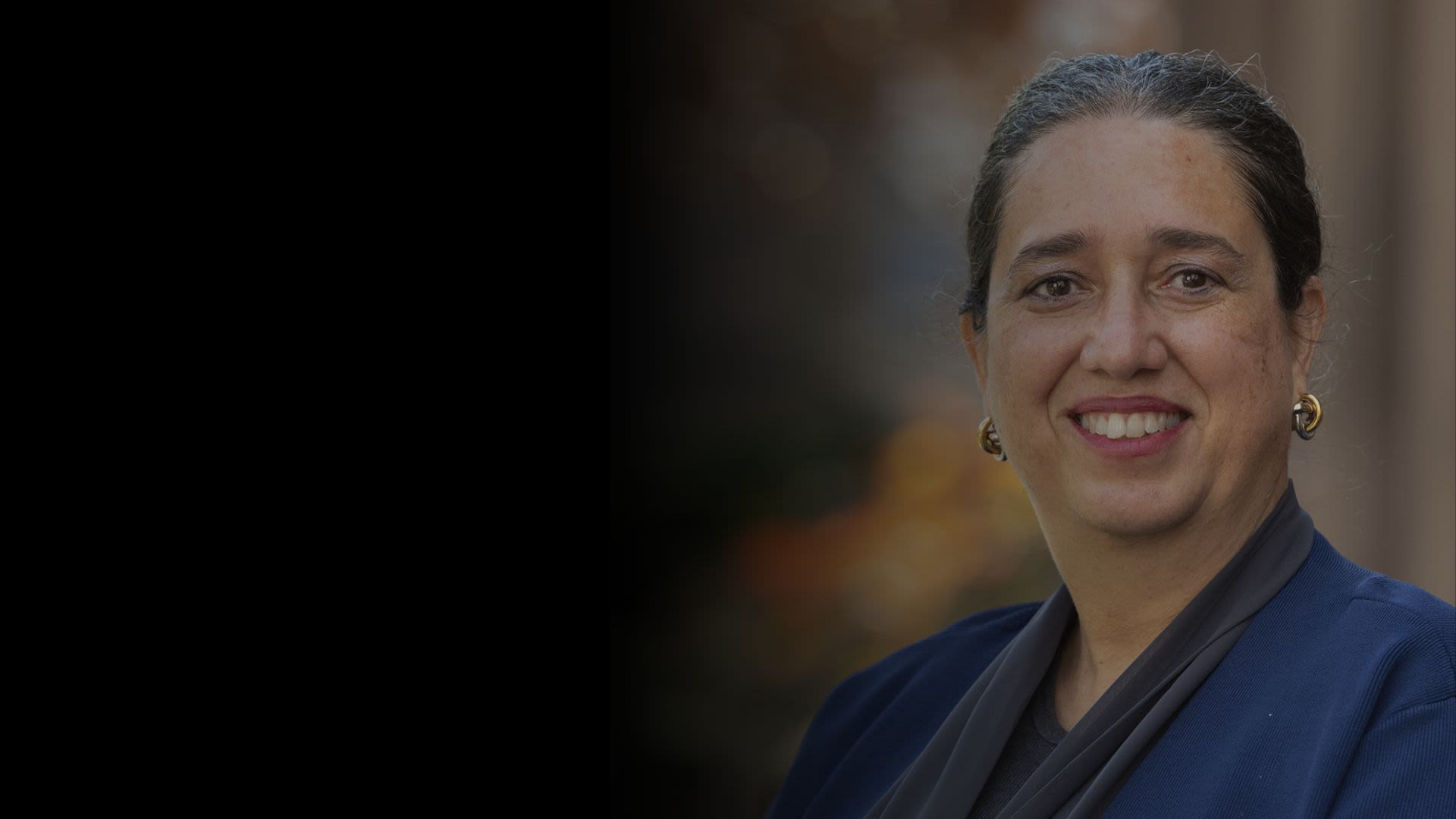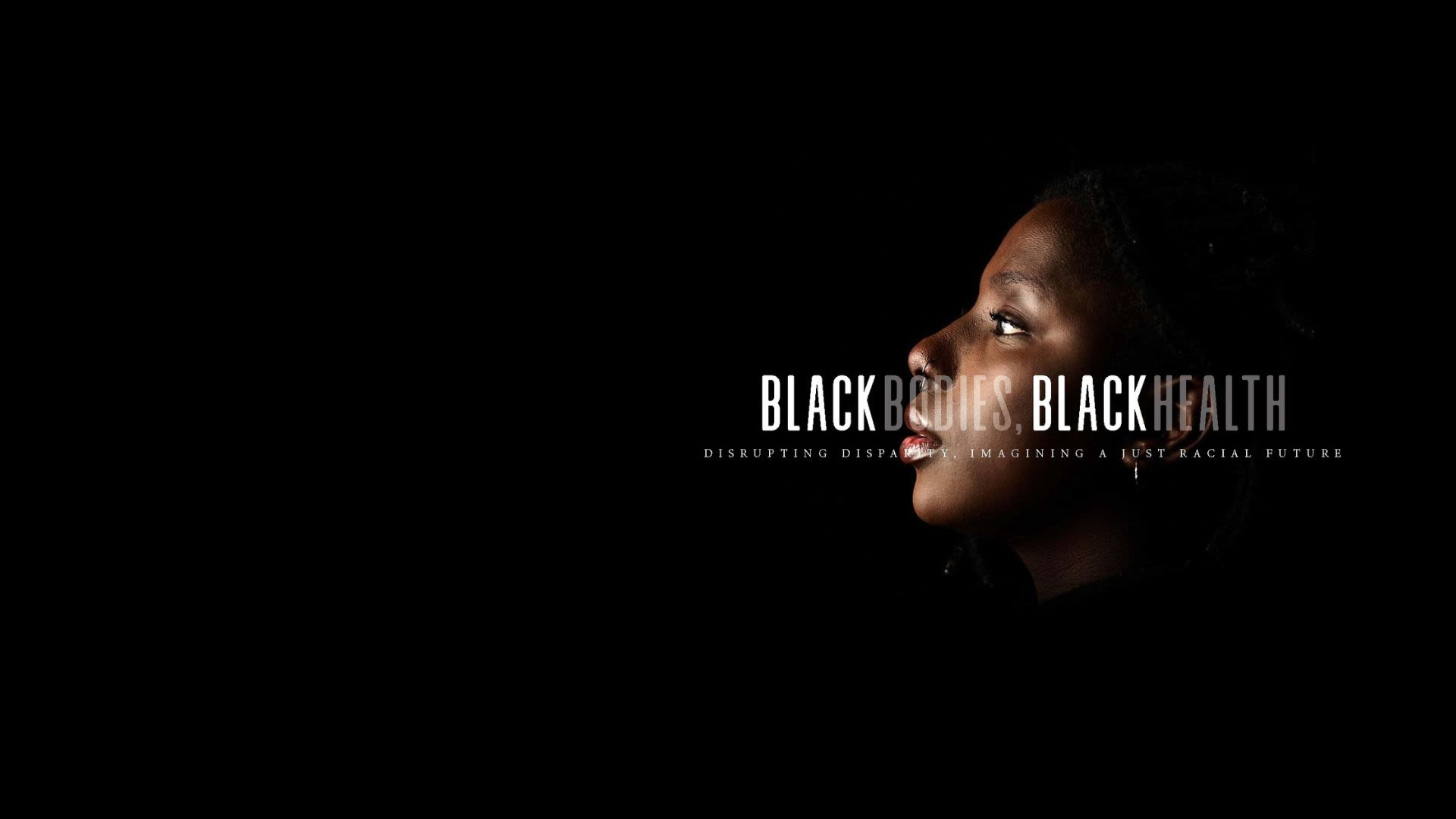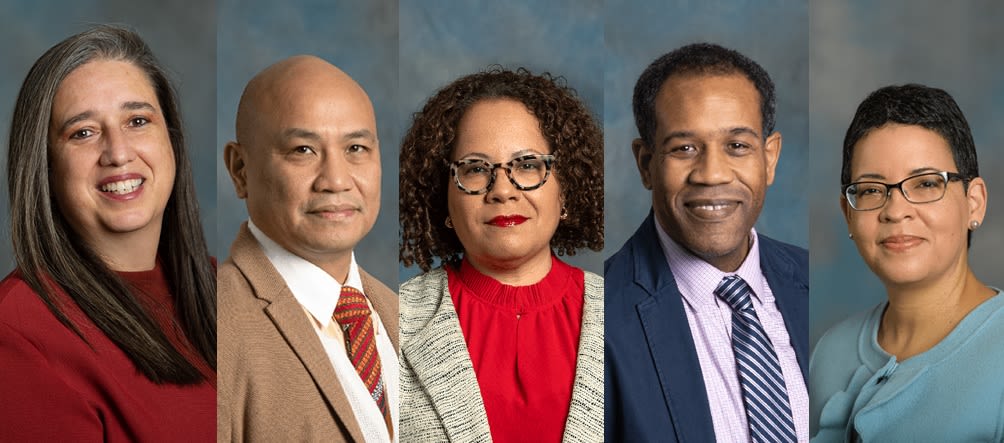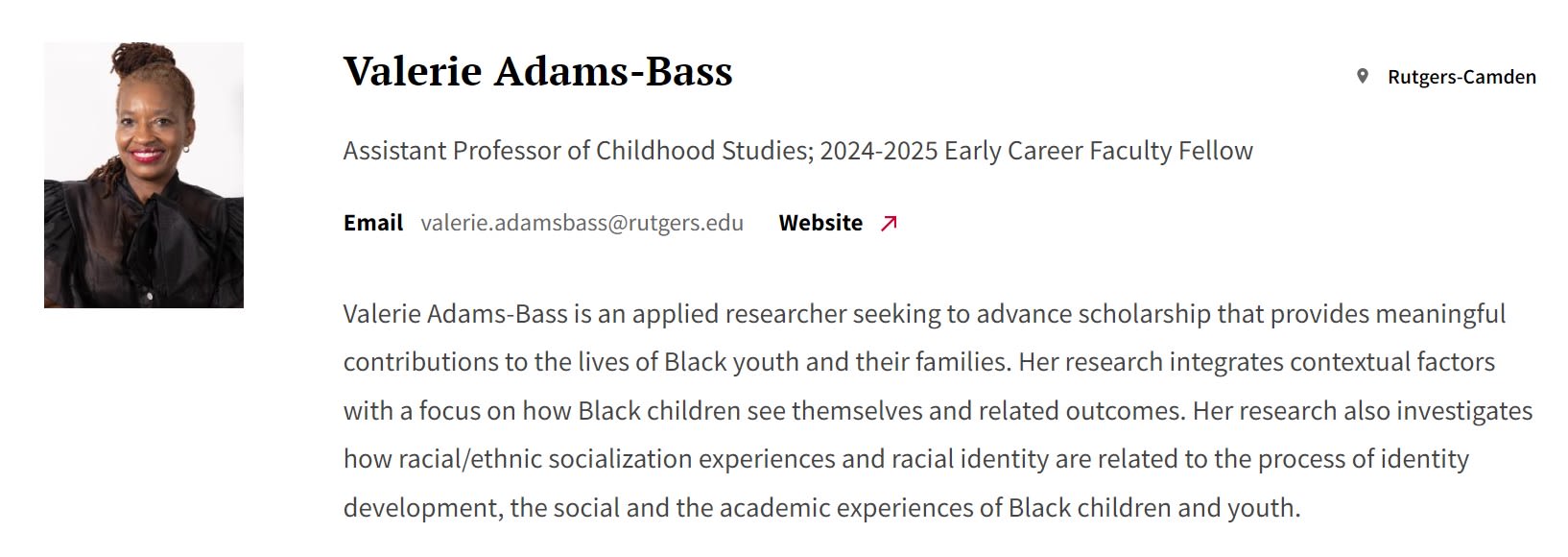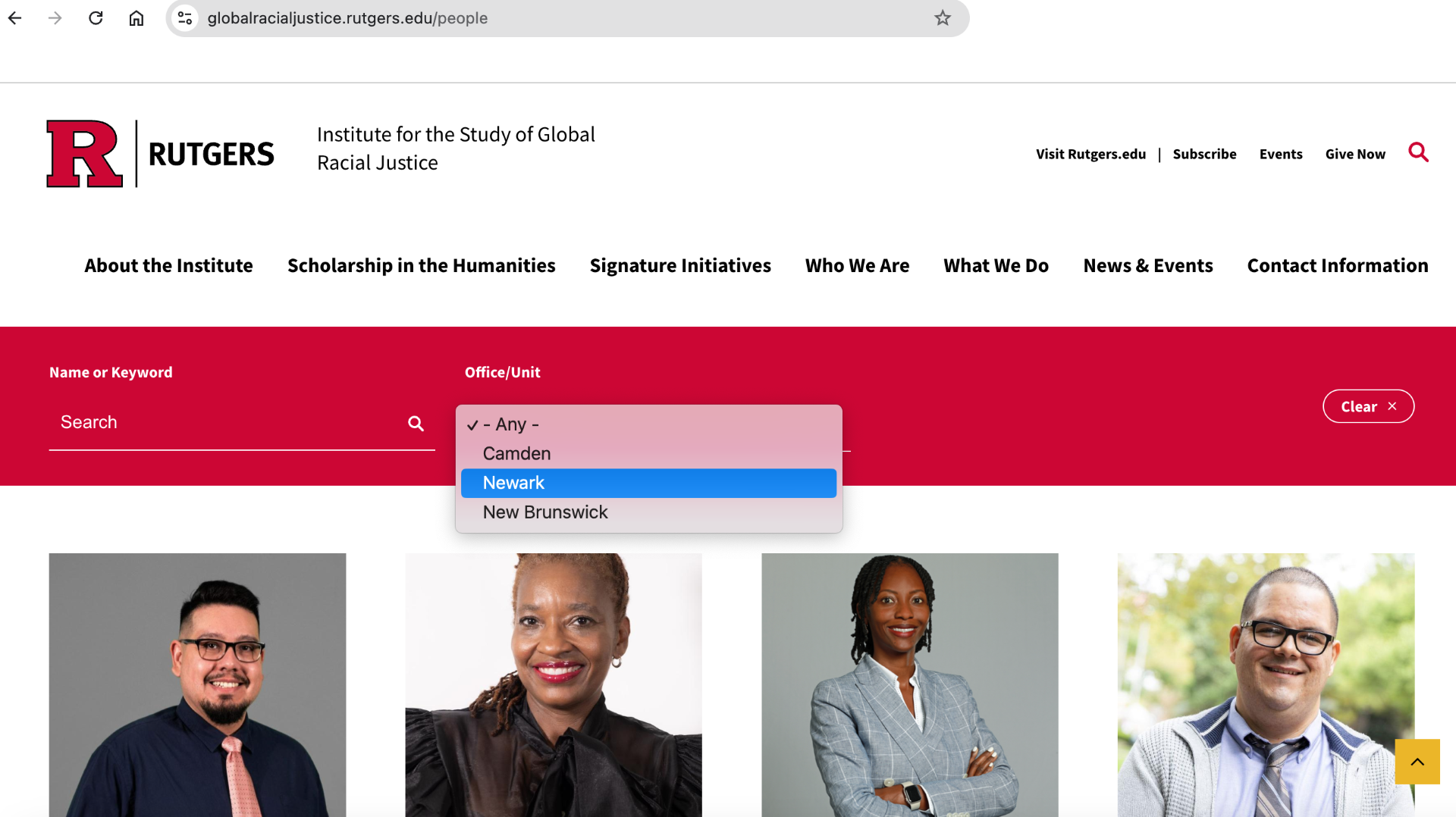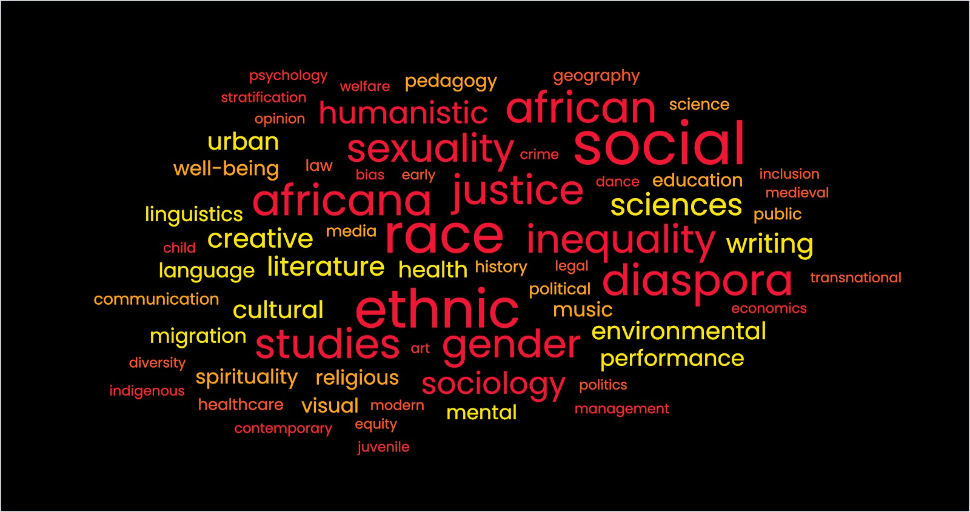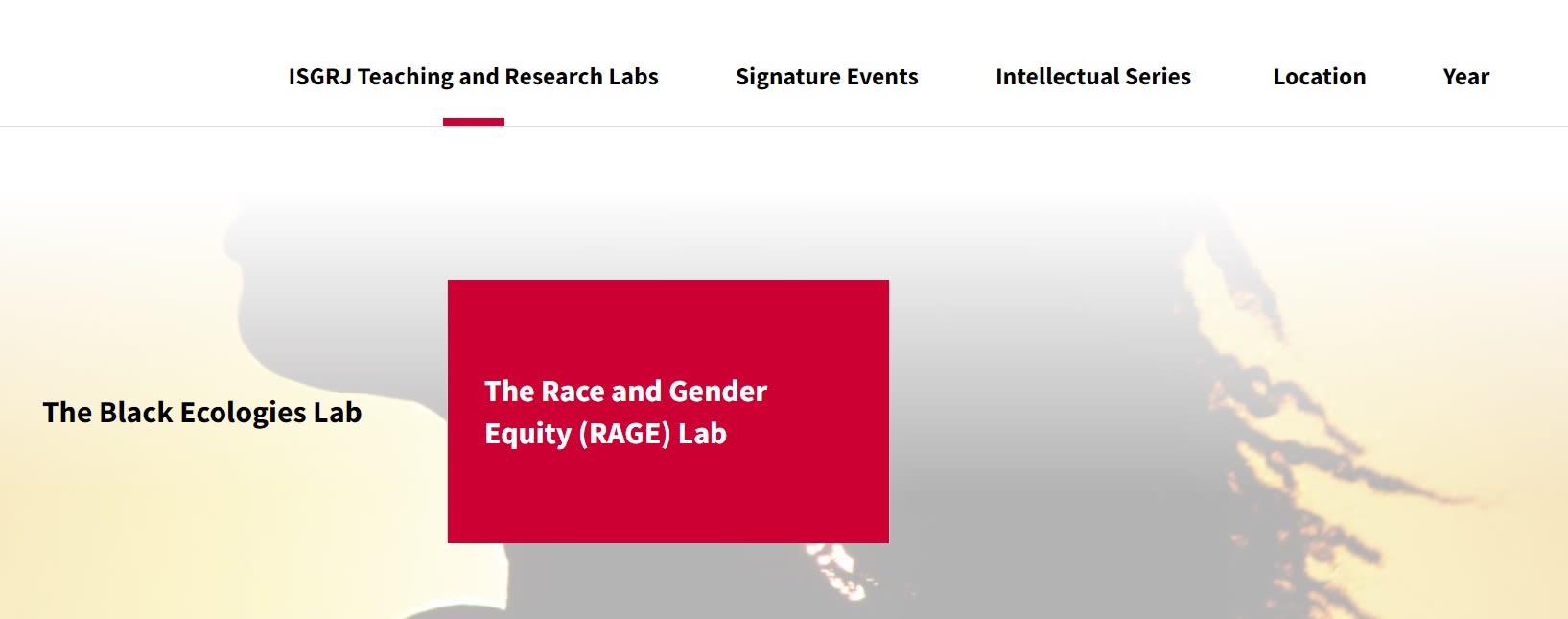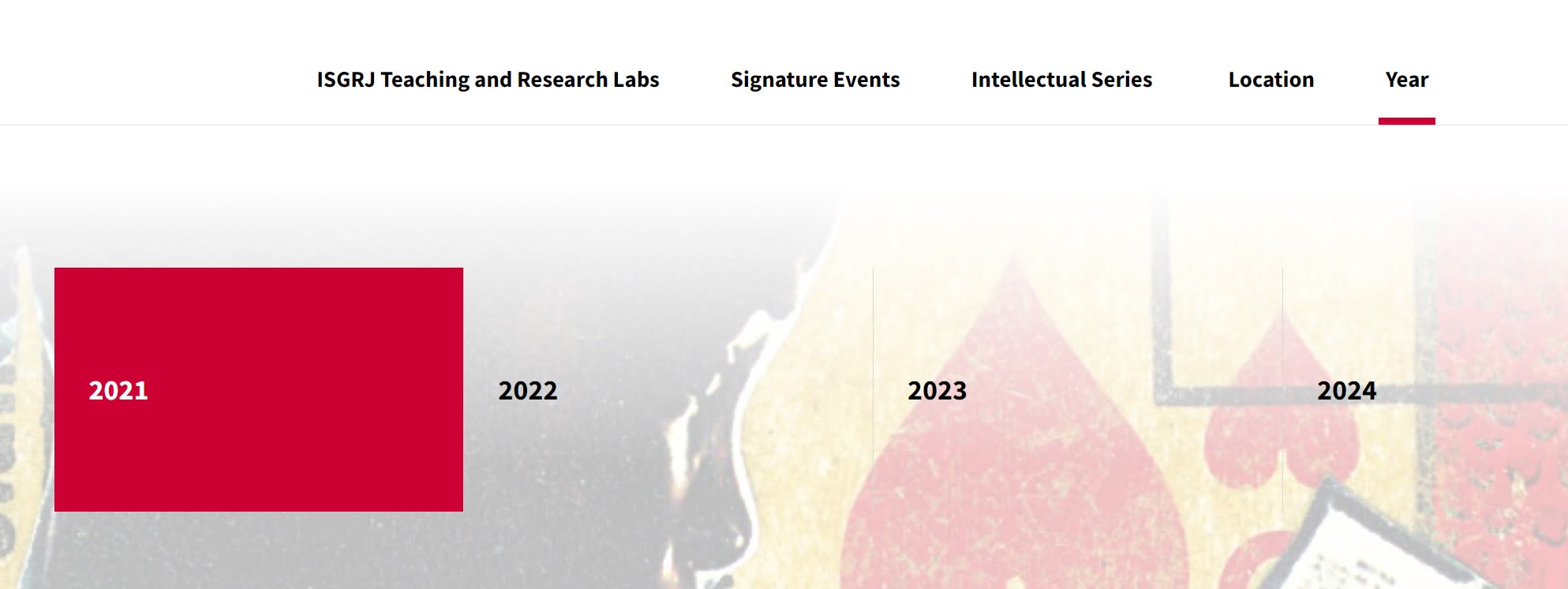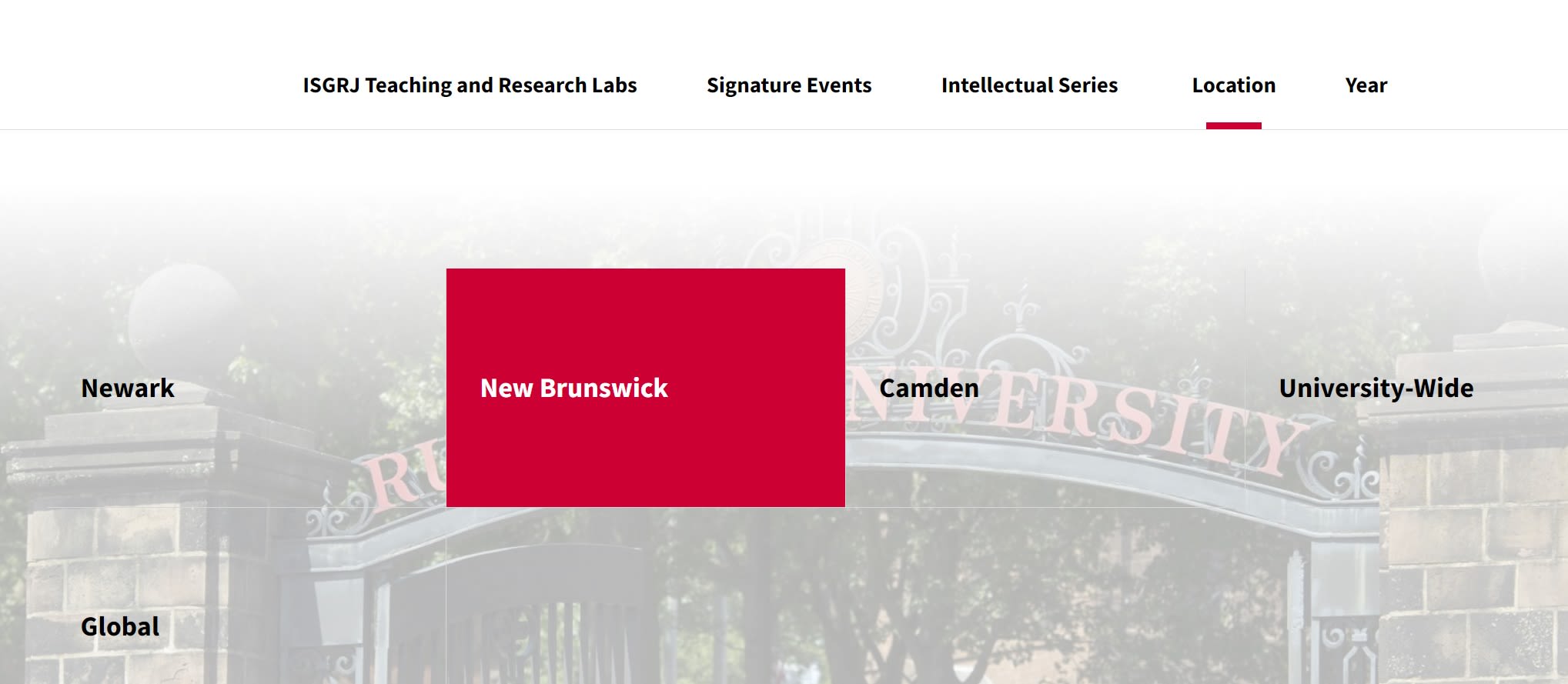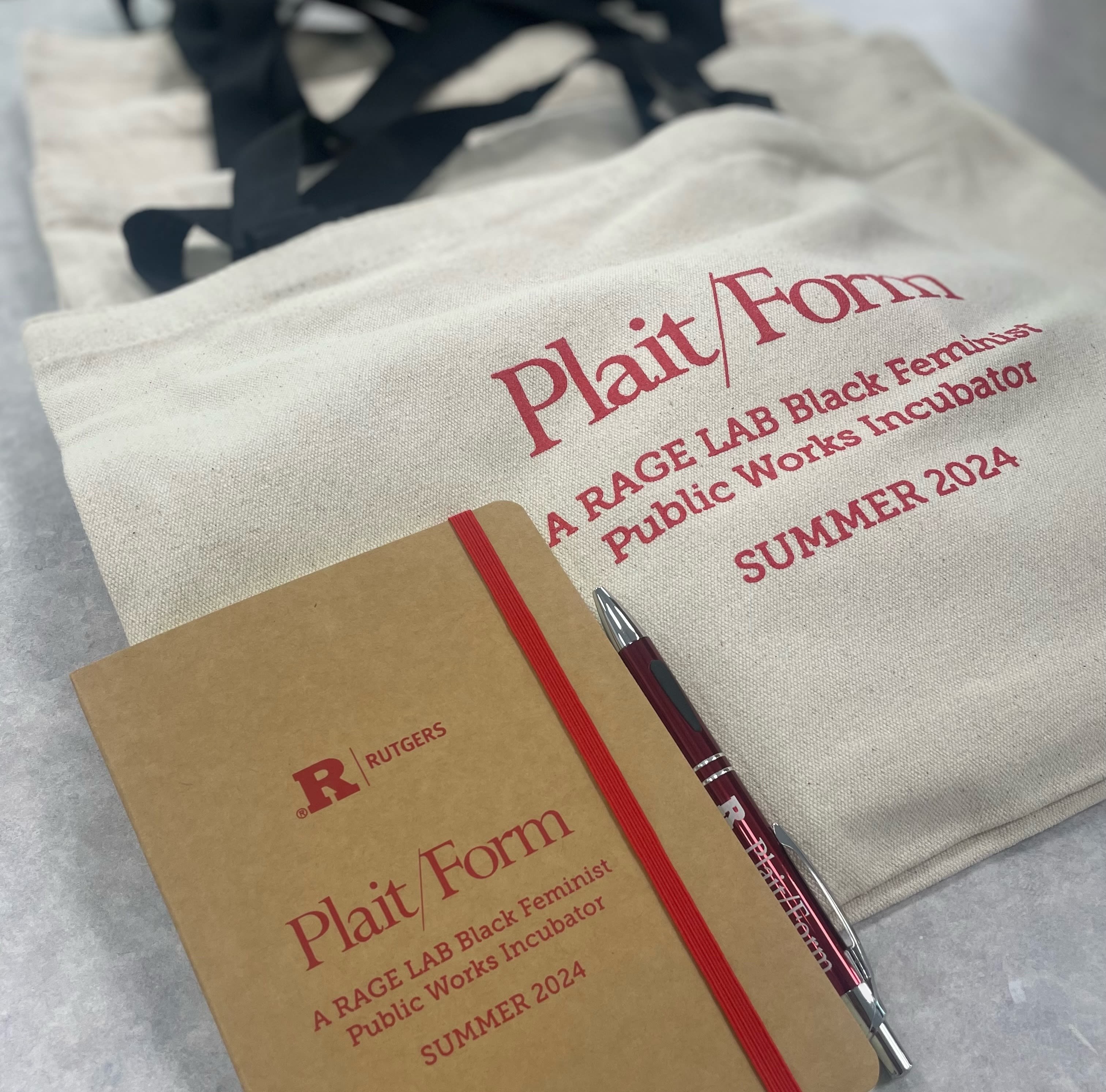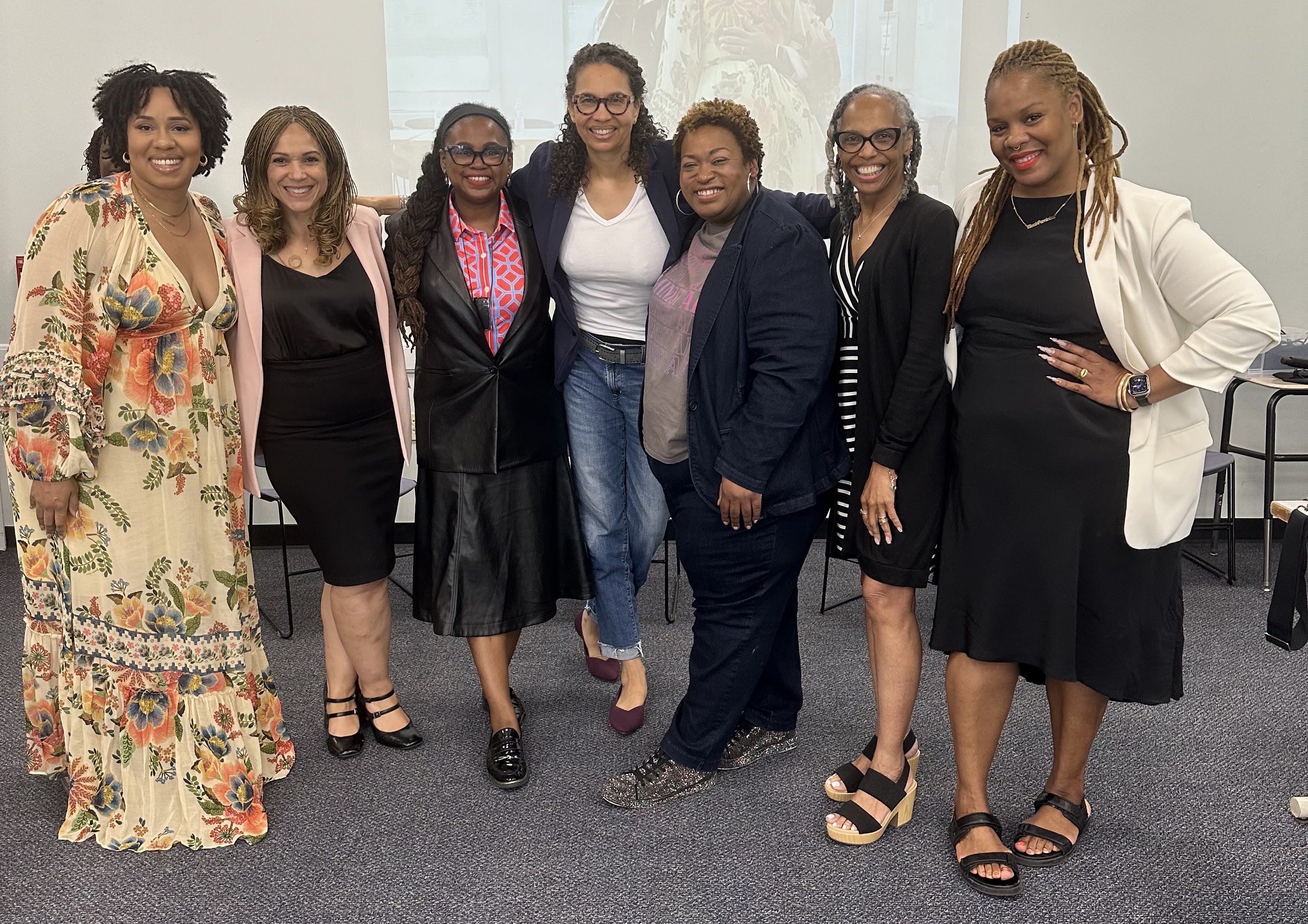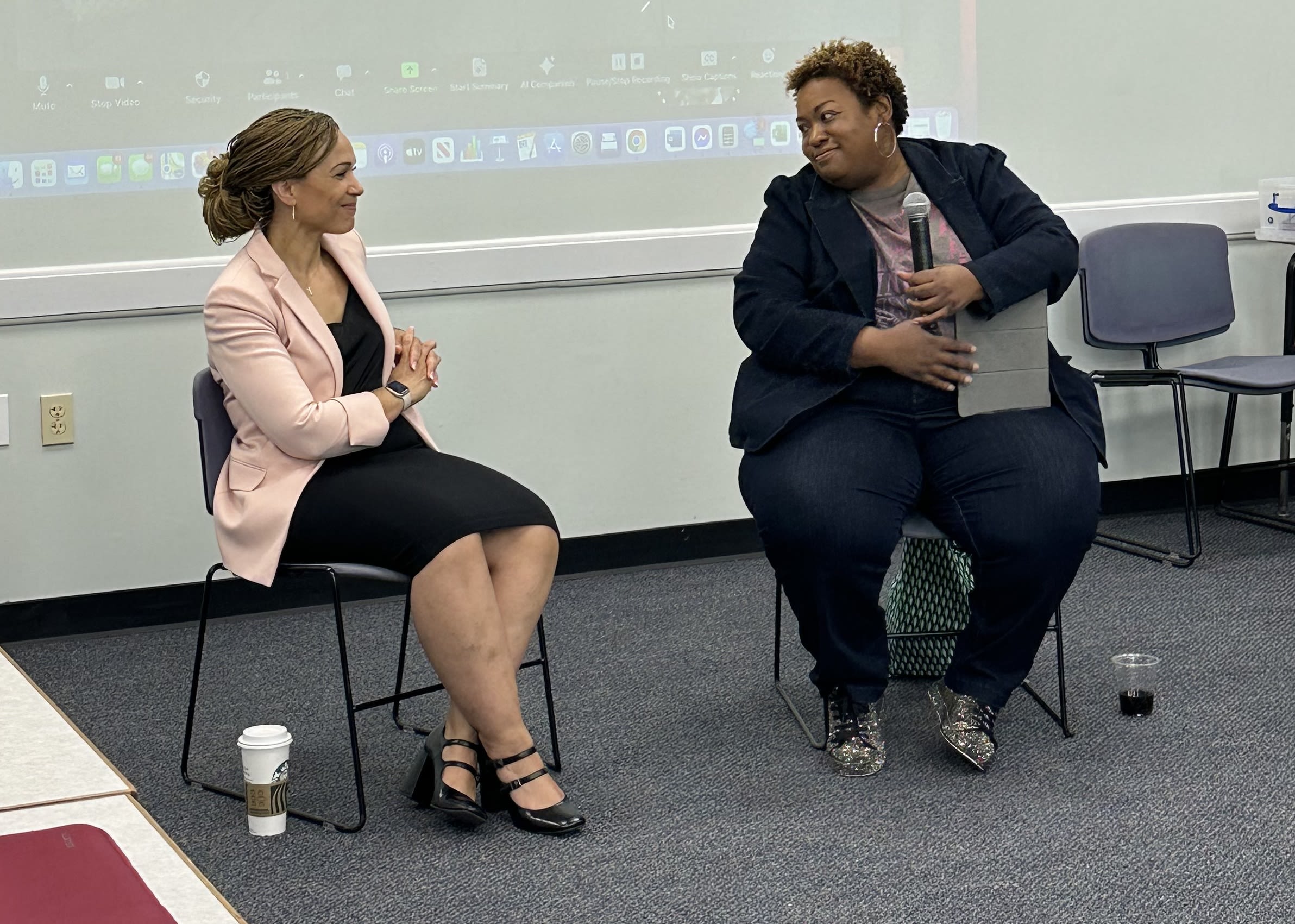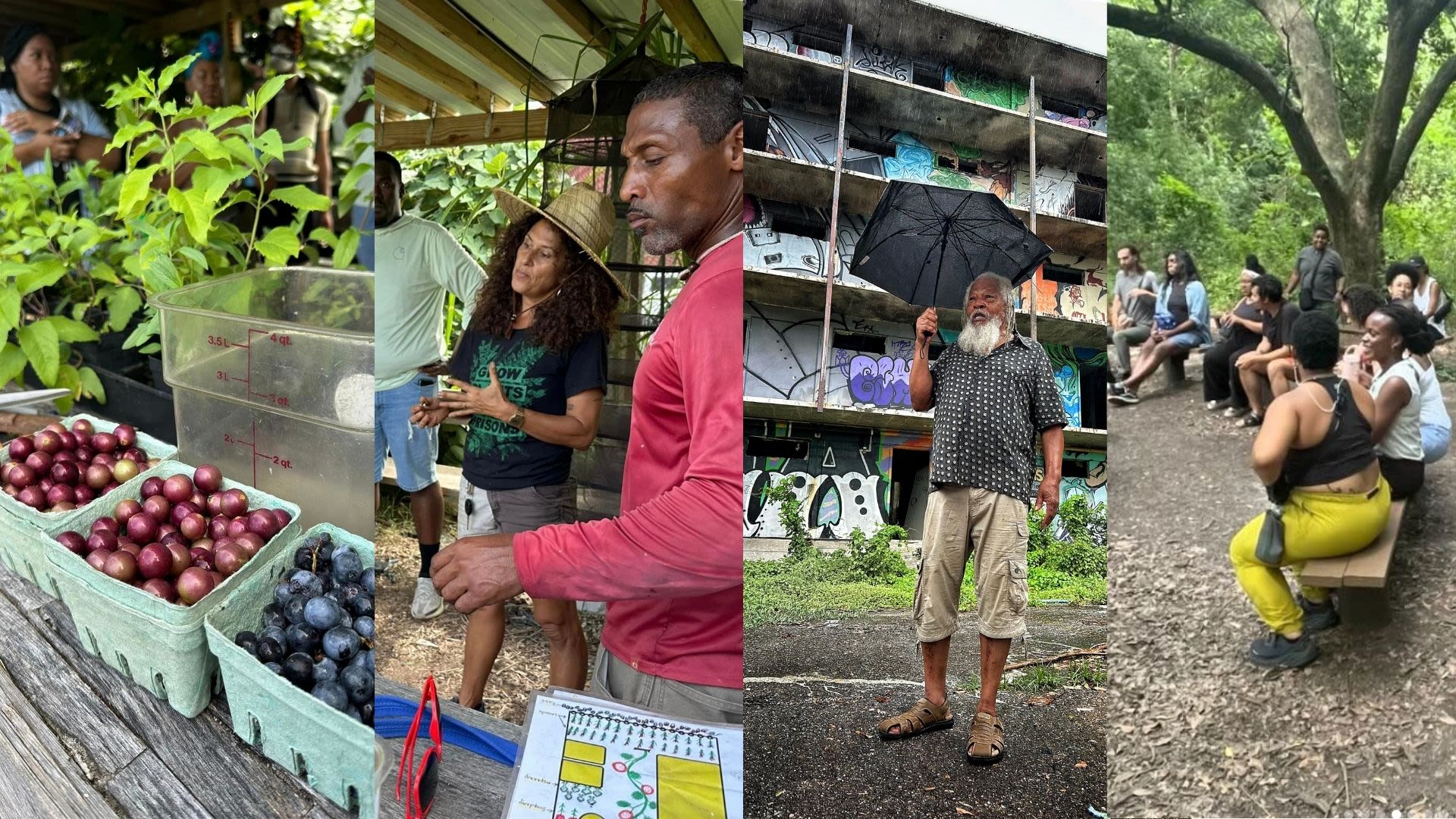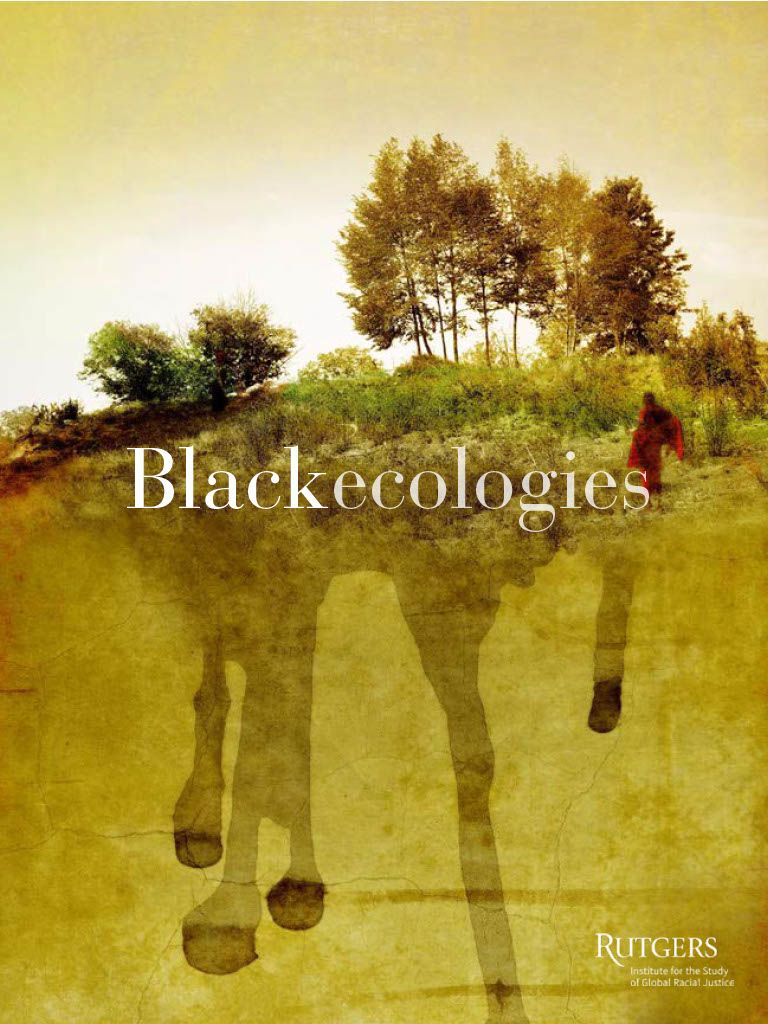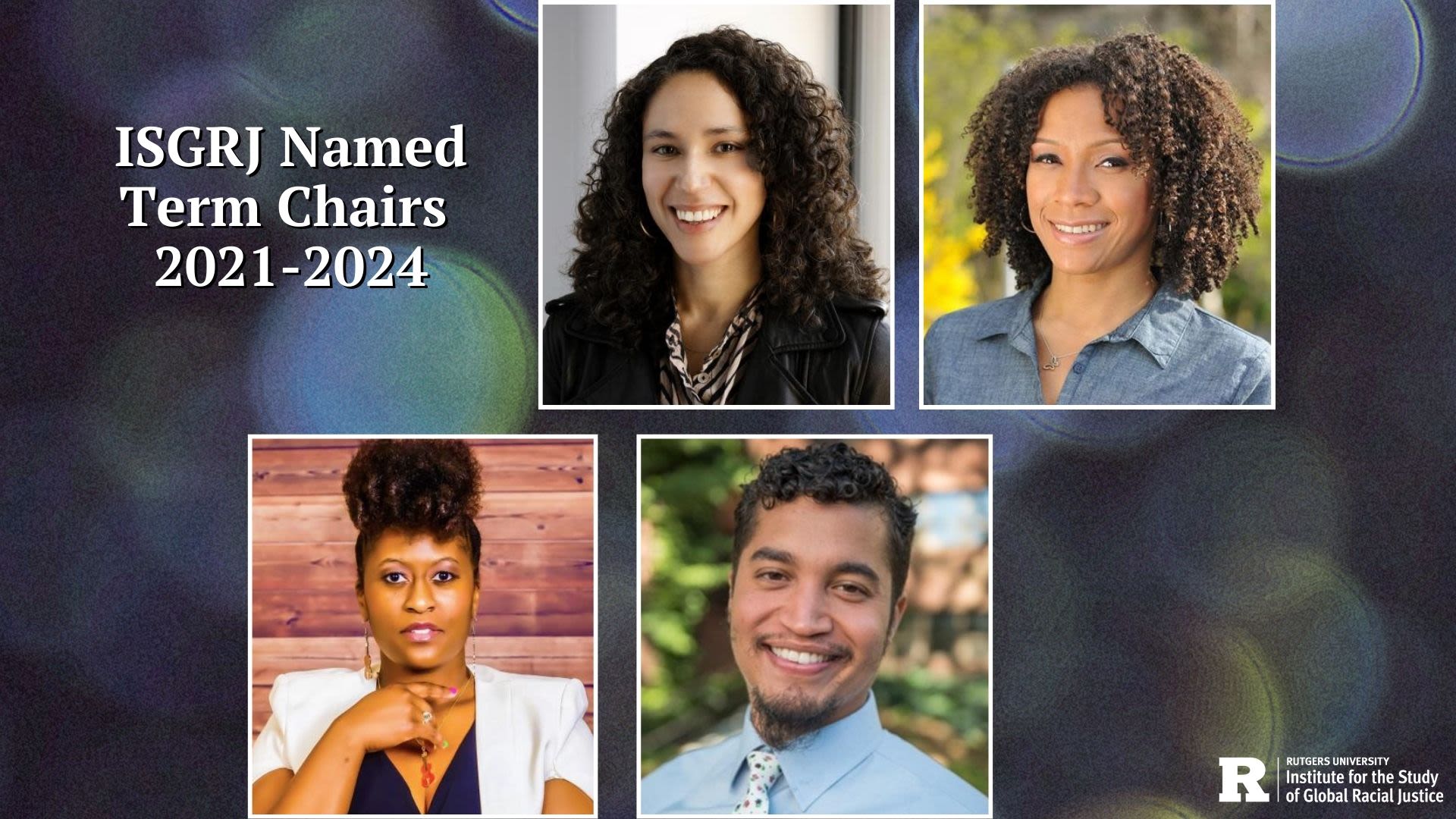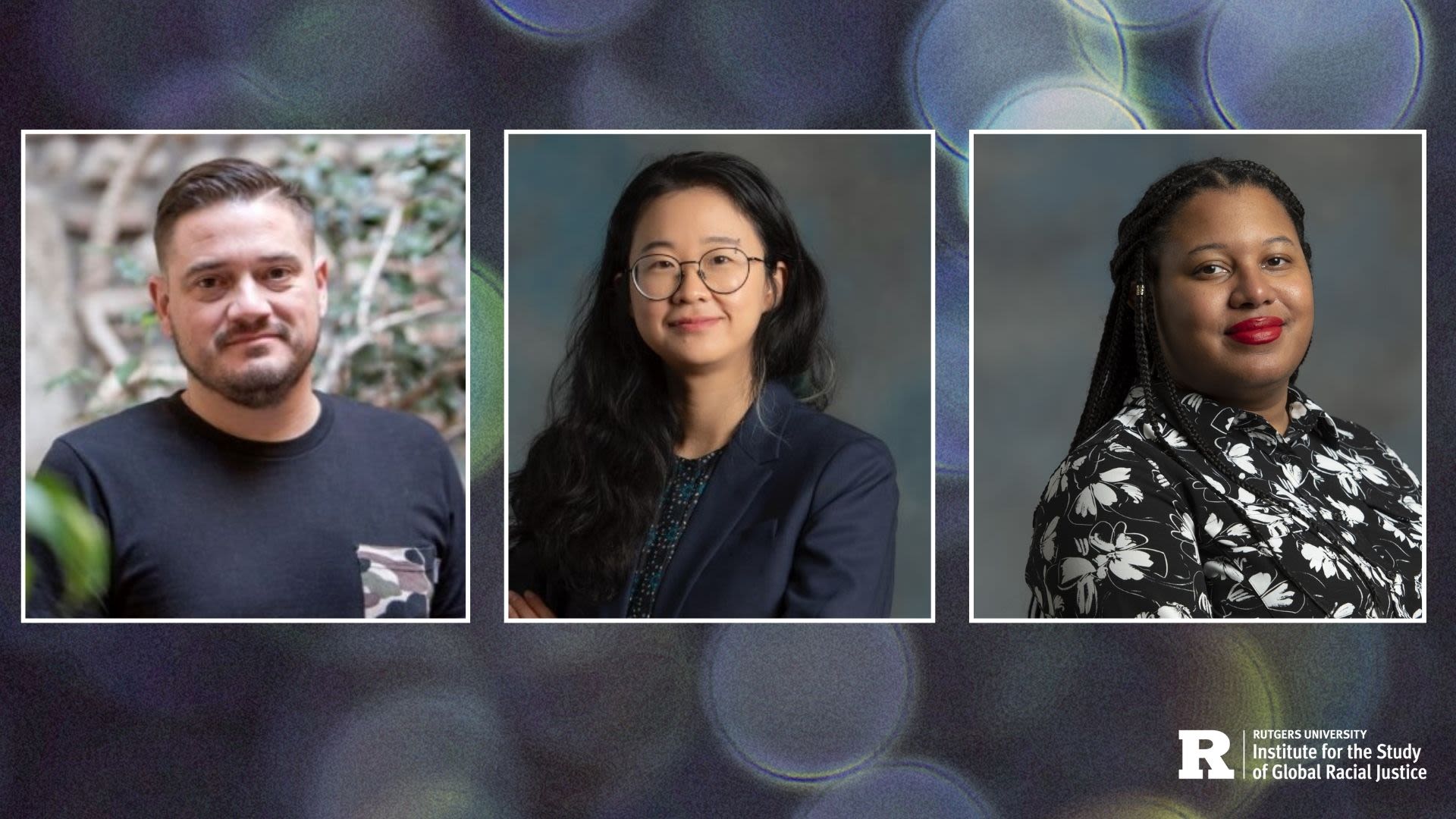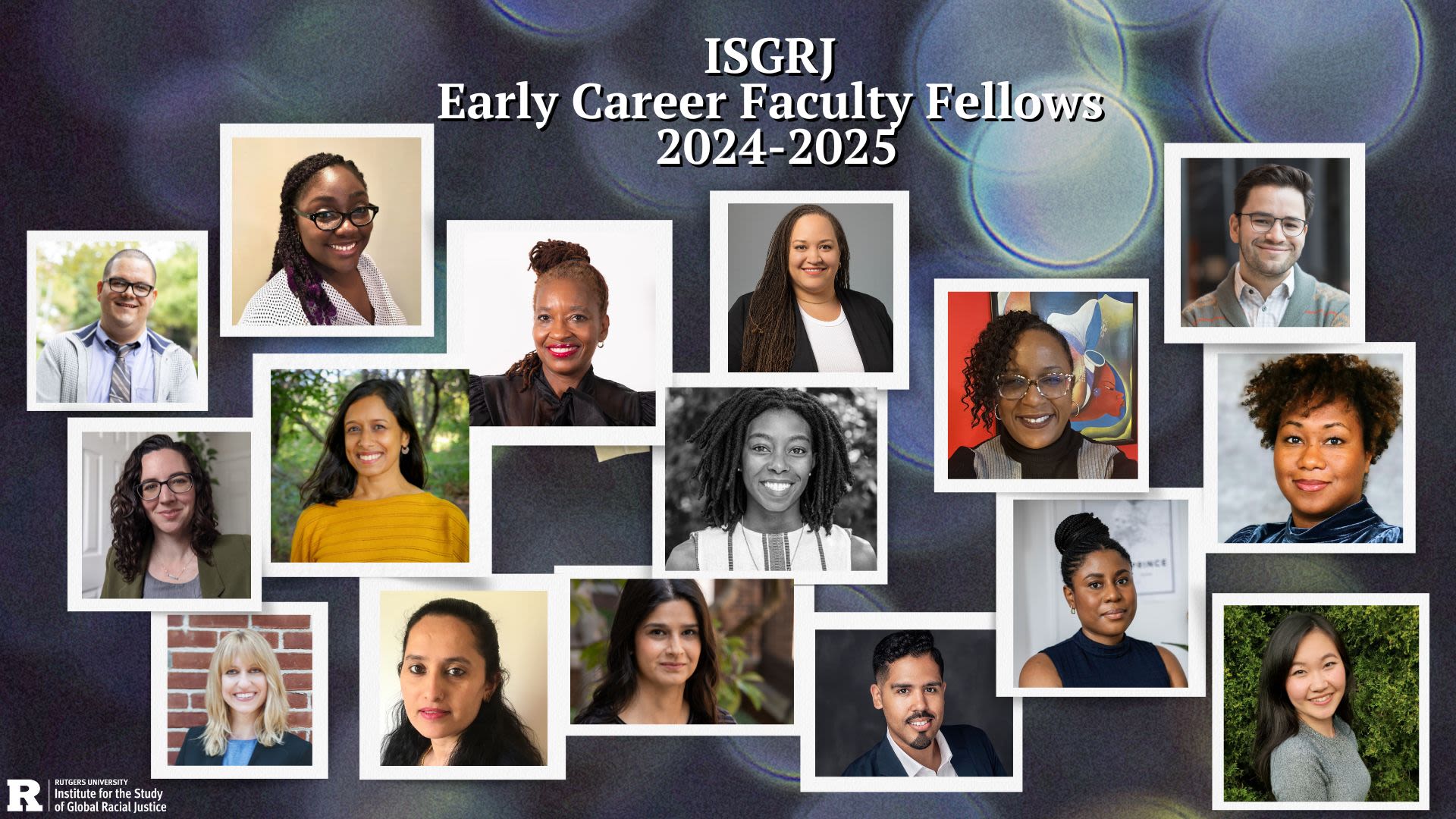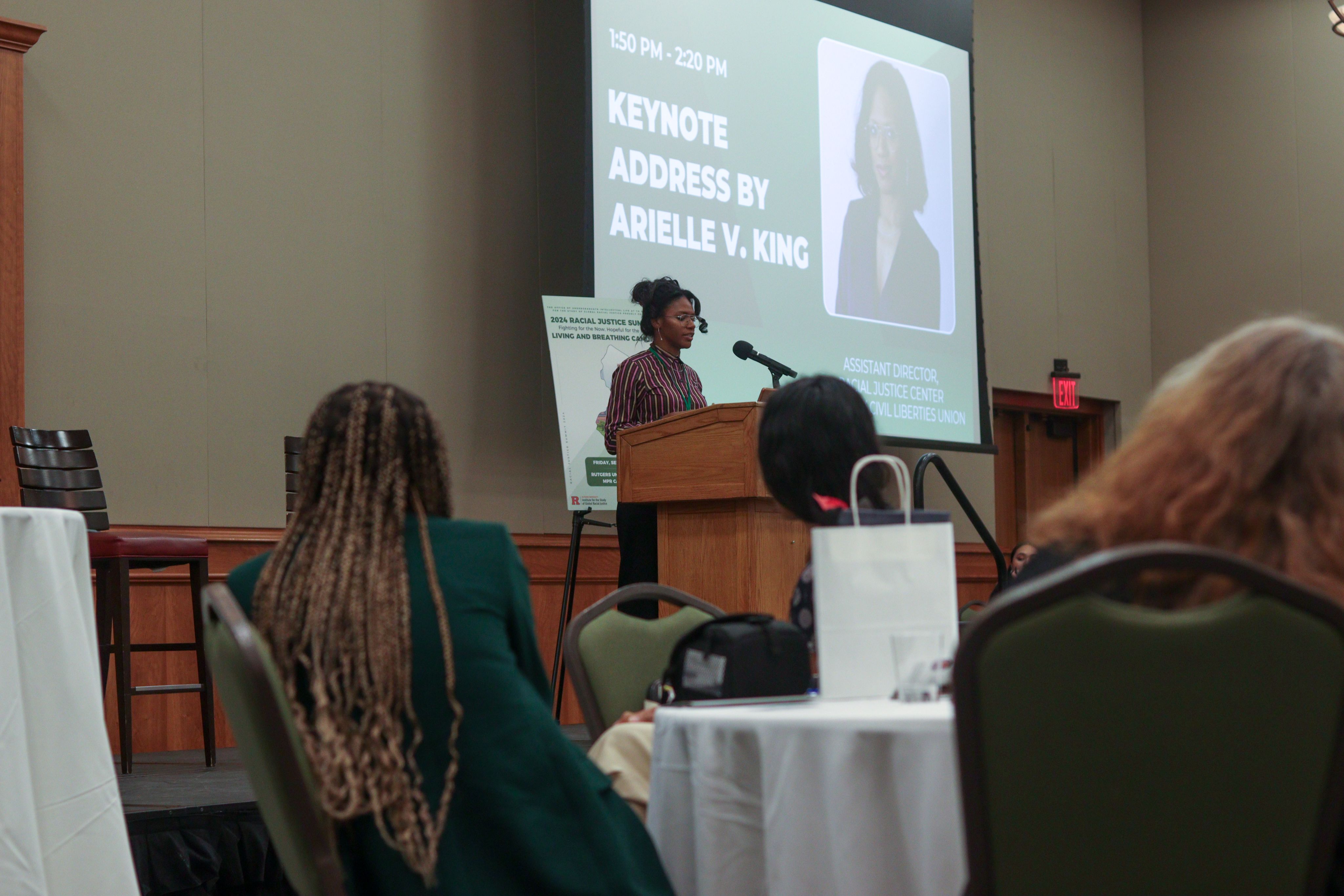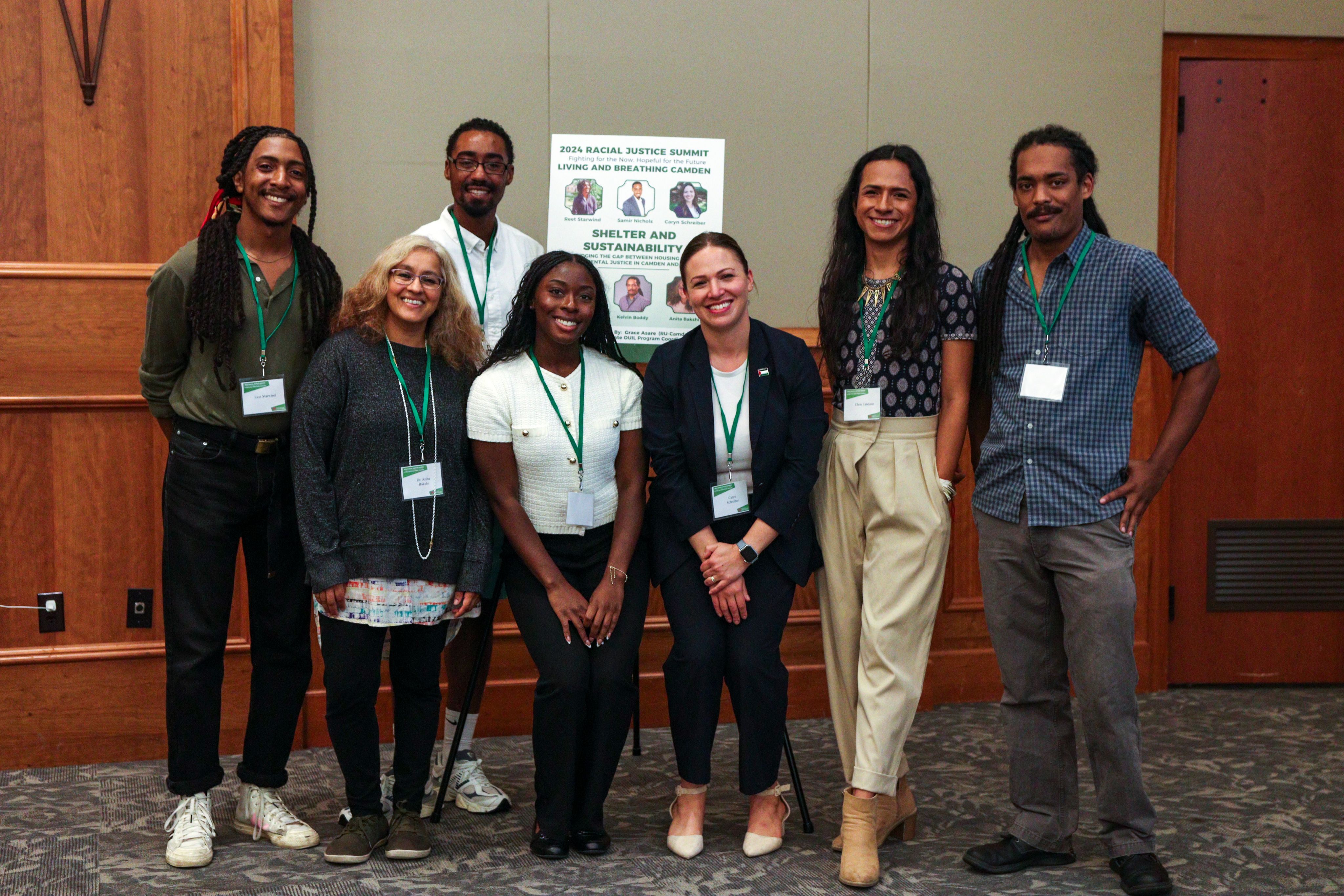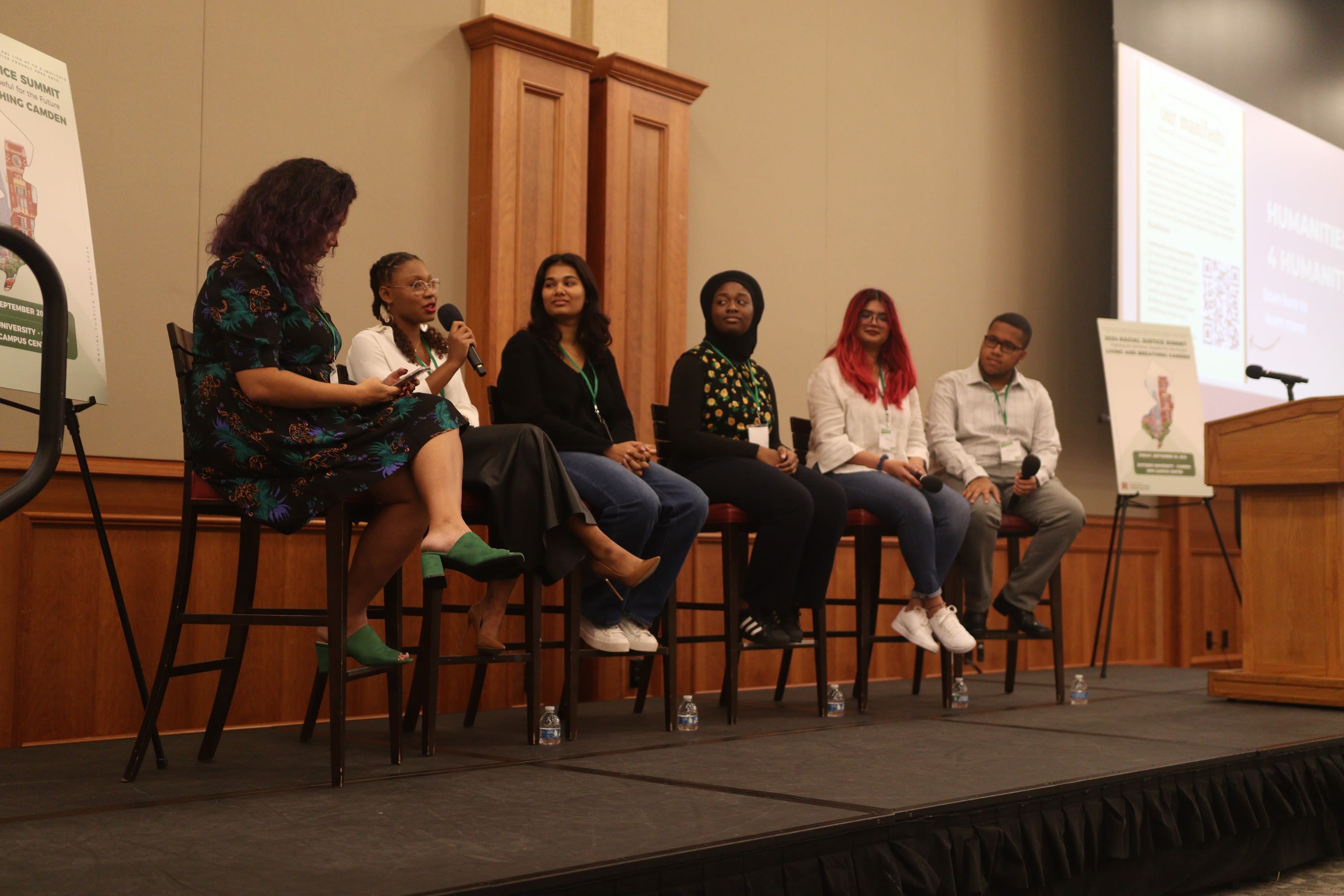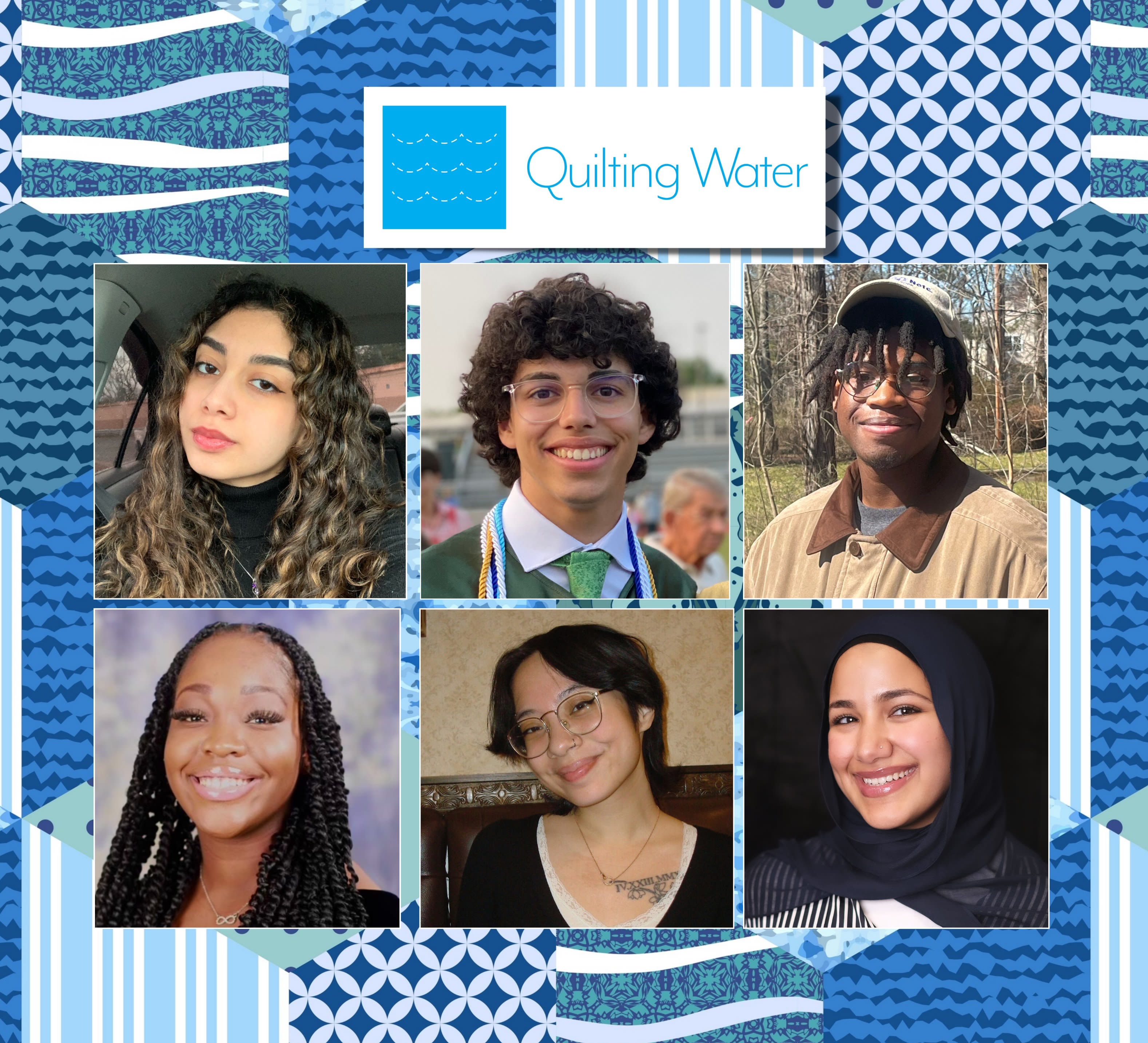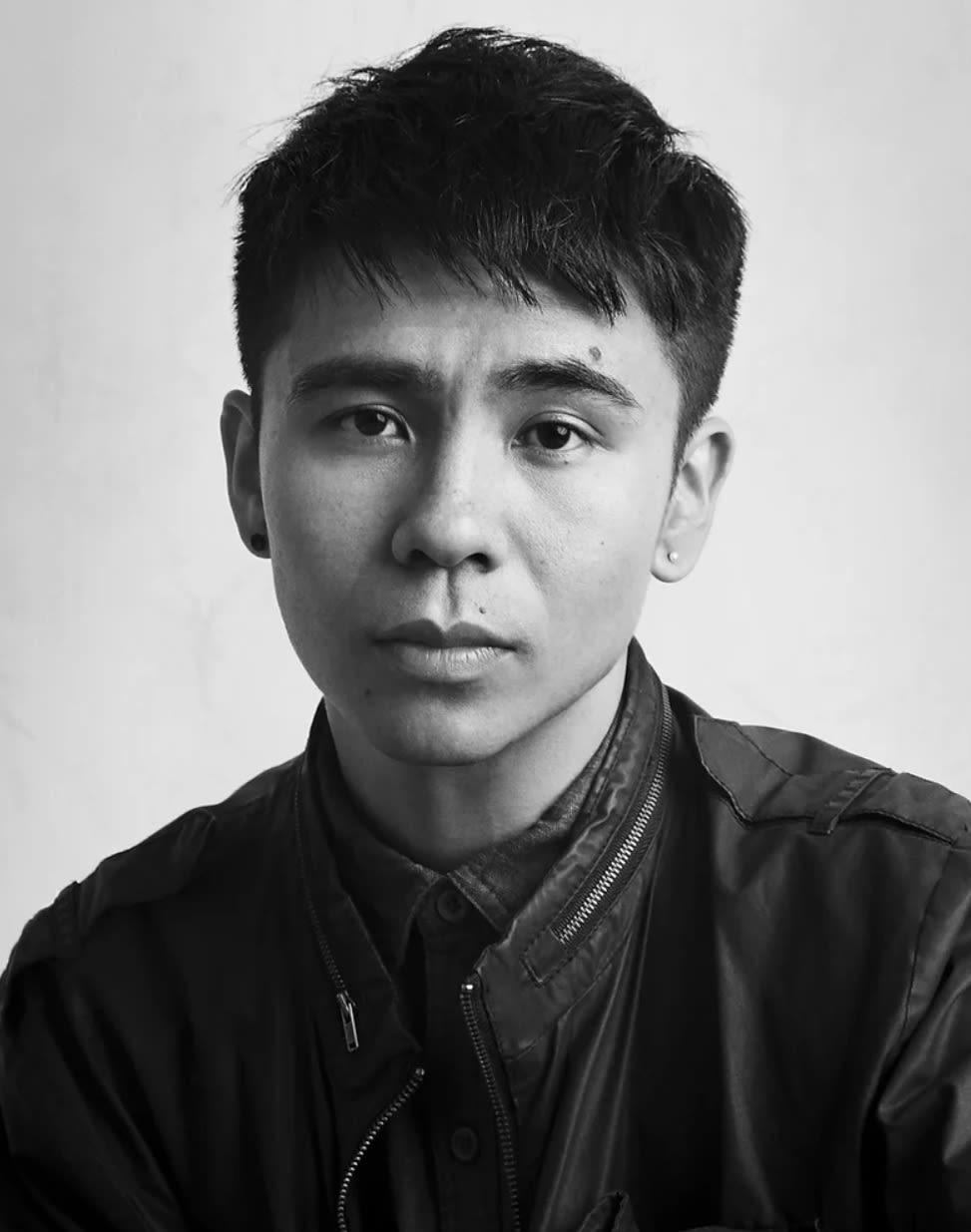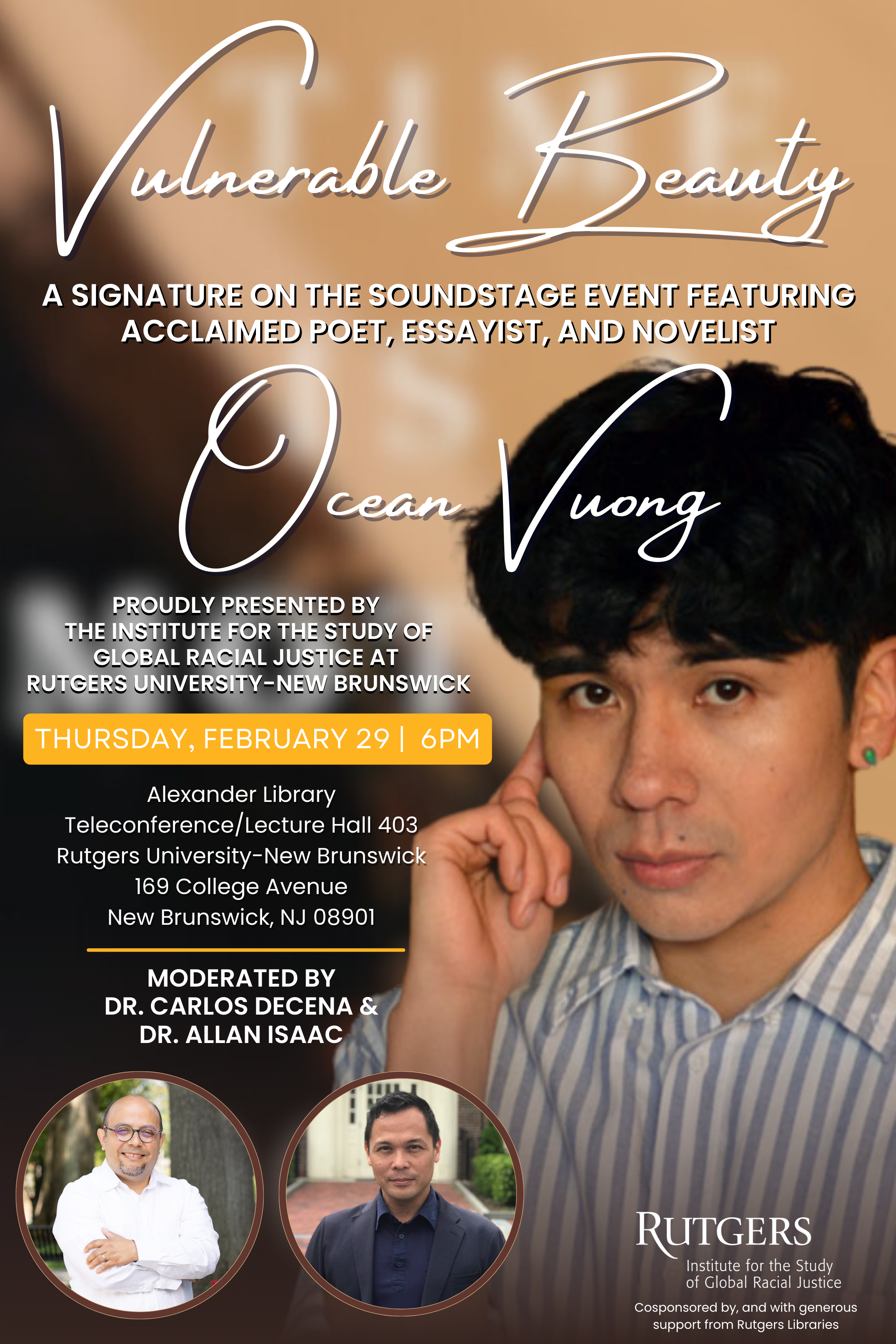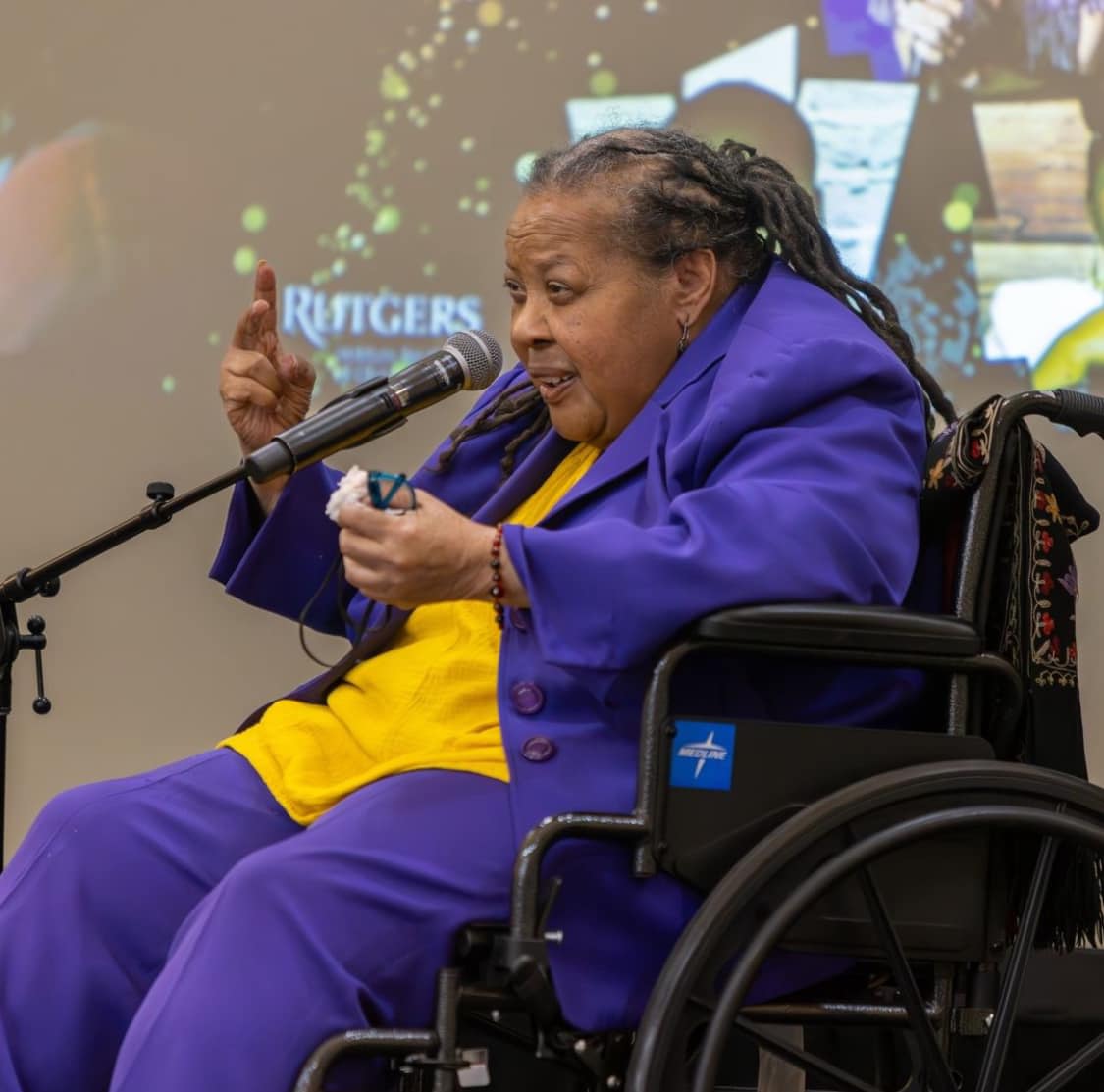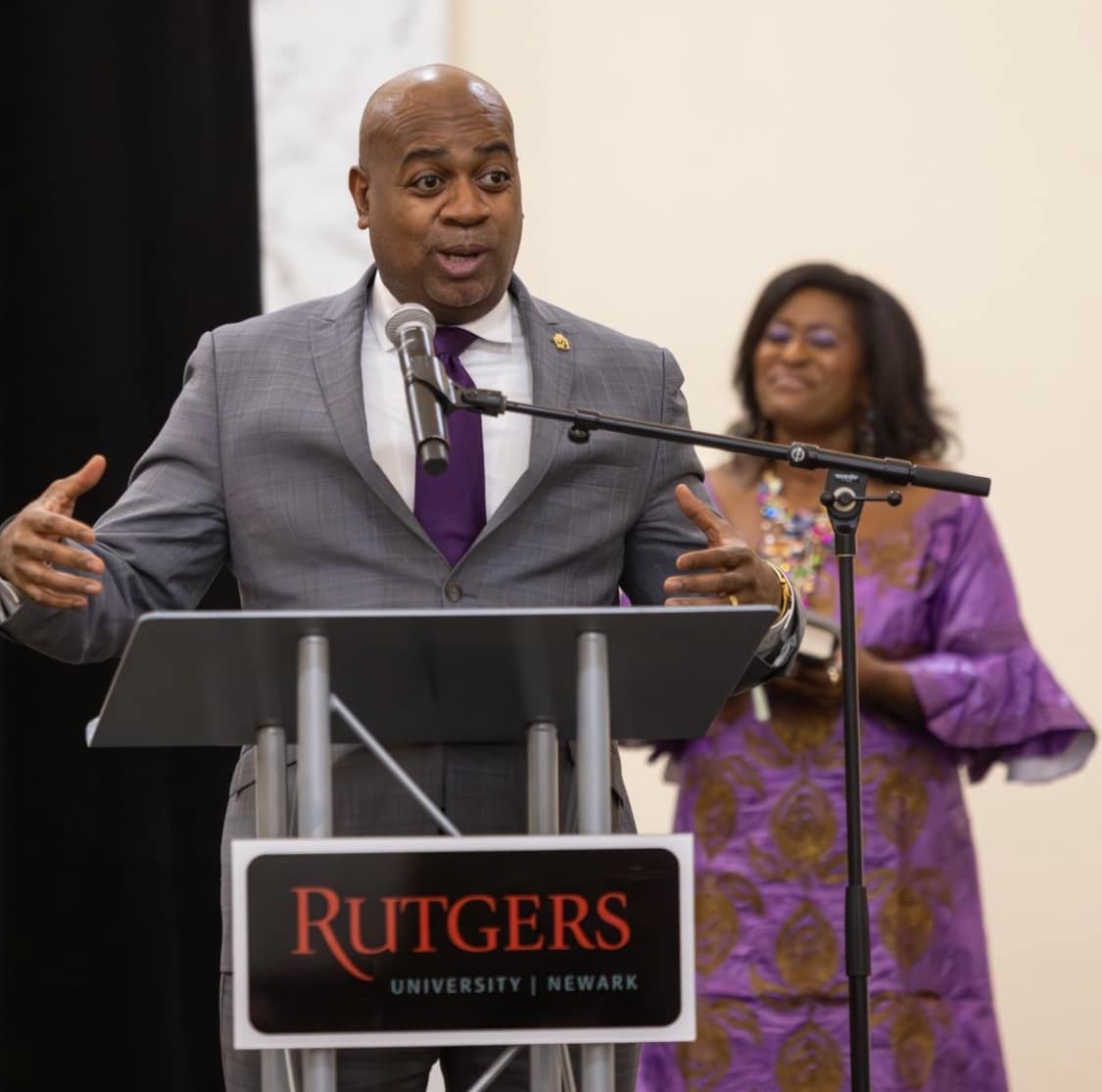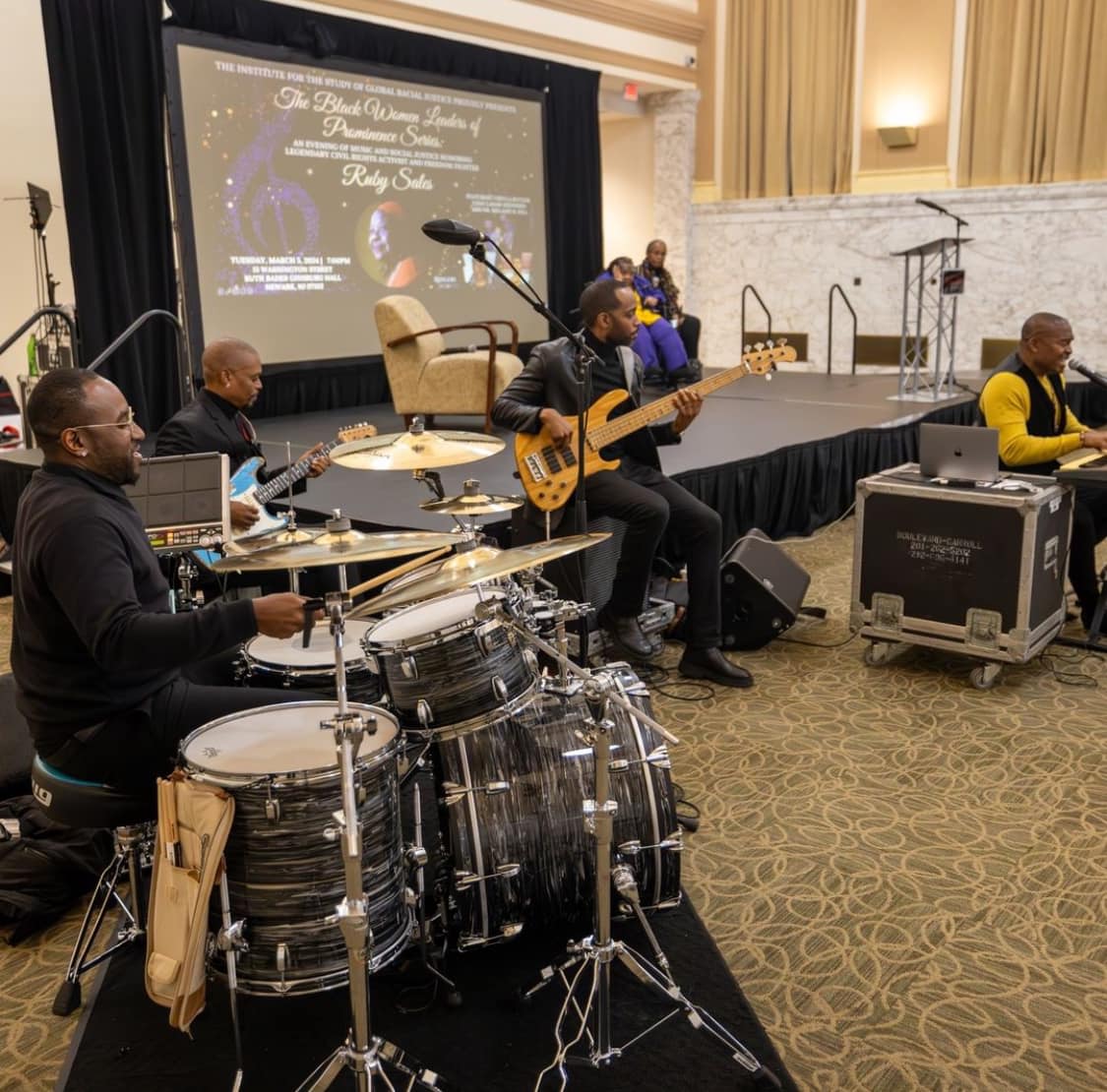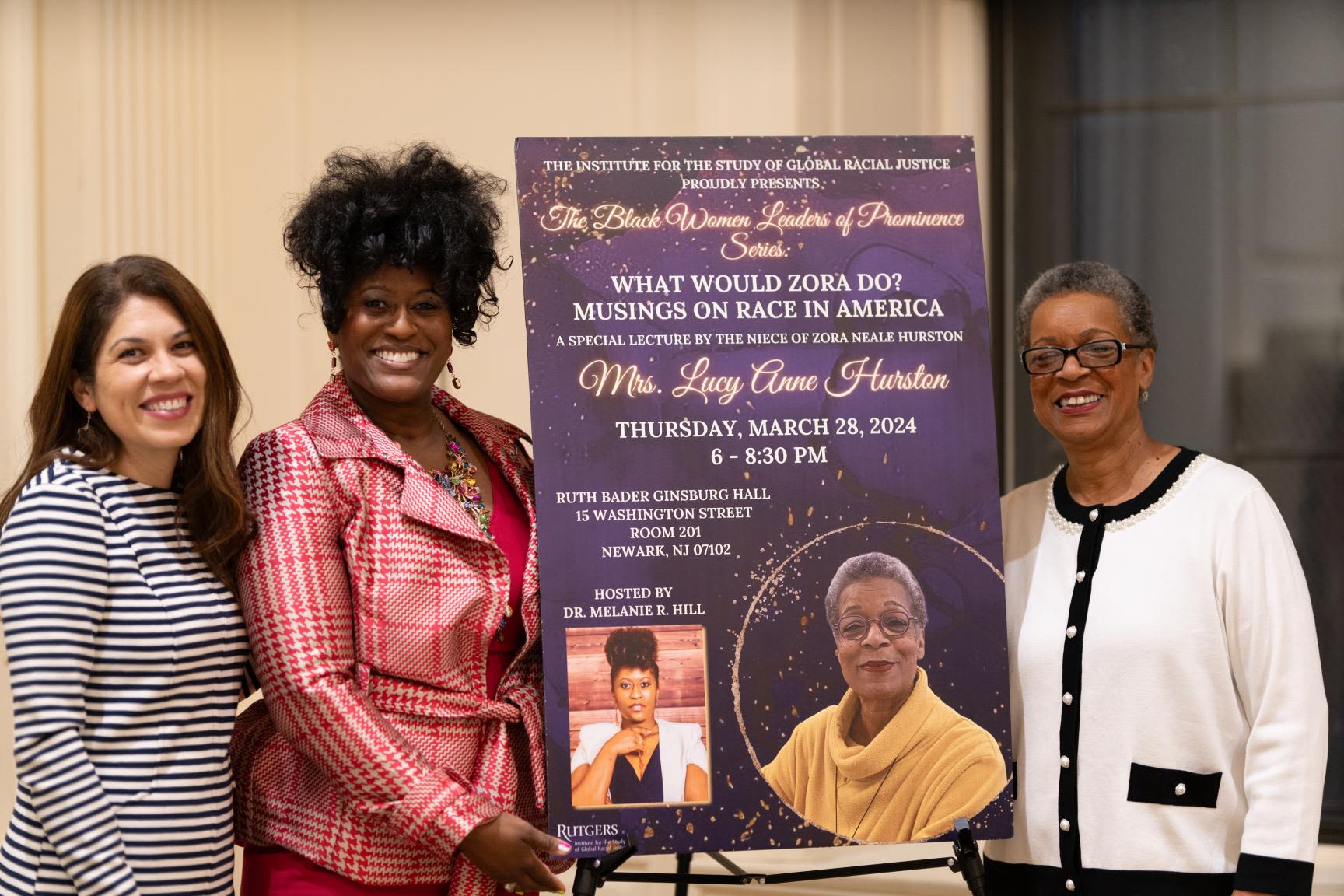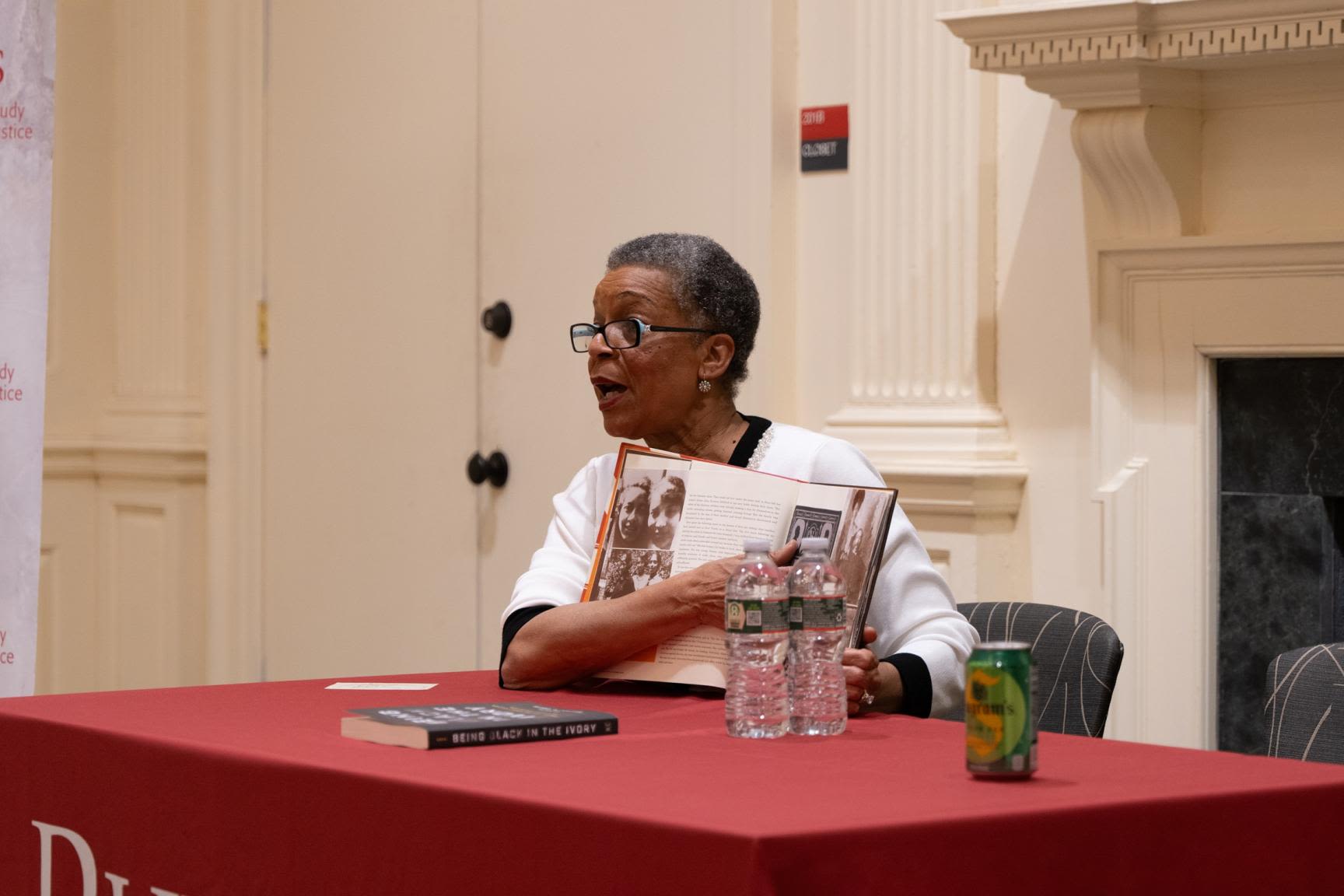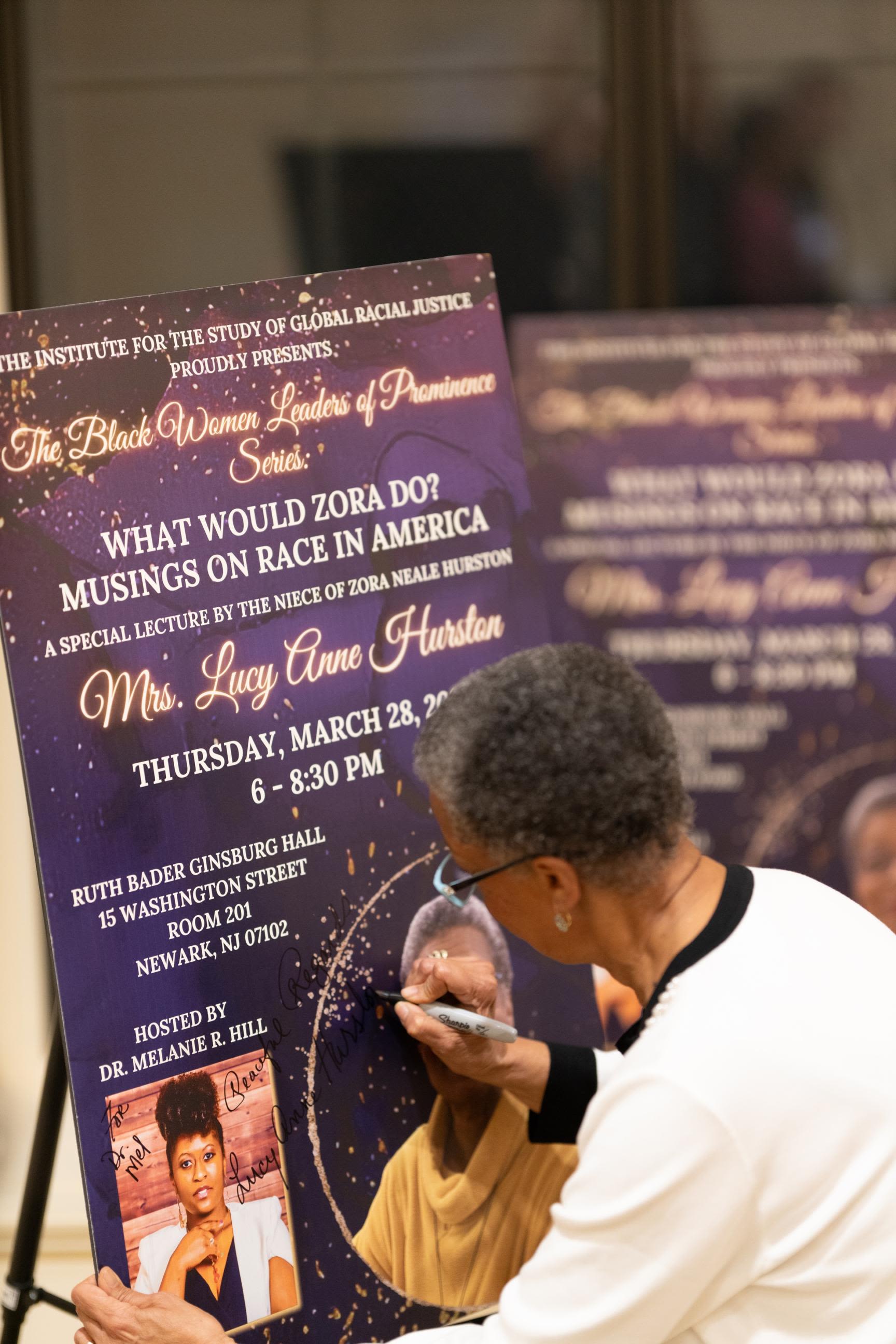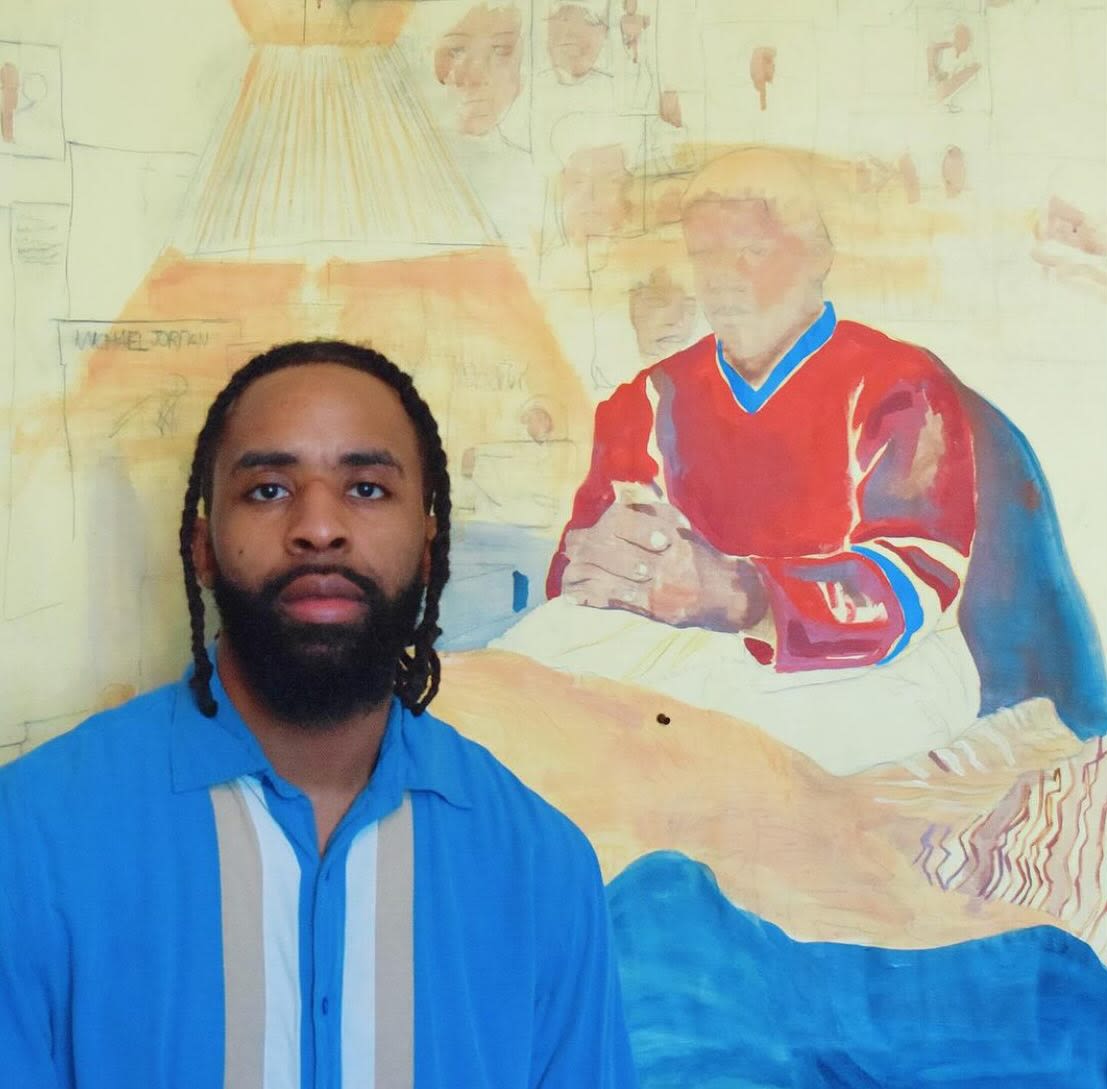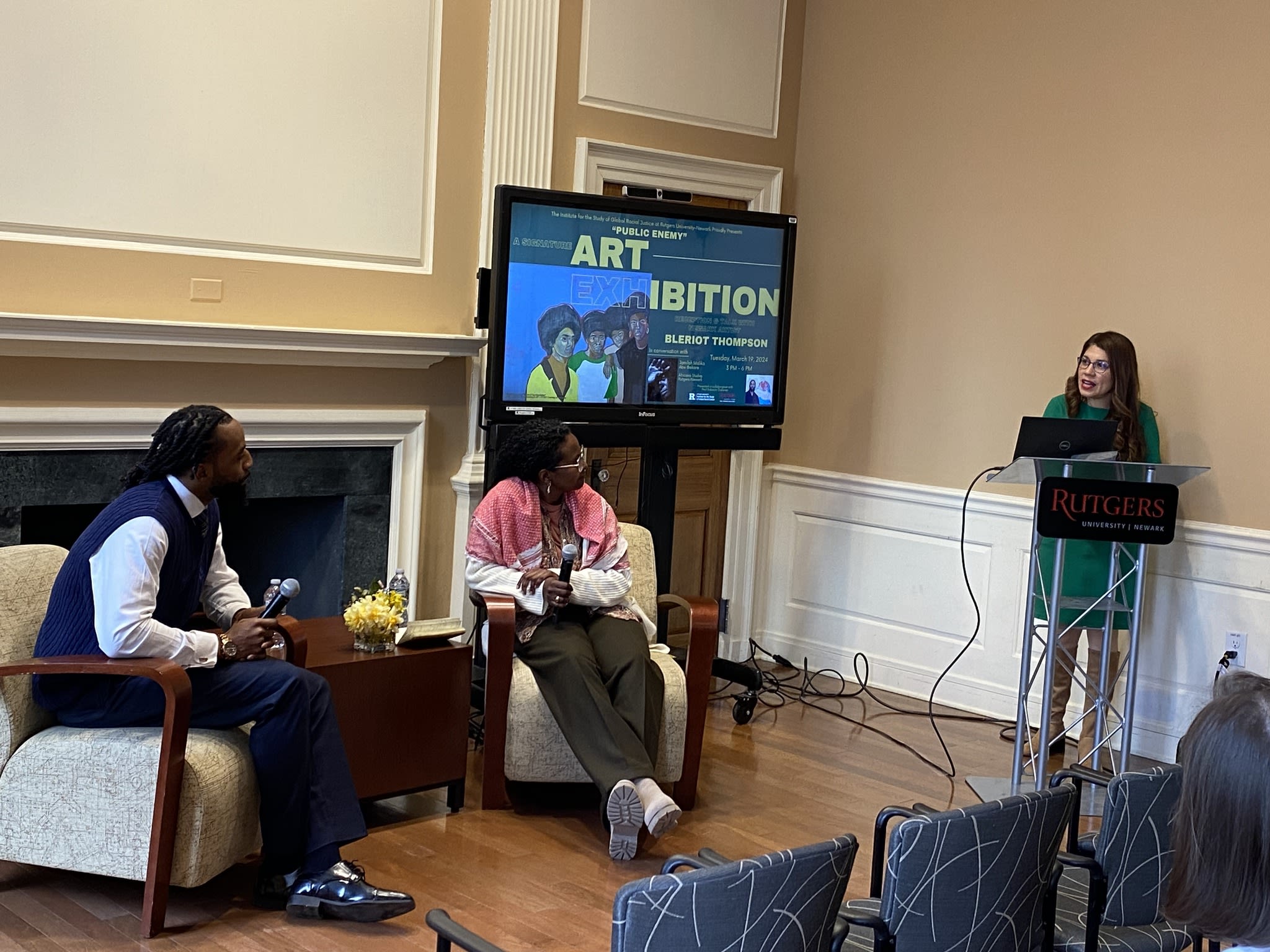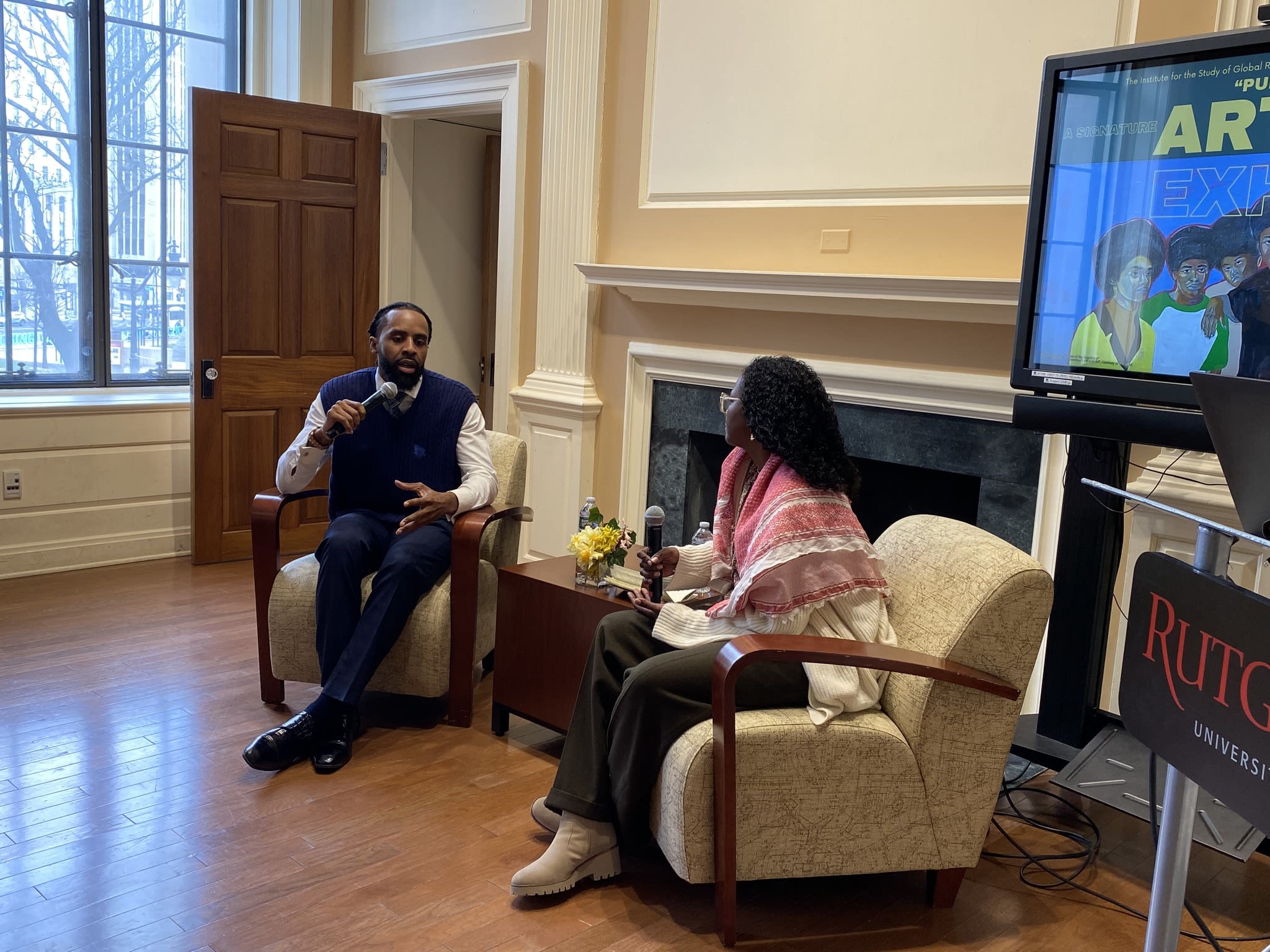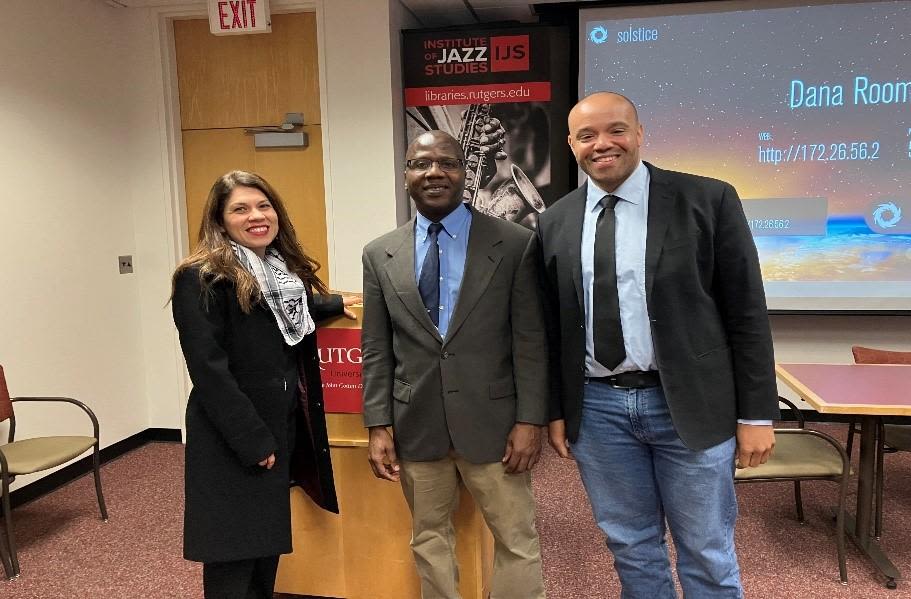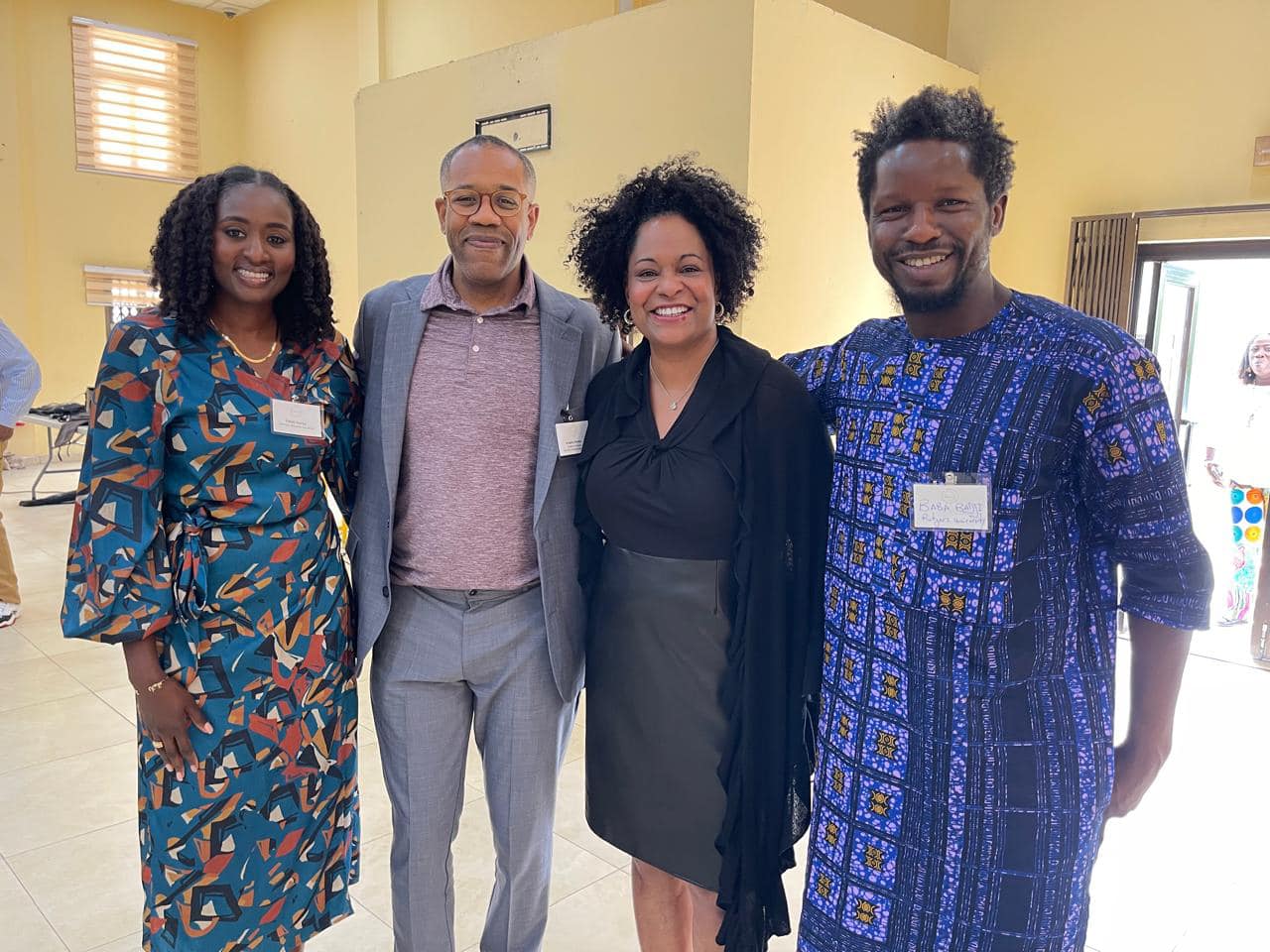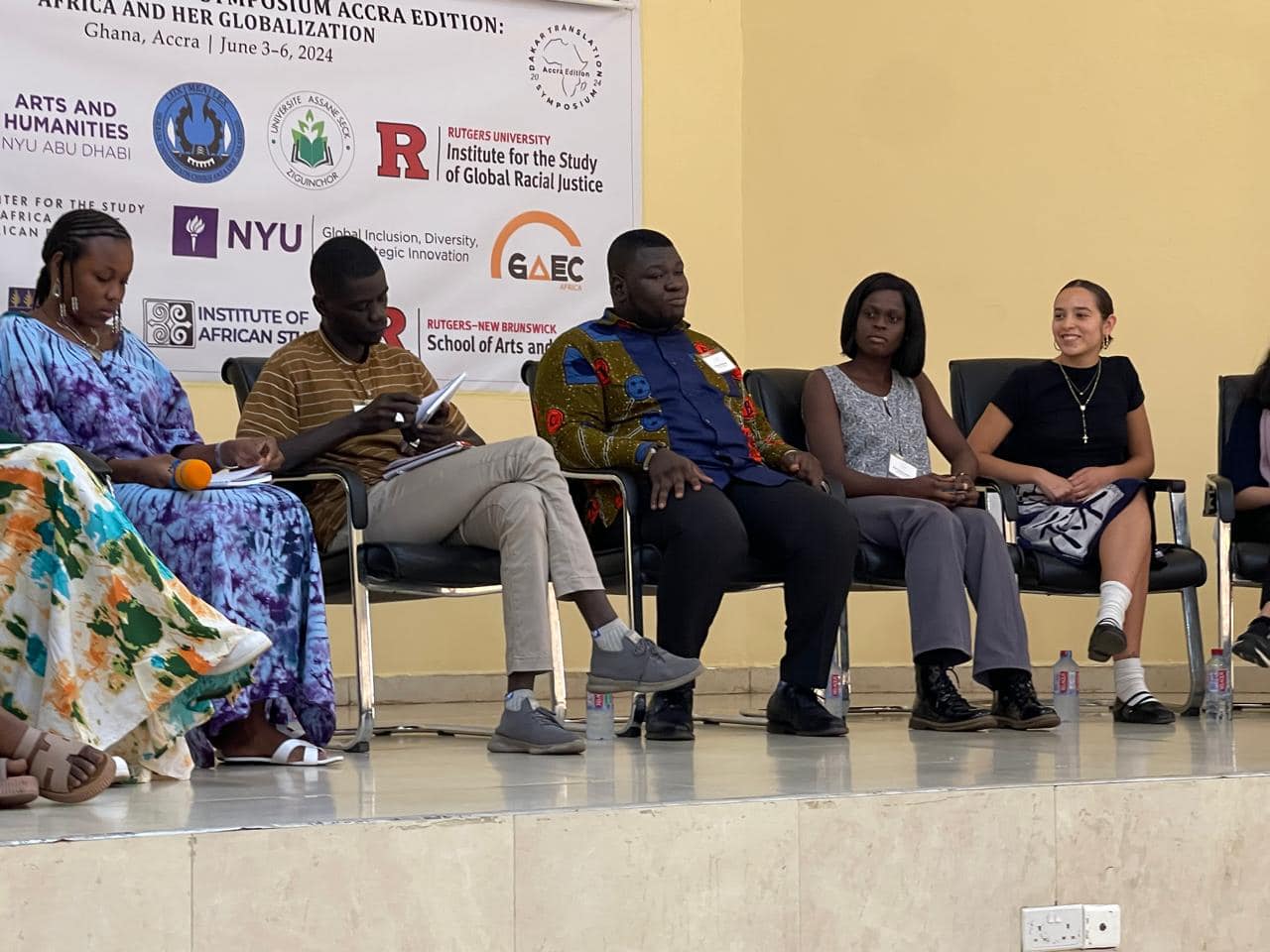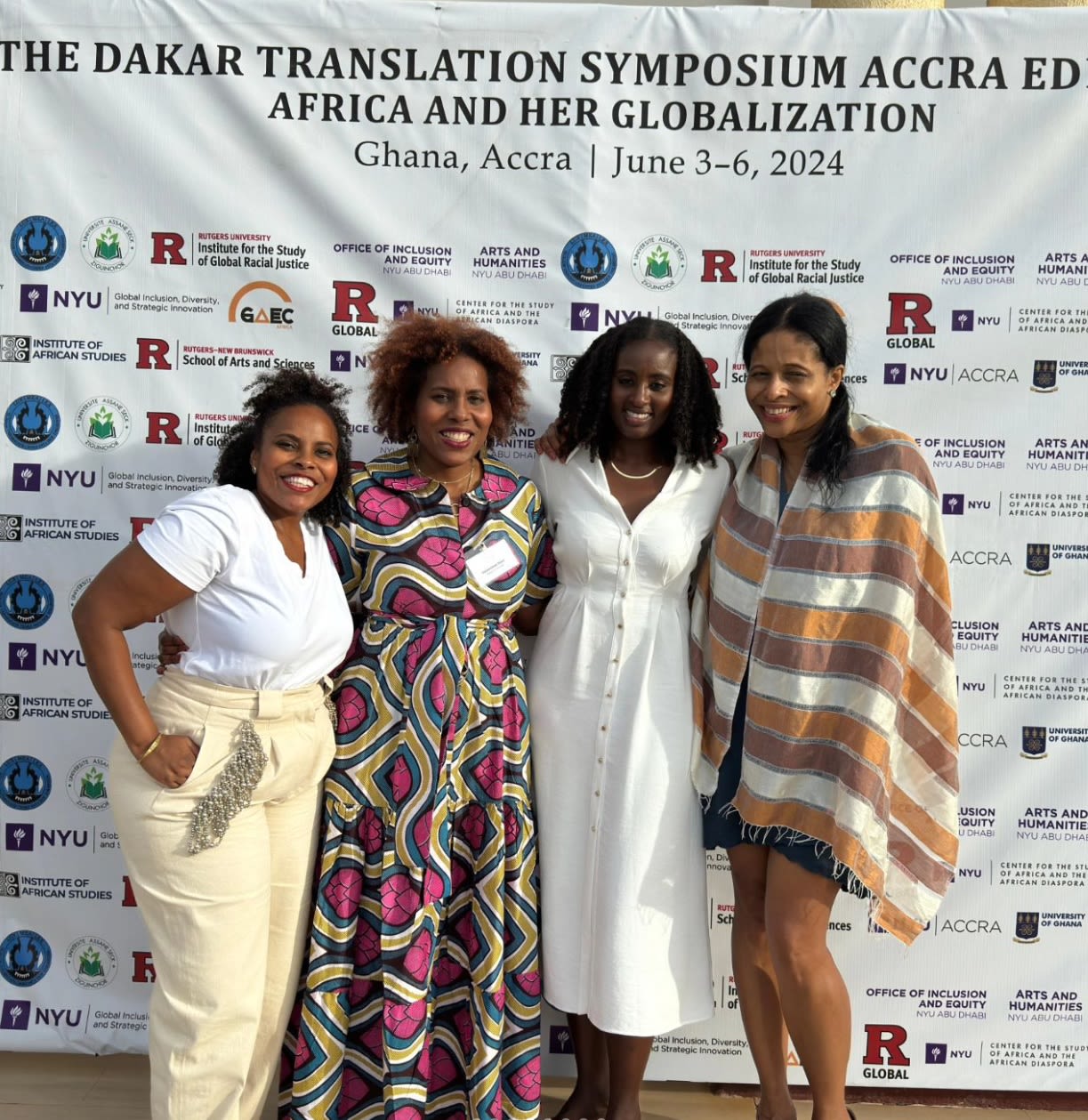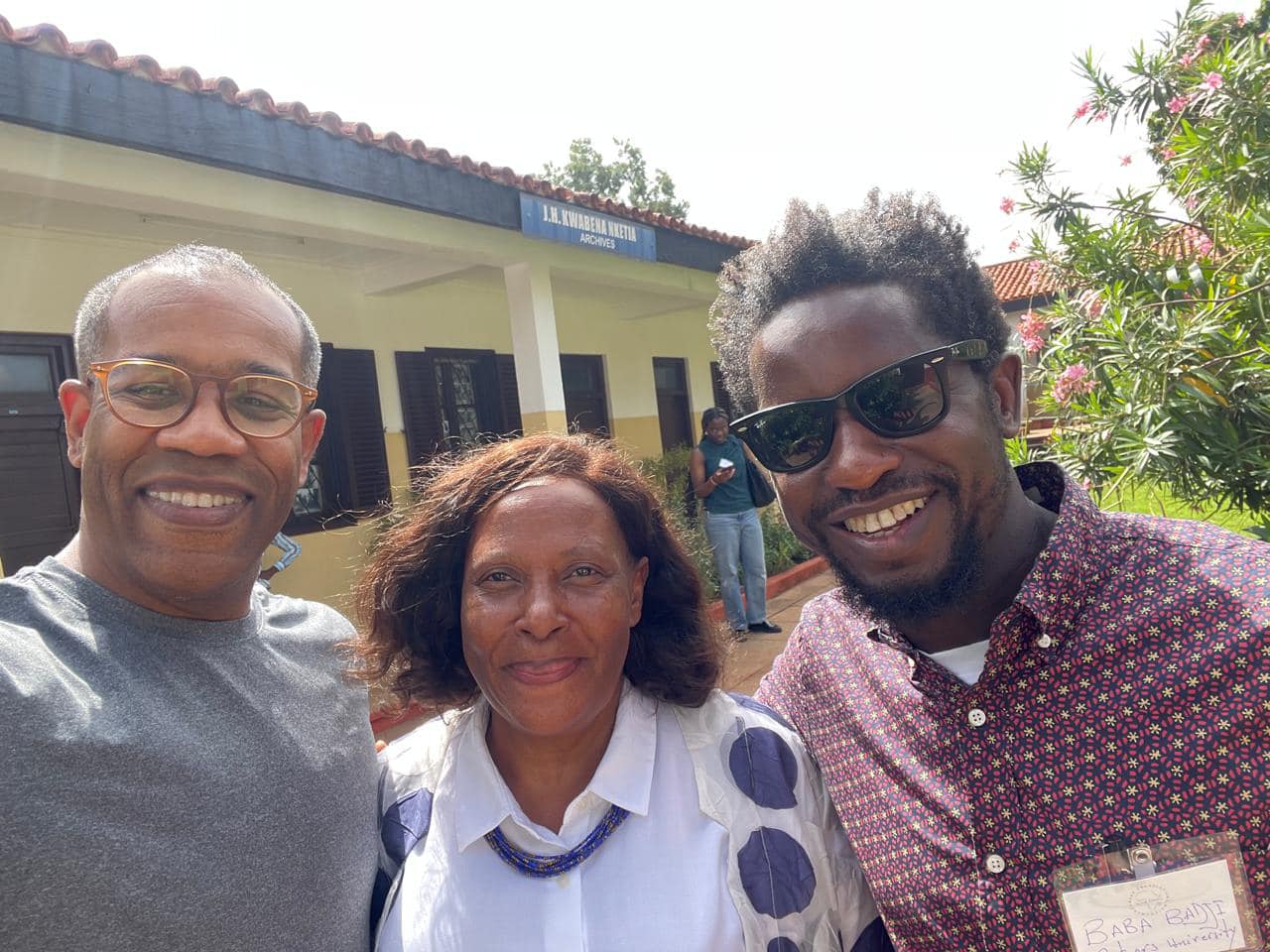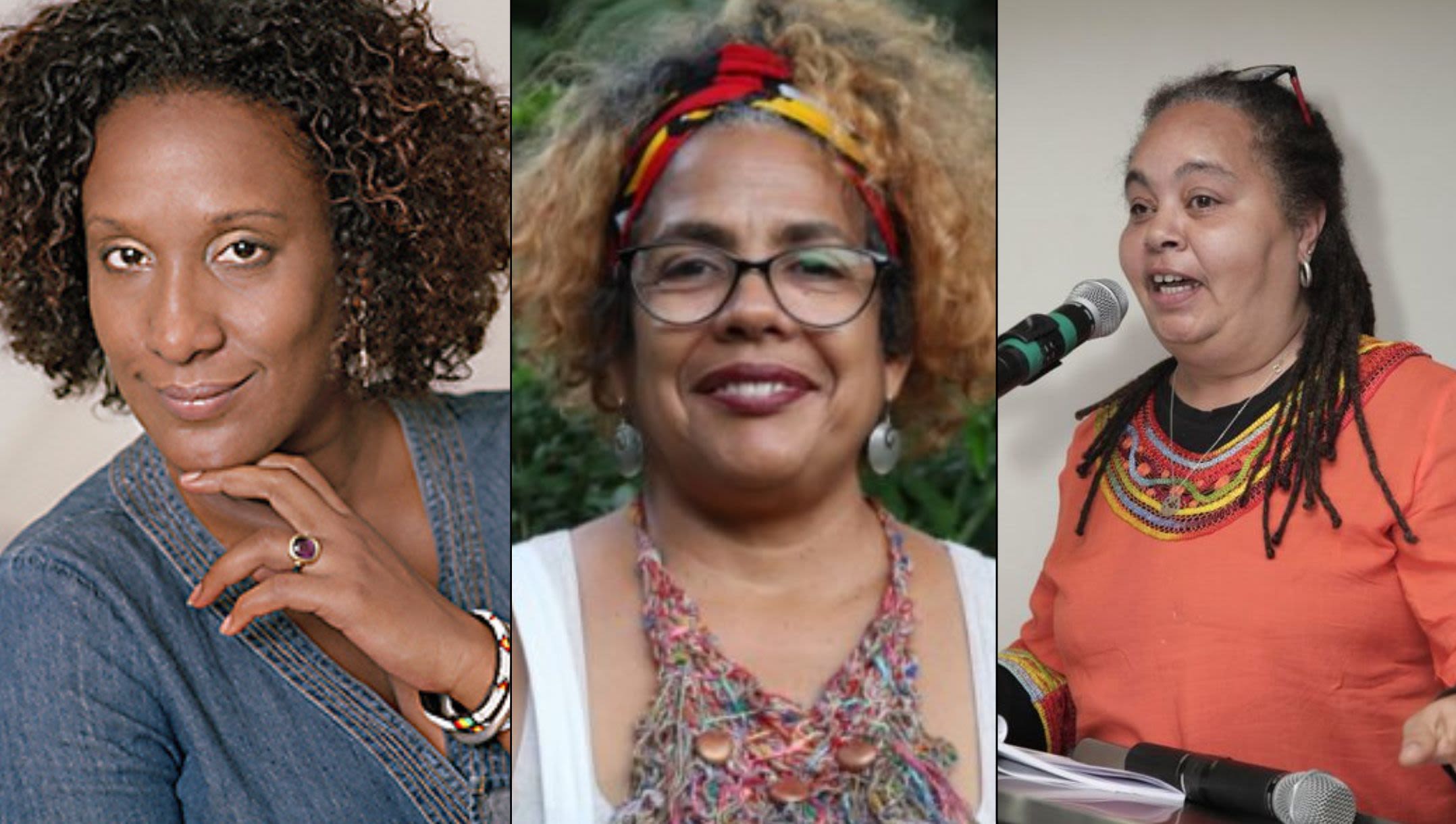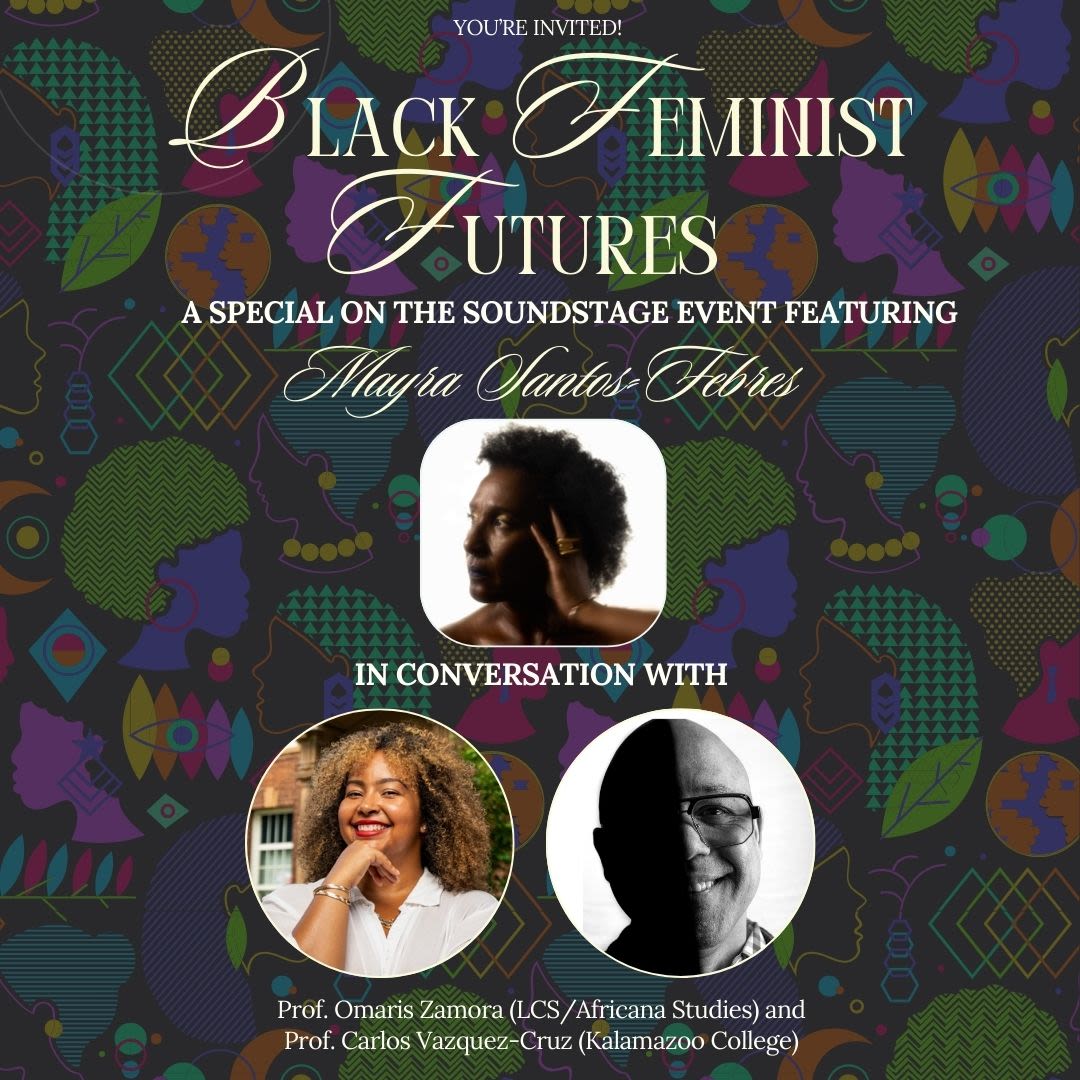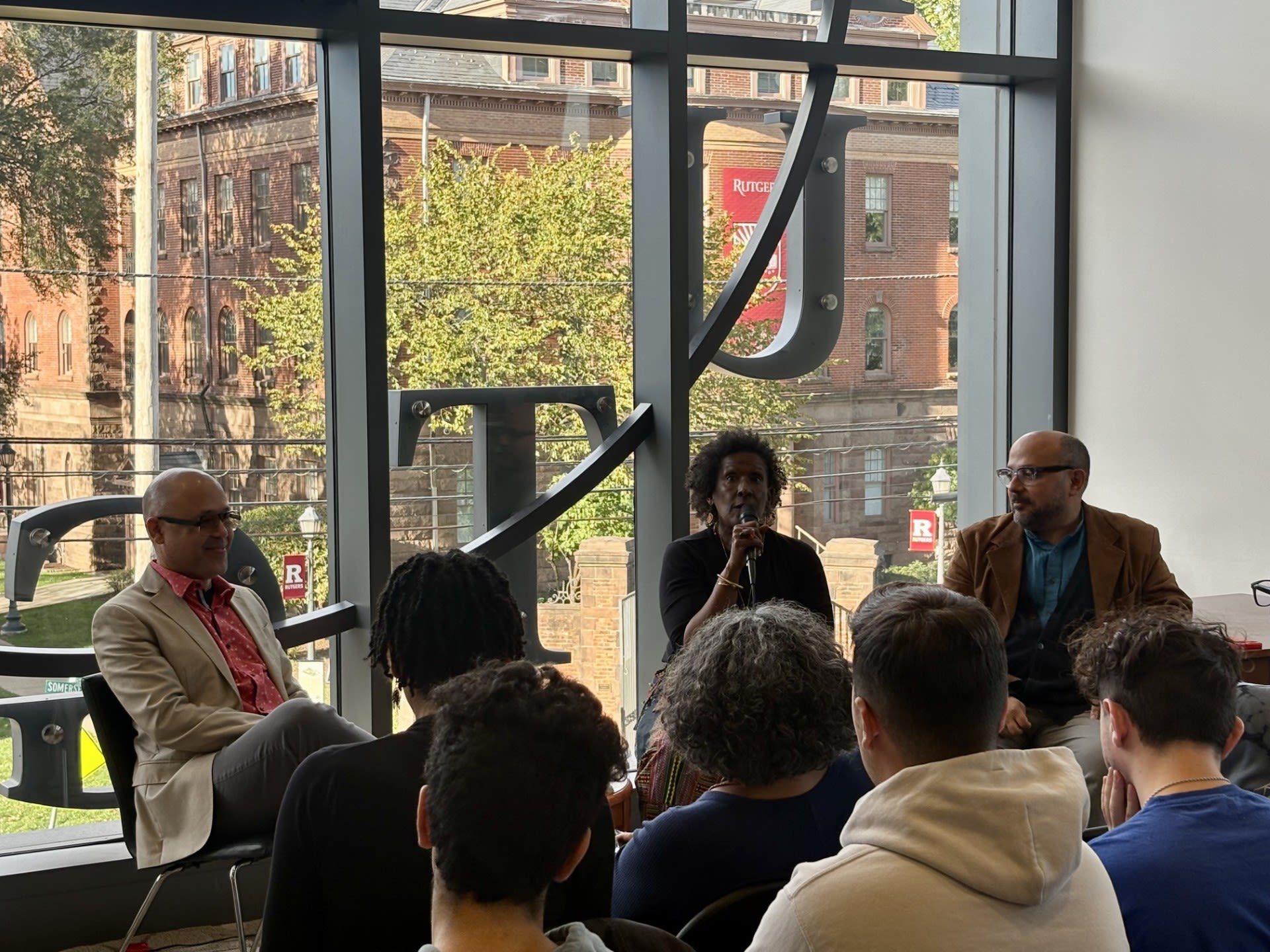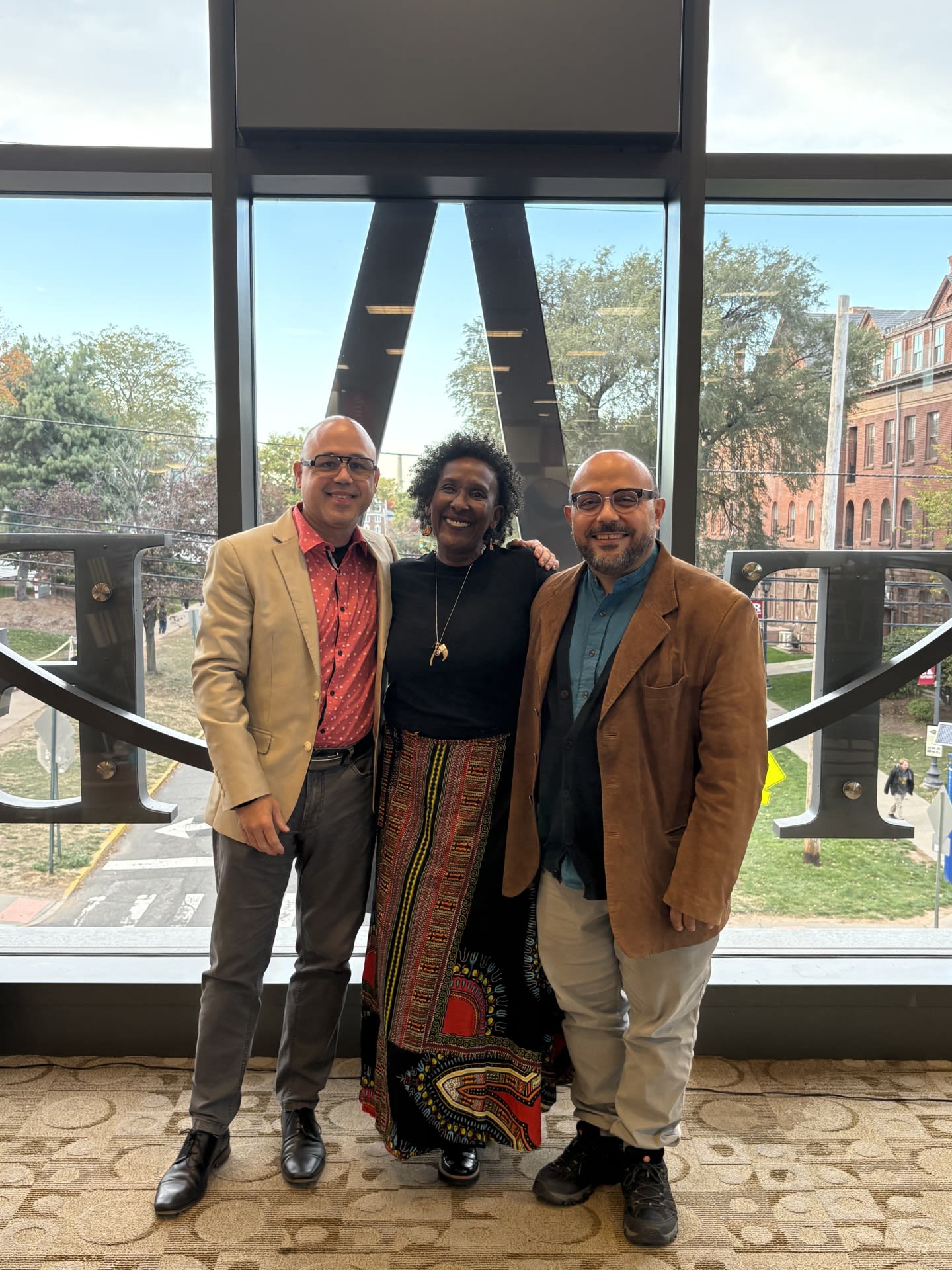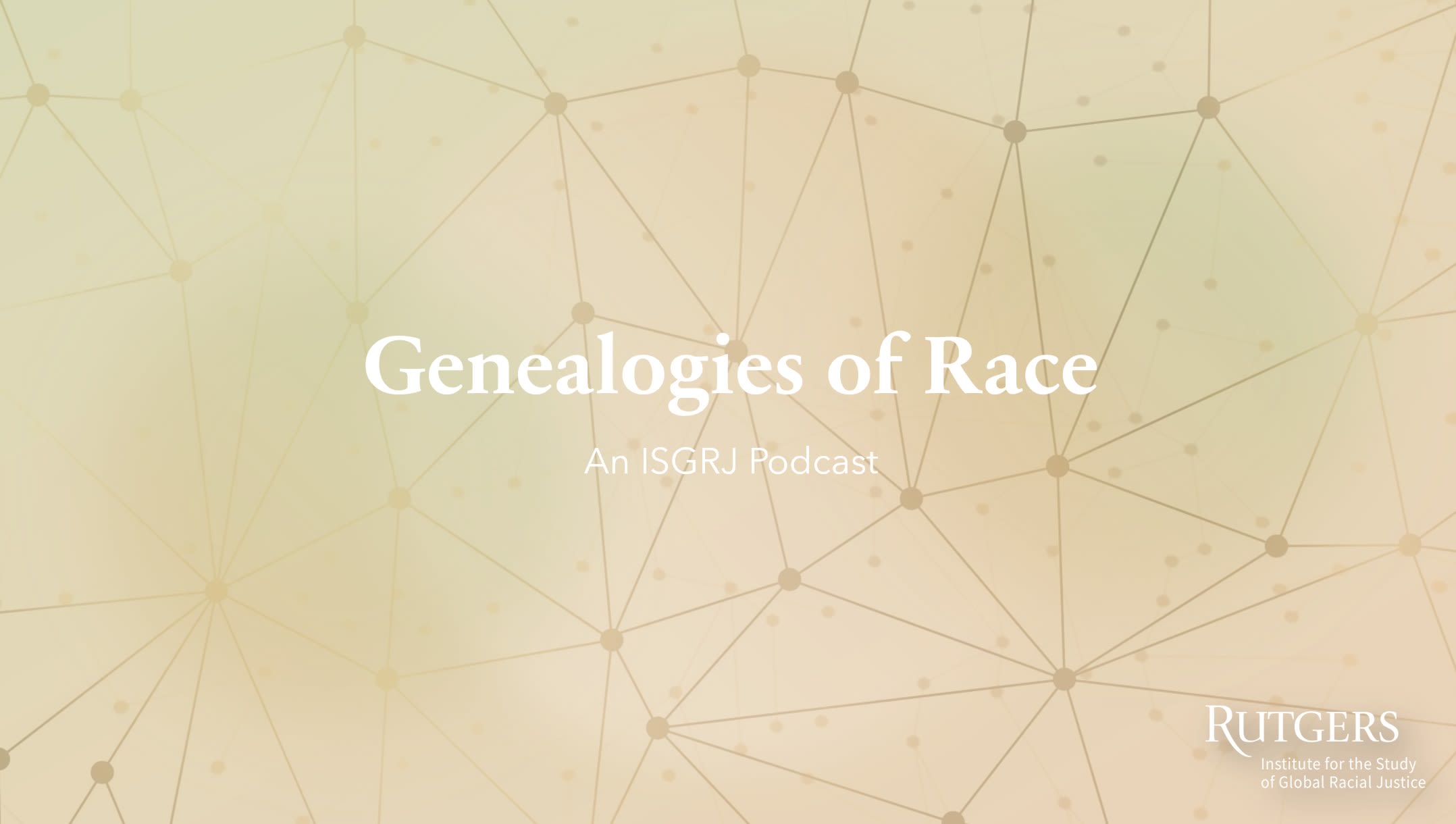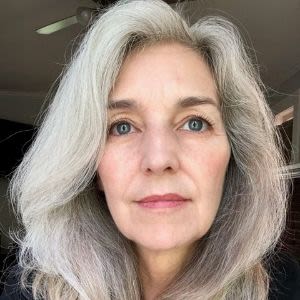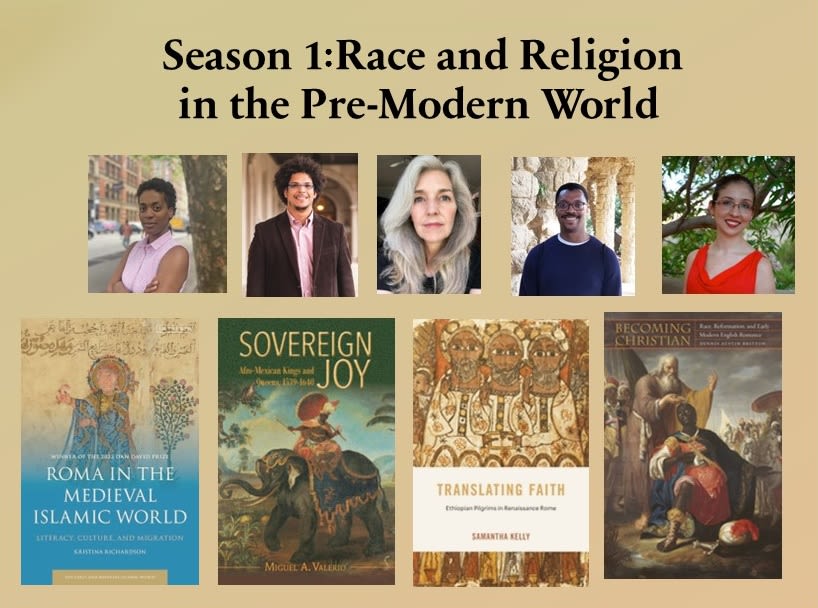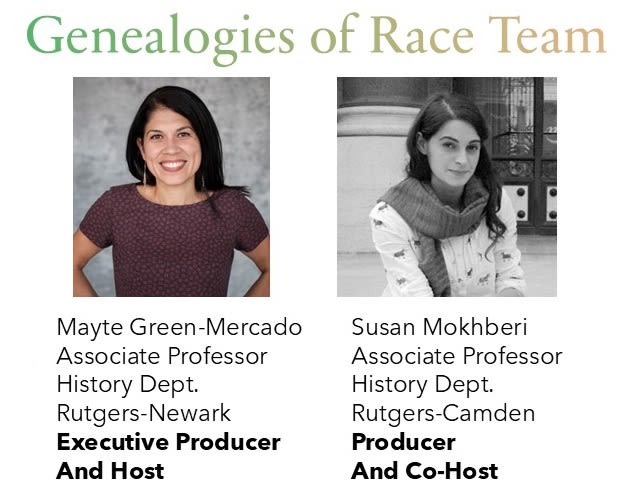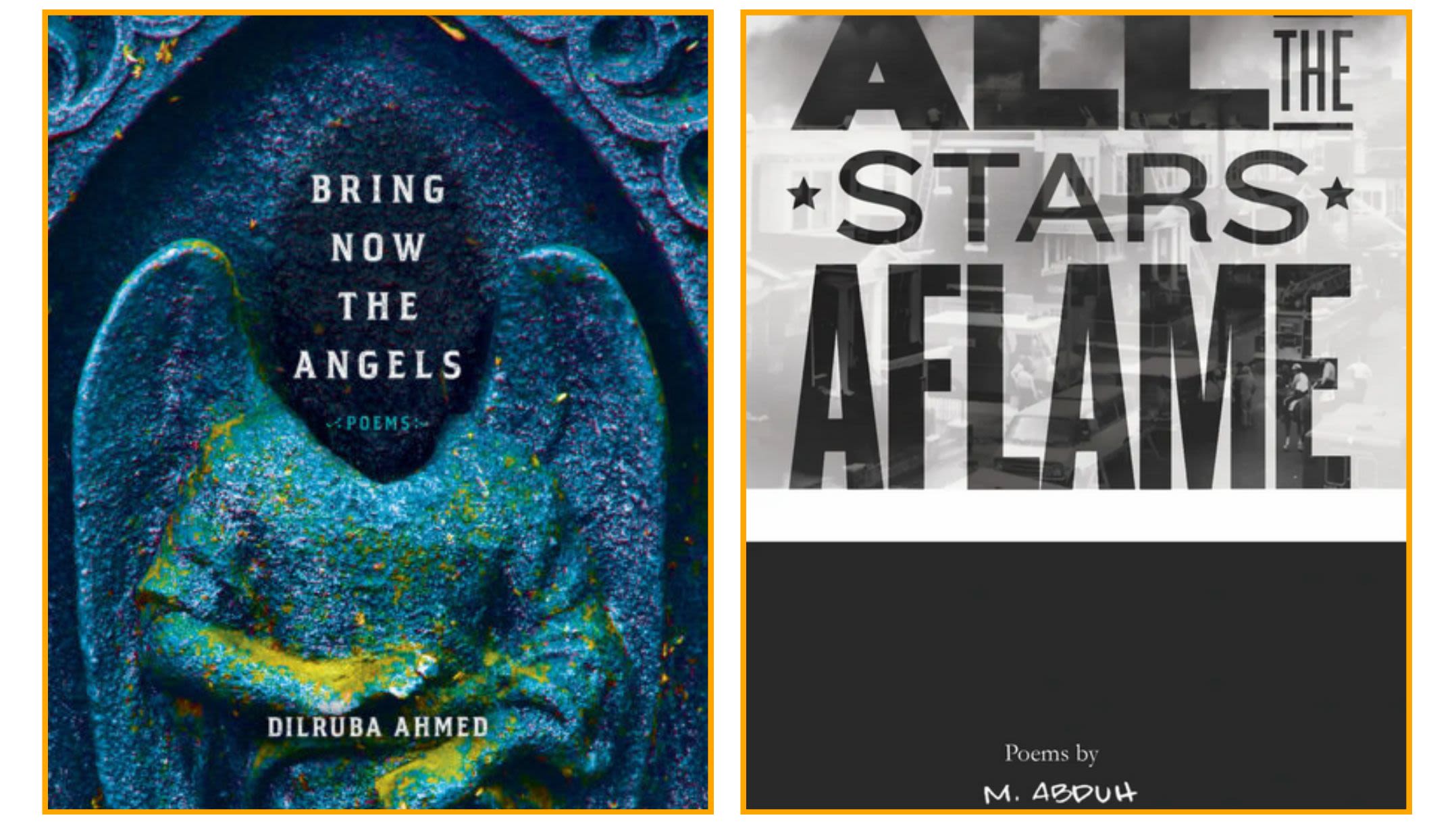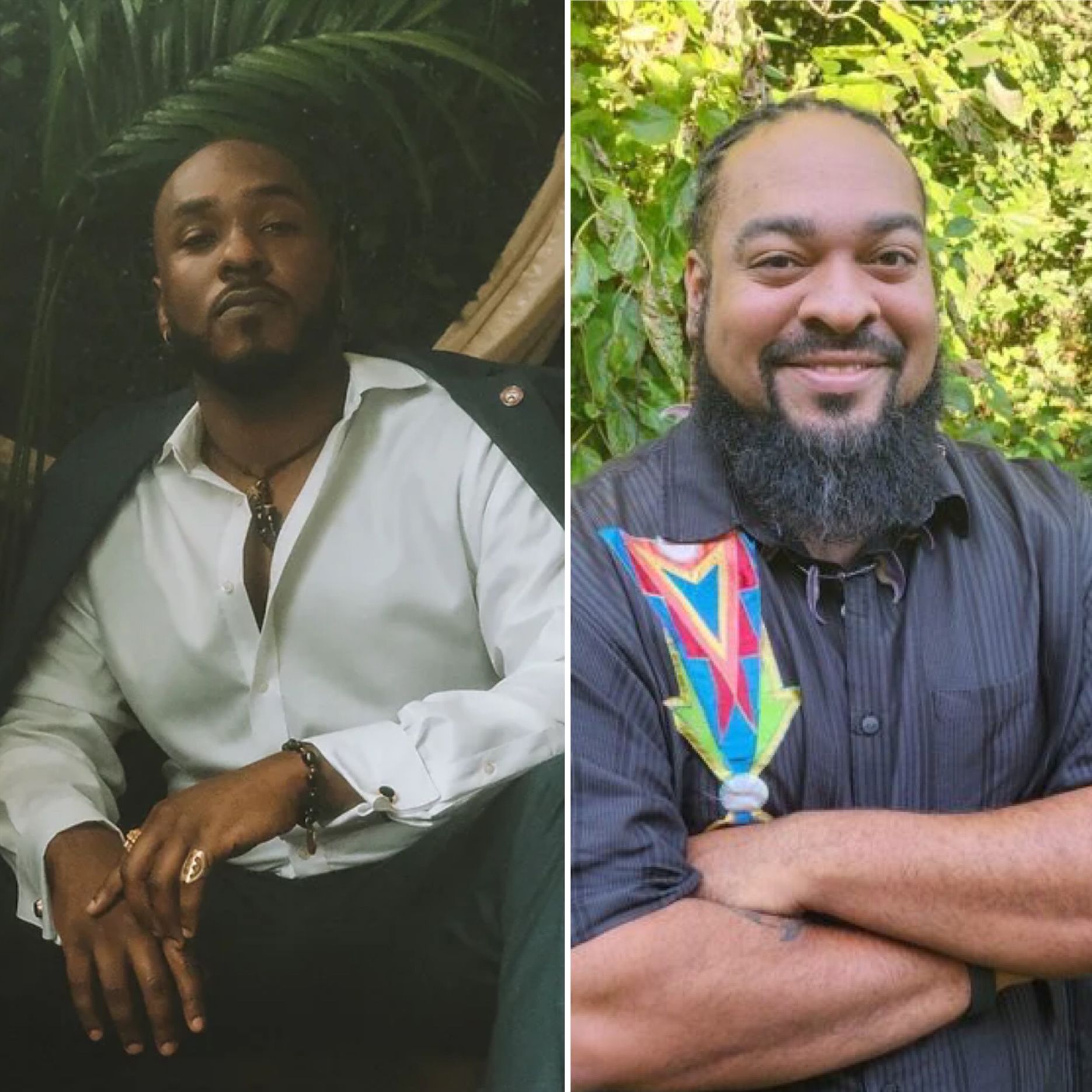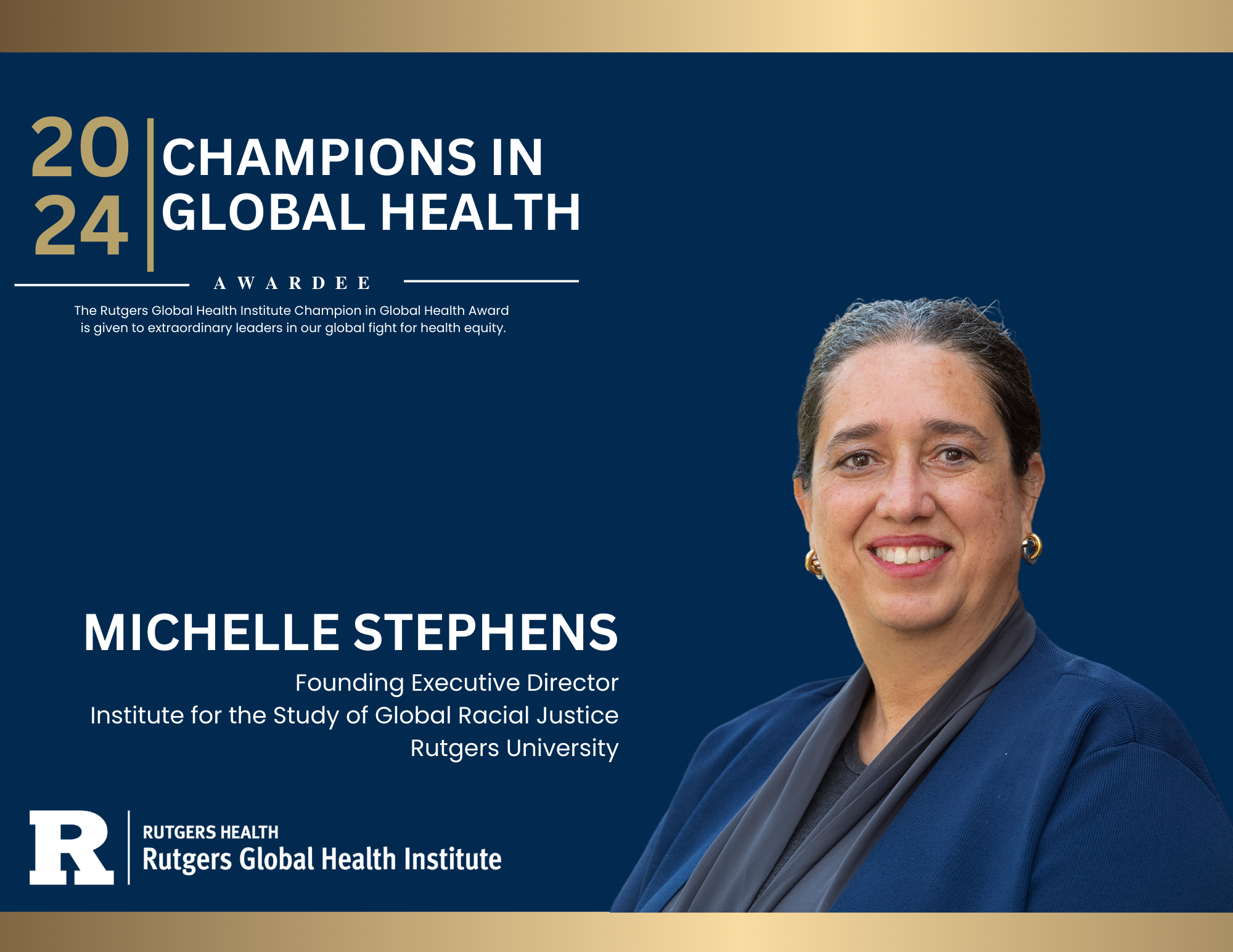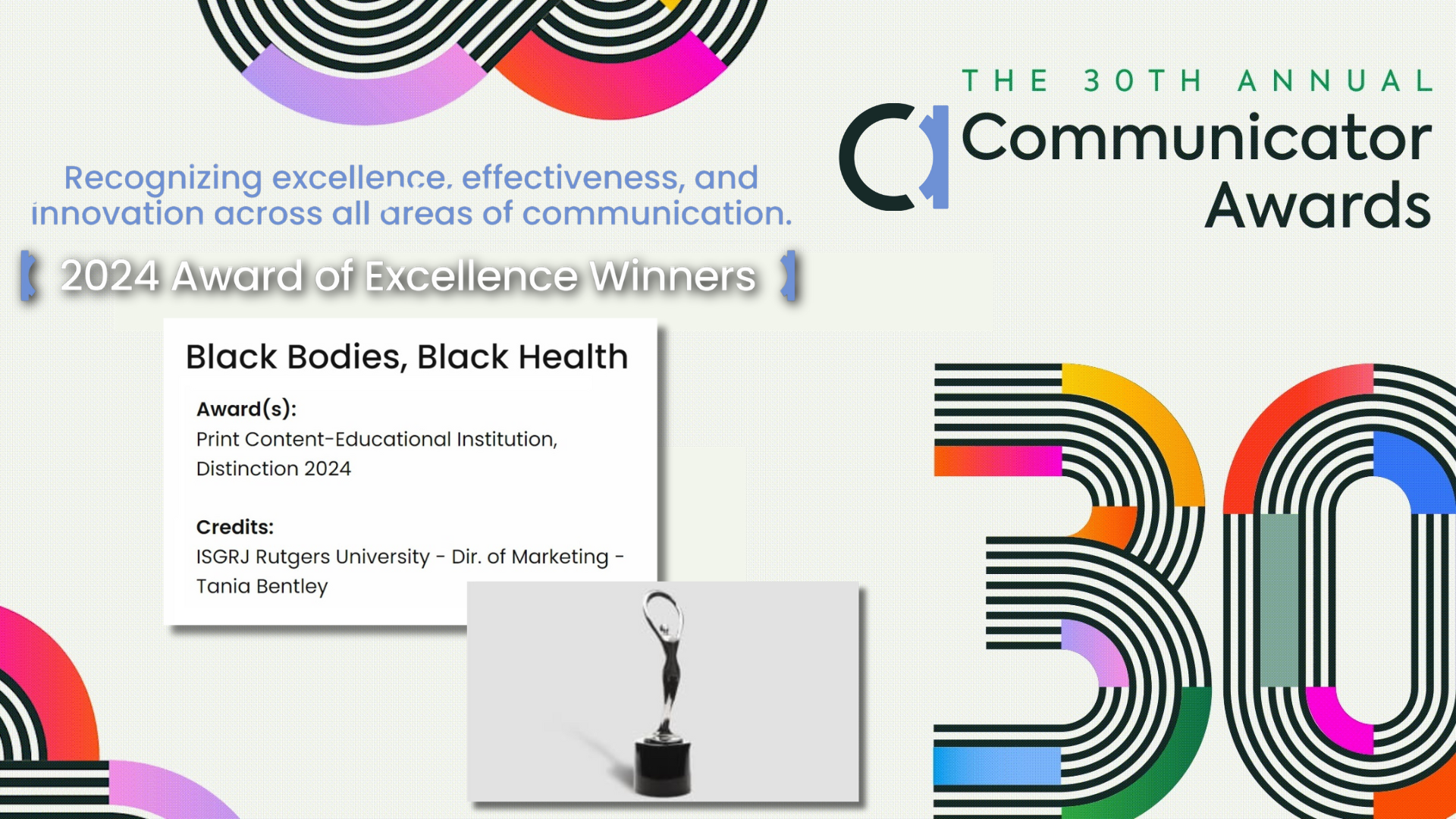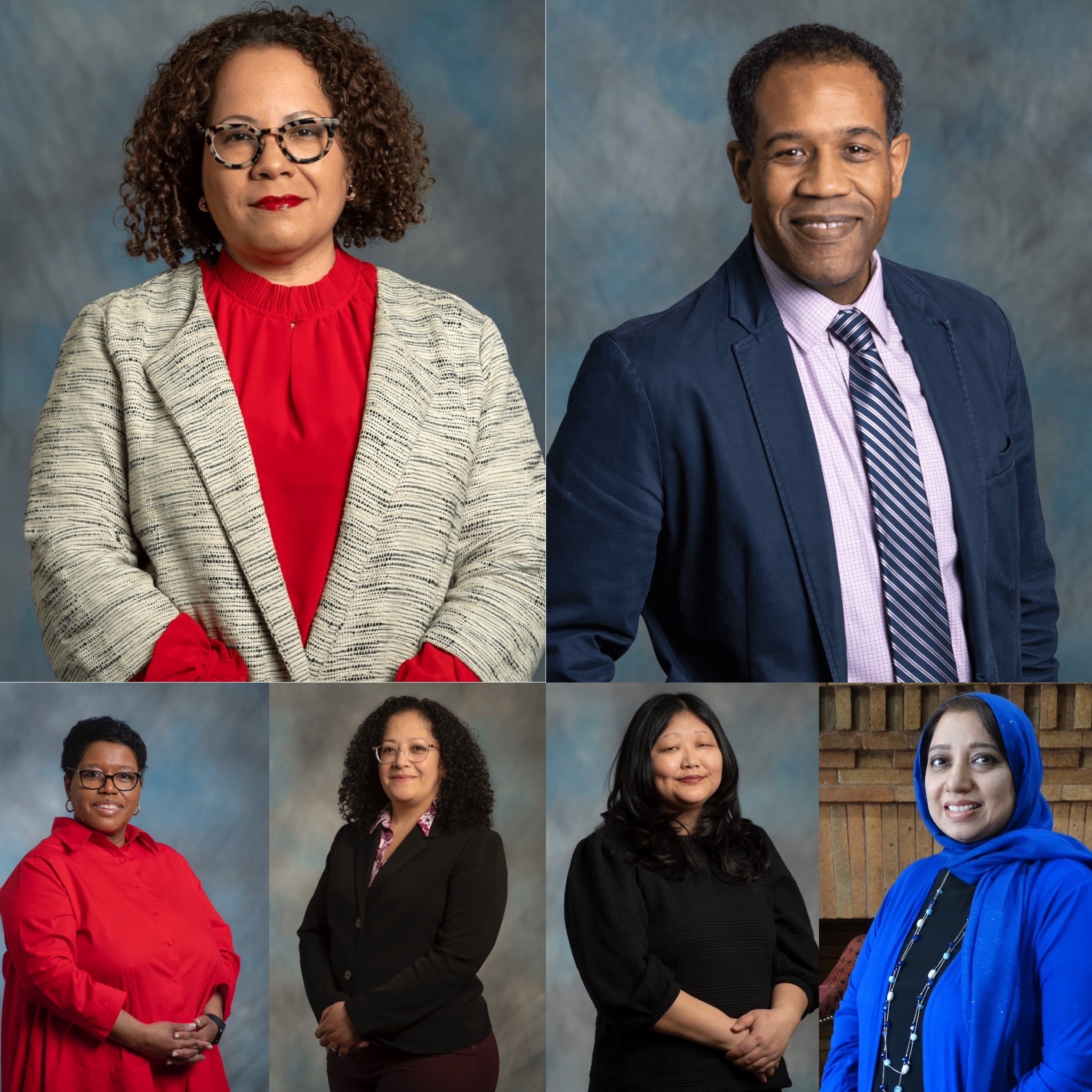Rutgers Institute for the Study of Global Racial Justice
Elevating the Rutgers Intellectual Corridor

Dear Friends and Colleagues,
Welcome to the Fall 2024 semester, and the beginning of ISGRJ’s fifth year as a research institute devoted to advancing the humanistic study of race, supported by a generous Higher Learning grant from the Mellon Foundation. As we enter the final two years of grant funded activity, I write to introduce new members of the ISGRJ community, to update everyone on our continuing programs and initiatives, and to share key milestones and events from the past academic year. Our thanks to President Holloway, EVPAA Moghe, Interim Chancellor Robinson, Chancellor Conway, Chancellor Tillis, Chancellor Strom, and the generous Deans and Provosts who have worked with us, for their continued support.
Networking the Rutgers Intellectual Corridor: Pilot ISGRJ Digital Humanities Initiatives
ISGRJ's primary vision is to help articulate and make visible the research accomplishments of a diverse array of Rutgers faculty and scholars whose work addresses issues pertaining to racial justice, both locally and globally. Early in our planning, ISGRJ’s first cohort of Faculty Directors (Michelle Stephens, Patrick Rosal, Erica Armstrong Dunbar, Gregory Pardlo and Elise Boddie) visualized Rutgers as an intellectual corridor spanning the university’s diverse campuses across the state of New Jersey.
Inaugural ISGRJ Faculty Directors
Inaugural ISGRJ Faculty Directors
Our launch during the Covid-19 pandemic necessitated creative use of digital resources and tools. These now serve as ISGRJ’s virtual scaffolding, linking Rutgers researchers on race together in collaborative intellectual communities of care. In 2023-2024 we debuted a trio of innovative, uniquely ISGRJ-branded and piloted initiatives that embody this vision and mission.
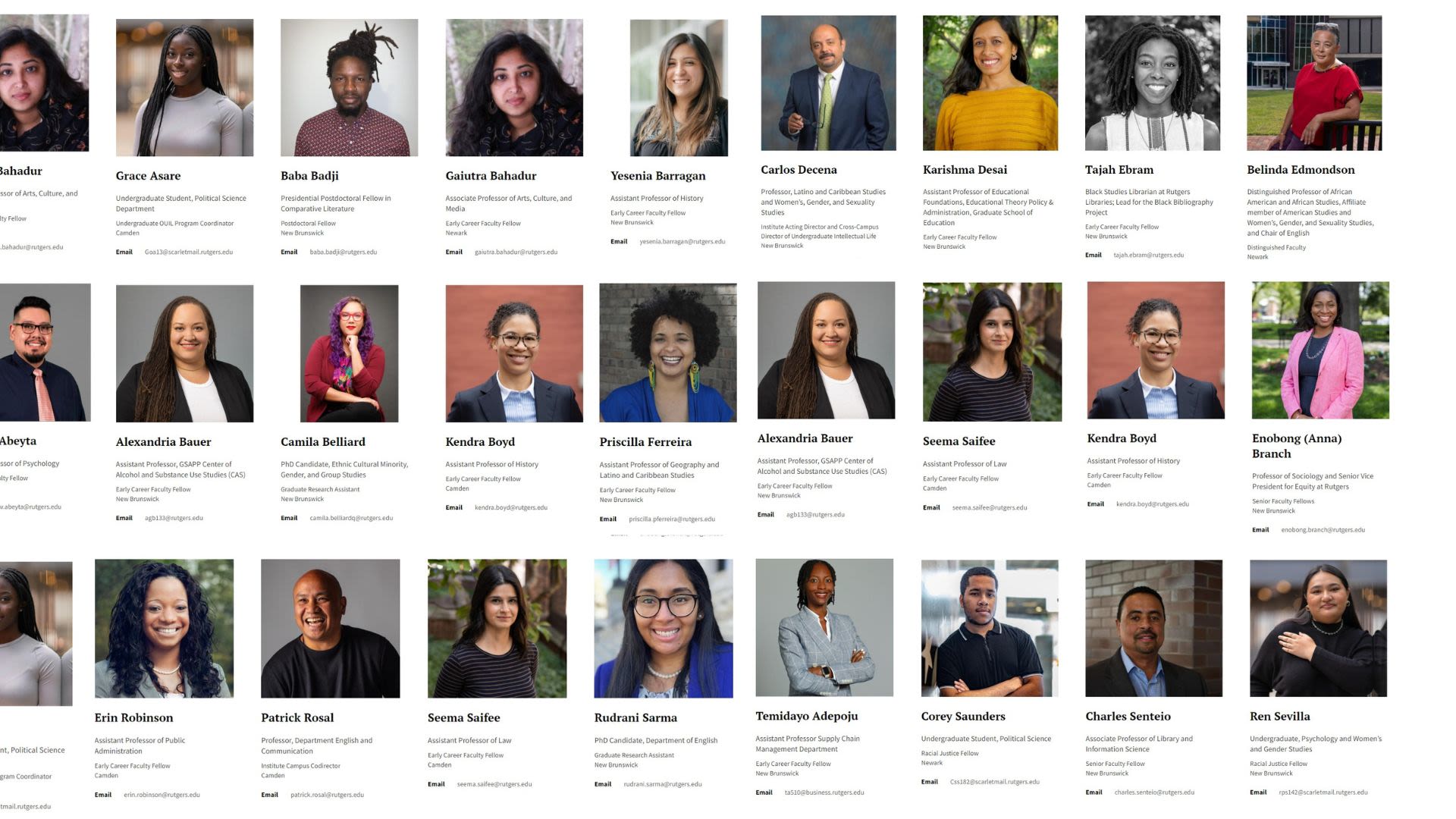

The Rutgers Researchers on Race (R3) Database is an interdisciplinary directory of Rutgers University's scholars deeply engaged in race and ethnicity studies. Reflecting our commitment to inclusive scholarship, this directory comprises experts from such diverse fields as Cultural Studies, Sociology, History, Political Science, English Literature and Ethnic Studies, to name but a few.
Each profile details the researcher's academic background, research interests, publications, and ongoing projects. Serving as both showcase and connector, this resource aims to facilitate collaboration, mentorship, and a broader understanding of race and ethnicity among Rutgers researchers, students, and the wider academic community. The database allows users the ability to search by campus, and also to filter the results by research area.
A Rutgers Researcher on Race (R3) Profile: 2024-2025 Early Career Faculty Fellow Dr. Valerie Adams-Bass
A Rutgers Researcher on Race (R3) Profile: 2024-2025 Early Career Faculty Fellow Dr. Valerie Adams-Bass
R3's Filter By Campus Feature
R3's Filter By Campus Feature
A Word Bubble of all of the areas of research and race-related expertise and inquiry represented in the R3 Database
A Word Bubble of all of the areas of research and race-related expertise and inquiry represented in the R3 Database
All Rutgers faculty and researchers are welcome to add your profile to the R3 Database here, and we encourage you to watch this brief instructional video for a how-to on finding colleagues with like-minded interests across the Rutgers, New Jersey landscape.
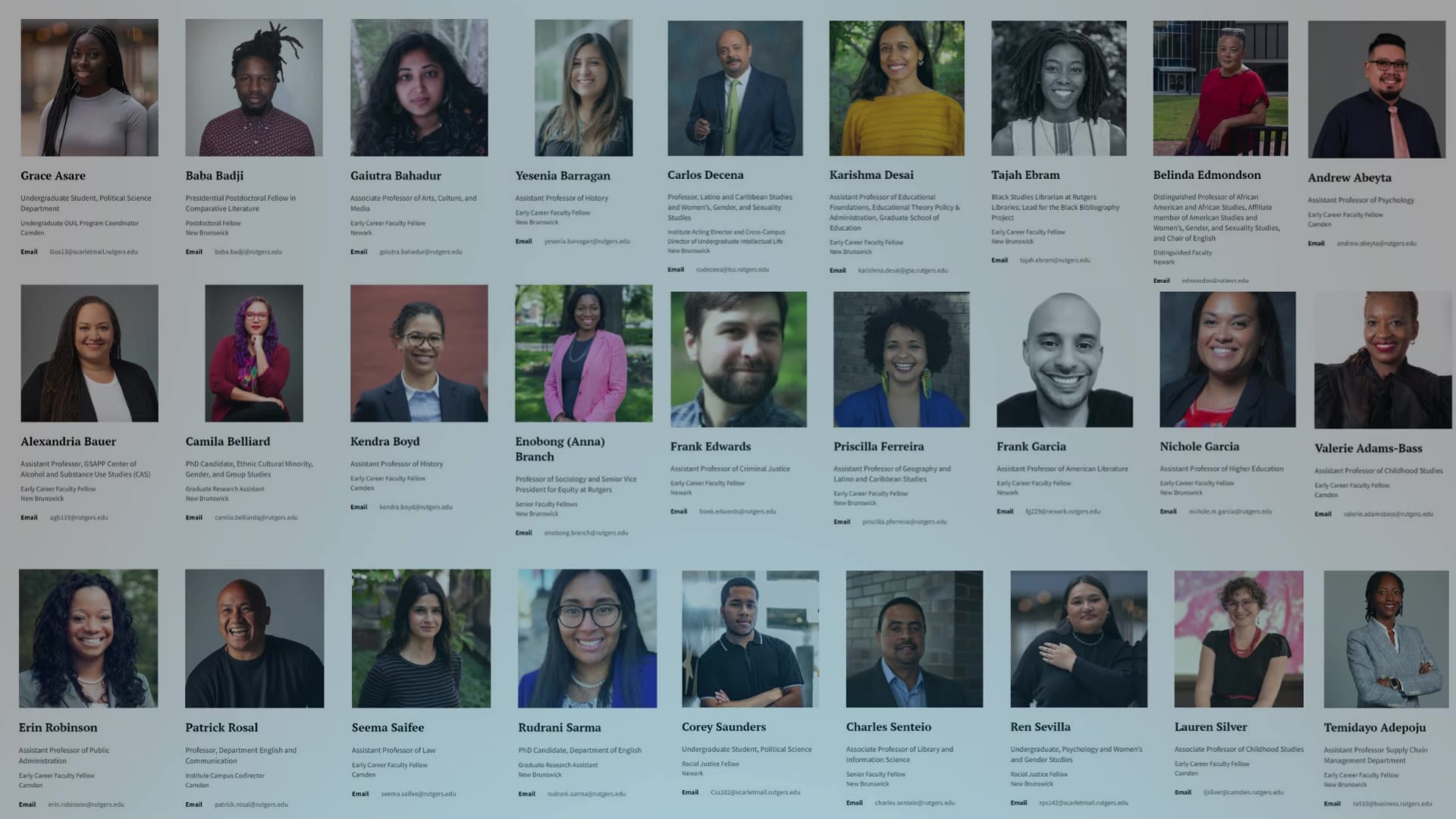

Continuing the goal of serving as both a platform and a gathering space, ISGRJ’s second pilot digital initiative is Justice Archives, a comprehensive, interactive and inclusive scholarship archive of all current and past events, signature and sponsored research projects, programs and initiatives, undertaken by Rutgers faculty with the support of ISGRJ.
This dynamic archive, the first-of-its-kind at Rutgers University and other academic institutions and institutes on race, provides a snapshot of the over 350 events and projects sponsored by Rutgers faculty over the two and half years of ISGRJ’s launching.
Justice Archives allows users the ability to access and browse events, initiatives, and programs by category (ISGRJ Teaching and Research Labs, our Signature Events, and our Intellectual Series)...
...by year since our founding (2021, 2022, 2023 or 2024)...
...or by location (Rutgers-Newark, Rutgers New-Brunswick, Rutgers-Camden, University-Wide, and Global), to provide a comprehensive, fully integrated archive of research projects, programs, and events in the area of global racial justice.
As a mere sampling of the events and projects related to racial justice occurring across Rutgers’ chancellor-led units in any given year, it is our hope that Justice Archives could serve as a launching pad for Rutgers researchers to add information on their own related projects, events and initiatives in the years to come.
Finally, Just Takes, an Op-Ed/thought piece/writing initiative at the ISGRJ, encourages faculty from across the university to share reflections on current issues in global racial justice that draw insights from their own research, orienting their ideas toward a more public audience through submitting pieces of writing of 500 words or less.
The Just Takes initiative aligns with our mission to increase the public relevance and impact of Rutgers scholarship on race, allowing us both to reach and to learn from communities and the public beyond the academy.
If you are interested in submitting an entry, please fill out the submission form here. To read a first round of fascinating pieces from colleagues covering such topics as reparations, the significance of water, childhood as a political battleground, urban racial and economic segregation, and the intersectionalities of structural gendered racism in child protective services, please click the link below:

The R3 Database, Justice Archives, and Just Takes, our uniquely-branded and piloted trifecta of digital humanities projects, serve as more than simply a function of our website. They represent the manifestation of the vision of Rutgers as an intellectual corridor launched by ISGRJ’s first Faculty Directors in 2020.
This vision continues under the leadership of ISGRJ’s current board of cross-campus, university-wide directors (Michelle Stephens, Carlos Decena, Patrick Rosal, and Mayte Green-Mercado).
ISGRJ Board of Directors
ISGRJ Board of Directors
The three initiatives support and reflect Rutgers’ stature as a preeminent public university producing interdisciplinary, inclusive research on global racial and social justice, in modes that transcend our campus units and go beyond our disciplinary academic communities.
"The three initiatives support and reflect Rutgers’ stature as a preeminent public university producing interdisciplinary, inclusive research on global racial and social justice, in modes that transcend our campus units and go beyond our disciplinary academic communities."
Transforming Racial Formations of the Human:
ISGRJ Teaching and Research Labs
2023-2024 also saw the launch of two signature ISGRJ Teaching and Research Labs on Race, Social Justice, and the Human. In these multi-modal spaces, scholars, students and faculty investigators pair arts, humanities, and cultural studies research methods with social and behavioral science and stem approaches, to produce collaborative, multi-genre, cutting-edge research on race. Each lab aims to contribute innovative research and pedagogy that can lead to the disruption and transformation of racial formations of the human.
The Race and Gender Equity (RAGE) Lab founded by ISGRJ Senior Fellow Brittney Cooper, Professor of Women's, Gender, and Sexuality Studies and Africana Studies at Rutgers-New Brunswick, is committed to producing Black feminist research on the social thriving of Black women and girls and making that research accessible to broad public audiences. As a research and training incubator, RAGE Lab focuses on studying the variety of ways that Black feminists do their work in public. Using a mix of community conversations, digital archiving methods, oral histories of Black feminist thinkers who visit the lab, and textual analysis of Black feminist online knowledge production, researchers in the lab work to ascertain a comprehensive view of the conditions that shape contemporary Black feminist knowledge production.
On May 30th 2024, RAGE Lab launched its inaugural Black Feminist Public Works Incubator, Plait/Form, with the generous support of the Ford Foundation, the Mellon Foundation, and the Ms. Foundation for Women. Much like the nightly plaiting practice that has shaped so much of Black communal intimacies, including Black women and girls’ hair care traditions, Plait/Form offered space to intentionally bring together the strands of thinking, teaching, and creating that anchor Black feminist public life. The incubator likewise provided a meeting place for reflecting on the forms that such braiding together of ideas might take.
Over the course of three days, the program featured Plait/Form’s executive coaches, Dr. Takiyah Amin and Dr. Monica Coleman. Renowned for their award-winning work as scholars and consultants, they worked closely with participants throughout the program to fine-tune project proposals, including books, podcasts, and Afro-futuristic third spaces, that respond to the question "What does Black feminism look like in public?"
Participants with designs on trade publishing also had an opportunity to engage with Tanya McKinnon and Jamia Wilson at McKinnon Literary and Random House respectively and learned key strategies for not only developing an attractive manuscript but also procuring the support of a literary agent. Jouelzy, public historian and curator of the Smart Brown Girls Book Club and Shawnda Chapman, Director of Innovative Grantmaking and Research at the Ms. Foundation also led mentoring sessions with invaluable practical advice on mediating the algorithmic demands of our increasingly technologized world and procuring the resources to support projects.
Finally, participants engaged with keynote speaker, Dr. Melissa Harris-Perry, whose conversation with RAGE Lab founding director Dr. Brittney Cooper was attuned to the vicissitudes of our contemporary political moment. As one of the first Black women academics in the United States to make inroads into a career as a media personality, she shared moving insights into the promises and pitfalls of a "media turn" for Black feminist scholars and creatives.
Plait/Form keynote speaker Dr. Melissa Harris-Perry in conversation with Dr. Brittney Cooper
Plait/Form keynote speaker Dr. Melissa Harris-Perry in conversation with Dr. Brittney Cooper

The Black Ecologies Lab is a provocative and generative site within a growing archipelago of radical Black ecological organizing and discourse. The Lab joins the forces of its two conveners, ISGRJ Named Term Chairs Teona Williams and J.T. Roane.
The Lab generates scholarship and provides a suite of digital and artistic projects, speaker series and workshops, community engagement events, teaching and undergraduate program development, and publications, all of which aid in infusing public and scholarly discourse and our broader cultural imaginaries with black ecological insights.
With a board of advisors including collaborators from Colgate University, Jupiter Performance Studio, the University of Maryland, and the University of North Carolina, the Black Ecologies Lab held innovative “field schools” -- gatherings that include local organizers and students working together to envision food and environmental justice for surrounding communities -- in Tappahannock, Virginia (Summer 2023) and New Orleans (Summer 2024).
The Black Ecologies Field School in New Orleans, LA (July, 2024)
The Black Ecologies Field School in New Orleans, LA (July, 2024)
Watch a highlight video of the 2023 gathering in Tappahannock, Virginia, below:
The Lab’s events throughout the academic year included “Just Harvest, Food Justice Through Community Empowerment,” a gathering in Virginia that included the launch of the new e-zine of the Black Ecologies project, viewable here.
The Black Ecologies Zine
The Black Ecologies Zine
We're proud to announce that the Black Ecologies Zine has been honored with a Platinum Award in the 2024 MarCom Awards, administered by the Association of Marketing and Communication Professionals!
The MarCom Awards honor excellence in marketing and communication while recognizing the creativity, hard work, and generosity of industry professionals. Since its inception in 2004, MarCom has evolved into one of the largest, most respected creative competitions in the world. Each year, about 6,500 print and digital entries are submitted from dozens of countries.

Building Communities of Care
2024-2025 Named Term Chairs and Early Career Faculty Fellows
Since its pilot launch in 2020, ISGRJ has strived to contribute to the hiring and mentoring of emerging scholars studying race. In partnership with the Faculty Diversity Collaborative, the ISGRJ Mentorship Mosaic Program has provided four cohorts of junior scholars and writers with robust mentorship, targeted research, writing, and professional development programs, a vibrant peer intellectual community, and further engagement with humanities methodologies articulated within an intentionally interdisciplinary context.
Since September of 2021, ISGRJ has supported collectively across the Chancellor-led units 16 postdoctoral fellows, including 3 who have joined the Rutgers community as Presidential Postdocs and future faculty; and 40 early career faculty fellows from fields ranging widely across the arts & sciences—including the arts, media studies, history, Africana, Jewish, Native American, and Latino and Caribbean studies, literary studies, the languages and linguistics, sociology and political science, anthropology, geography, psychology, childhood studies, education, public administration—and from schools far-ranging across the Rutgers system—including, the School of Criminal Justice in Newark, Mason Gross School of the Arts, the Graduate School of Education, the School of Management & Labor Relations, the Edward J. Bloustein School of Planning and Public Policy, Rutgers Business School, and the School of Social Work in New Brunswick, and the School of Nursing in Camden.
Our Named Term Chairs, the Mellon Assistant Professors in Global Racial Justice, represent a diverse group of scholars whose funding from Mellon allows them to launch ambitious collaborative research programs and innovative undergraduate pedagogical initiatives.
ISGRJ Named Term Chairs (L to R): Christina Knight, Melissa Valle, Melanie Hill and J.T. Roane
ISGRJ Named Term Chairs (L to R): Christina Knight, Melissa Valle, Melanie Hill and J.T. Roane
We are pleased to welcome three new Named Term Chairs to the cohort this year—Juan Arredondo (Mellon Assistant Professor of Global Racial Justice, Journalism, Rutgers Newark), Eun-Jin Keish Kim (Mellon Assistant Professor of Global Racial Justice, English, Rutgers-Newark), and Teona Williams (Mellon Assistant Professor of Global Racial Justice, Geography, Rutgers-New Brunswick).
New ISGRJ Named Term Chairs (L to R): Juan Arredondo, Eun-Jin Keish Kim and Teona Williams
New ISGRJ Named Term Chairs (L to R): Juan Arredondo, Eun-Jin Keish Kim and Teona Williams
Our 2024-2025 cohort of Early Career Faculty Fellows include Julio Angel Alicea (Rutgers-Camden), Keisha April (Rutgers-Newark), Valerie Adams-Bass (Rutgers-Camden), Alexandria Bauer (Rutgers New-Brunswick), Nicole Burrowes (Rutgers New-Brunswick), Germán Cadenas (Rutgers New-Brunswick), Carla Cevasco (Rutgers New-Brunswick), Karishma Desai (Rutgers-New Brunswick), Tajah Ebram (Rutgers New-Brunswick), Shanna Jean-Baptiste (Rutgers New-Brunswick), Carla Murphy (Rutgers-Newark), Allison Page (Rutgers-Camden), Sangita Pudasainee-Kapri (Rutgers-Camden), Seema Saifee (Rutgers-Camden), Anthony Ureña (Rutgers-Newark) and Shelley Zhang (Rutgers New-Brunswick).
ISGRJ Early Career Faculty Fellows (2024-2025)
ISGRJ Early Career Faculty Fellows (2024-2025)

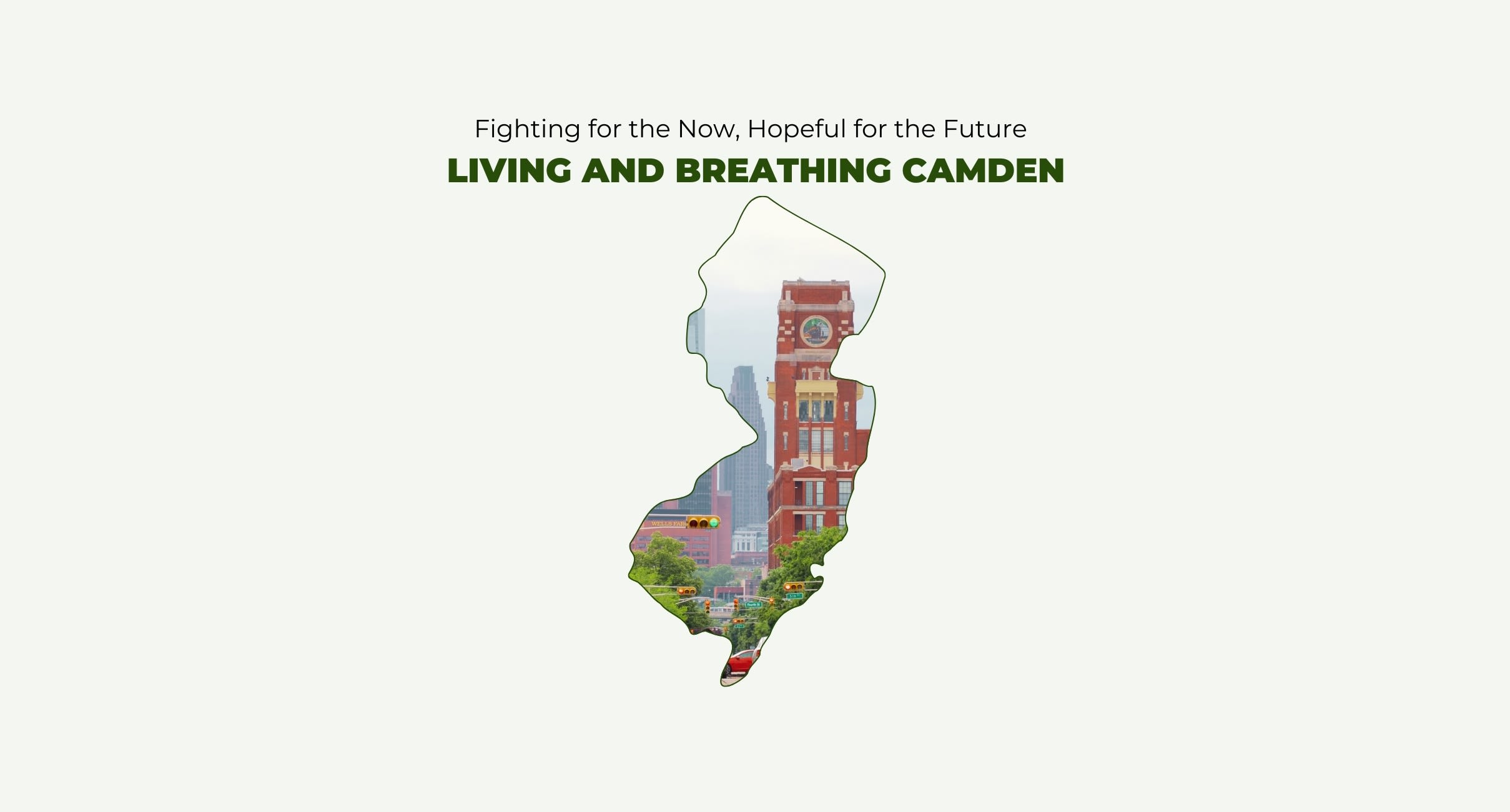
The 2024 Racial Justice Summit
The 2024 Racial Justice Summit: Fighting for the Now, Hopeful for the Future: Living and Breathing Camden was held on Friday, September 20, at Rutgers University-Camden.
This signature annual initiative, founded by the Office for Undergraduate Intellectual Life and Fellows in Racial Justice Learning Community, is the only tri-campus student-led event to explore the future of racial justice on all three Rutgers campuses, encourage personal and intellectual growth, and help bolster nuanced conversations about community, activism, and responsibility.
This year's theme focused on the intersections of housing and environmental justice in Camden, NJ, and featured Arielle V. King, the Assistant Director of the Racial Justice Center at the New York Civil Liberties Union, as the keynote. She shared her perspectives on how to inspire a sense of climate optimism while addressing deep-seated environmental injustices.
Keynote speaker Arielle V. King. Photo by Benjamin Horner.
Keynote speaker Arielle V. King. Photo by Benjamin Horner.
The summit also convened thought leaders and community advocates from the Camden and South Jersey area for a critical panel on "Shelter and Sustainability: Bridging the Gap Between Housing and Environmental Justice in Camden and Beyond." The day concluded with the presentation of this year's social action projects by the incumbent 2024 Racial Justice Fellows (RAJU) cohort during the "Community Changemakers" panel.
Office of Undergraduate Intellectual Life Program Coordinator, Grace Asare, an Honors College senior majoring in political science, with the members of the panel, “Shelter and Sustainability: Bridging the Gap Between Housing and Environmental Justice in Camden and Beyond,” which she moderated. Photo by Benjamin Horner.
Office of Undergraduate Intellectual Life Program Coordinator, Grace Asare, an Honors College senior majoring in political science, with the members of the panel, “Shelter and Sustainability: Bridging the Gap Between Housing and Environmental Justice in Camden and Beyond,” which she moderated. Photo by Benjamin Horner.
The 2023-2024 Racial Justice Fellows present their Social Action Projects during the 2024 Racial Justice Summit. Photo by Benjamin Horner
The 2023-2024 Racial Justice Fellows present their Social Action Projects during the 2024 Racial Justice Summit. Photo by Benjamin Horner
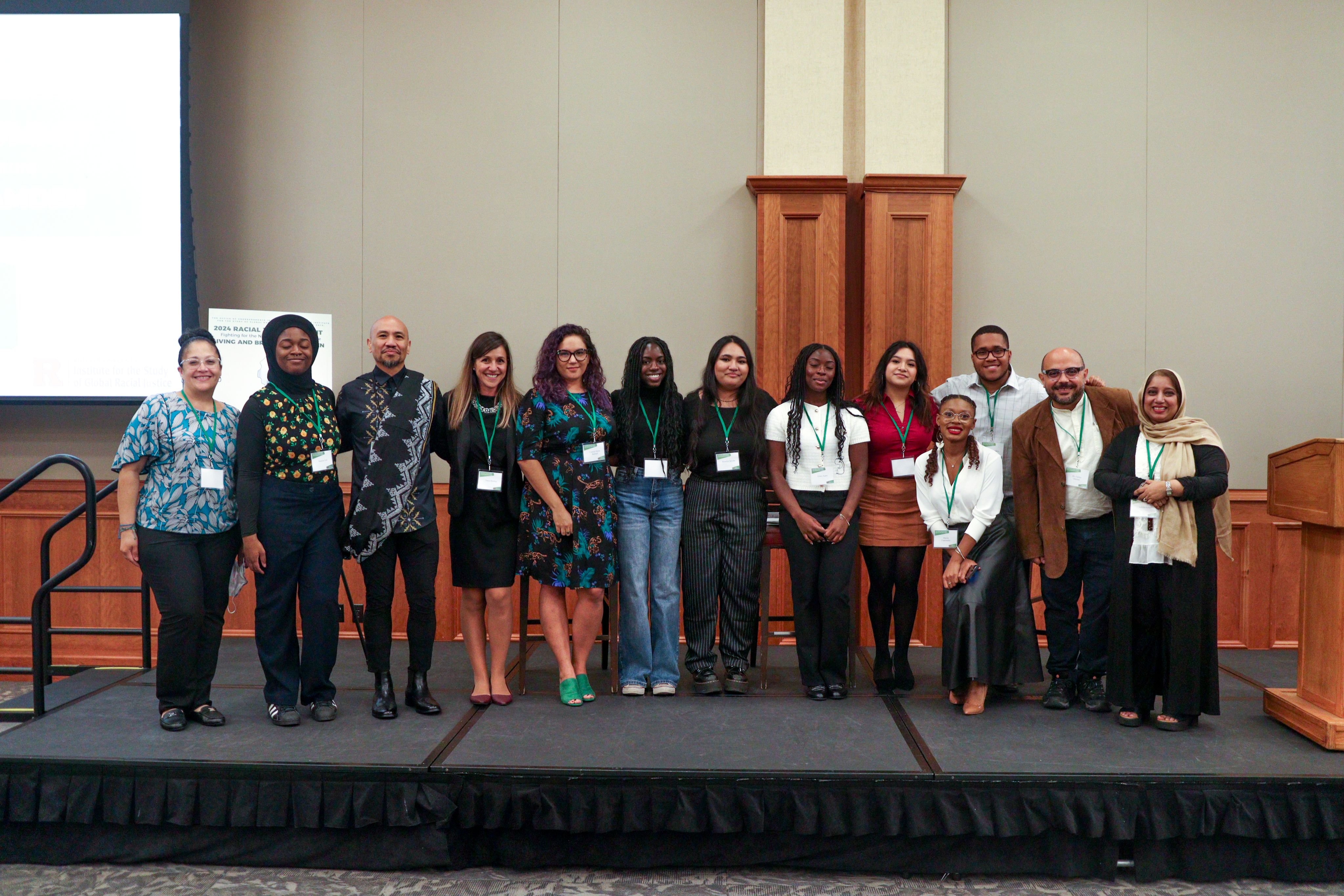
The Quilting Water Undergraduate Prize
Our second undergraduate initiative in 2023-2024 was sponsored by OUIL and the ISGRJ team directing The Quilting Water Public Arts Project, led by Camden Faculty Director Patrick Rosal. Launched in 2022, The Quilting Water Undergraduate Prize brings together a vibrant community of student artists and scholars to think and collaborate at the intersection of ecological and racial justice.
This year's selected winners each received a $1,000 award and access to programming, networking, and mentorship by renowned artist LaTasha Diggs.
The 2024 Quilting Water Undergraduate Prize Winners. Pictured: (Top L to R) Hagar Ezzo (Rutgers-Camden), Ryan Rivera (Rutgers-Camden) and Papa Mbahwe (Rutgers-NB). (Bottom L to R) Sophia Wyllie (Rutgers-NB), Cass Guinto (Rutgers-Newark), and Salma Abedullah (Rutgers-Newark)
The 2024 Quilting Water Undergraduate Prize Winners. Pictured: (Top L to R) Hagar Ezzo (Rutgers-Camden), Ryan Rivera (Rutgers-Camden) and Papa Mbahwe (Rutgers-NB). (Bottom L to R) Sophia Wyllie (Rutgers-NB), Cass Guinto (Rutgers-Newark), and Salma Abedullah (Rutgers-Newark)
Guided by their individual relationships with water, the student-artists wrote a series of connecting poems in various styles, producing a poetry, sound, and photography collection with voiceovers and original backing tracks composed by Papa Mbahwe (Rutgers-New Brunswick) and photography by Ryan Rivera (Rutgers-Camden). To experience their final project, click on the link below:

2023-2024 Signature Events: a Highlight
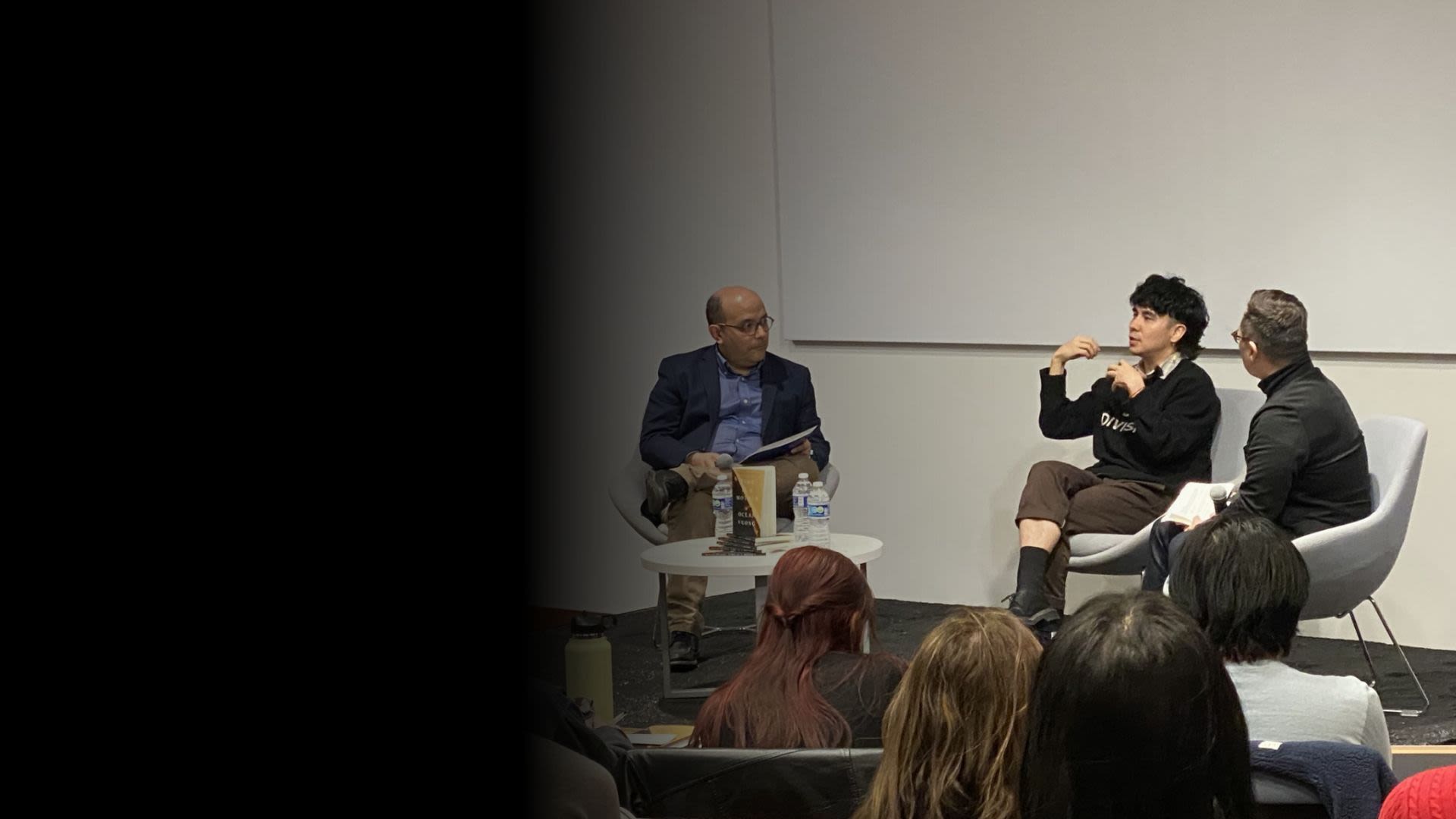
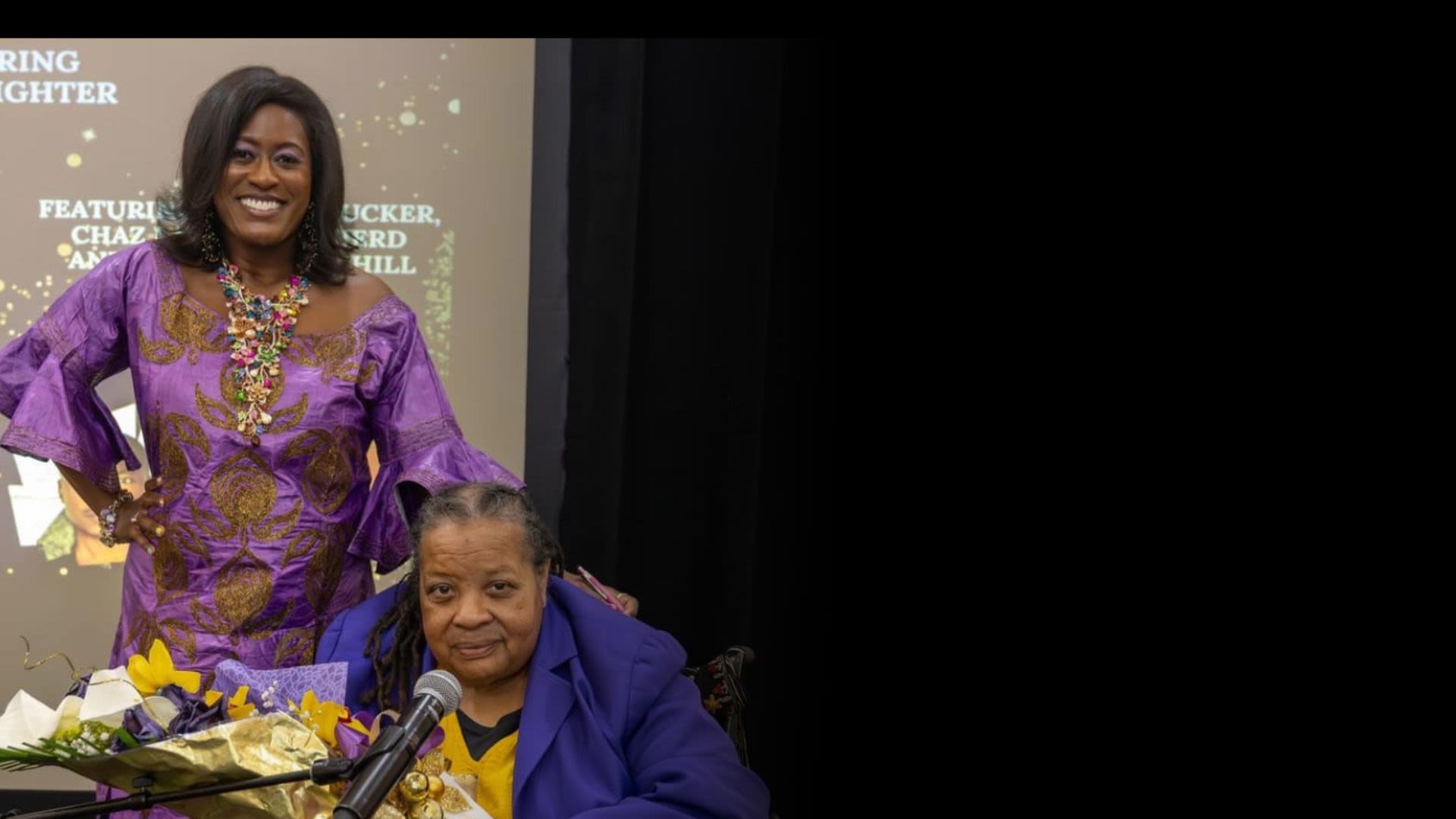
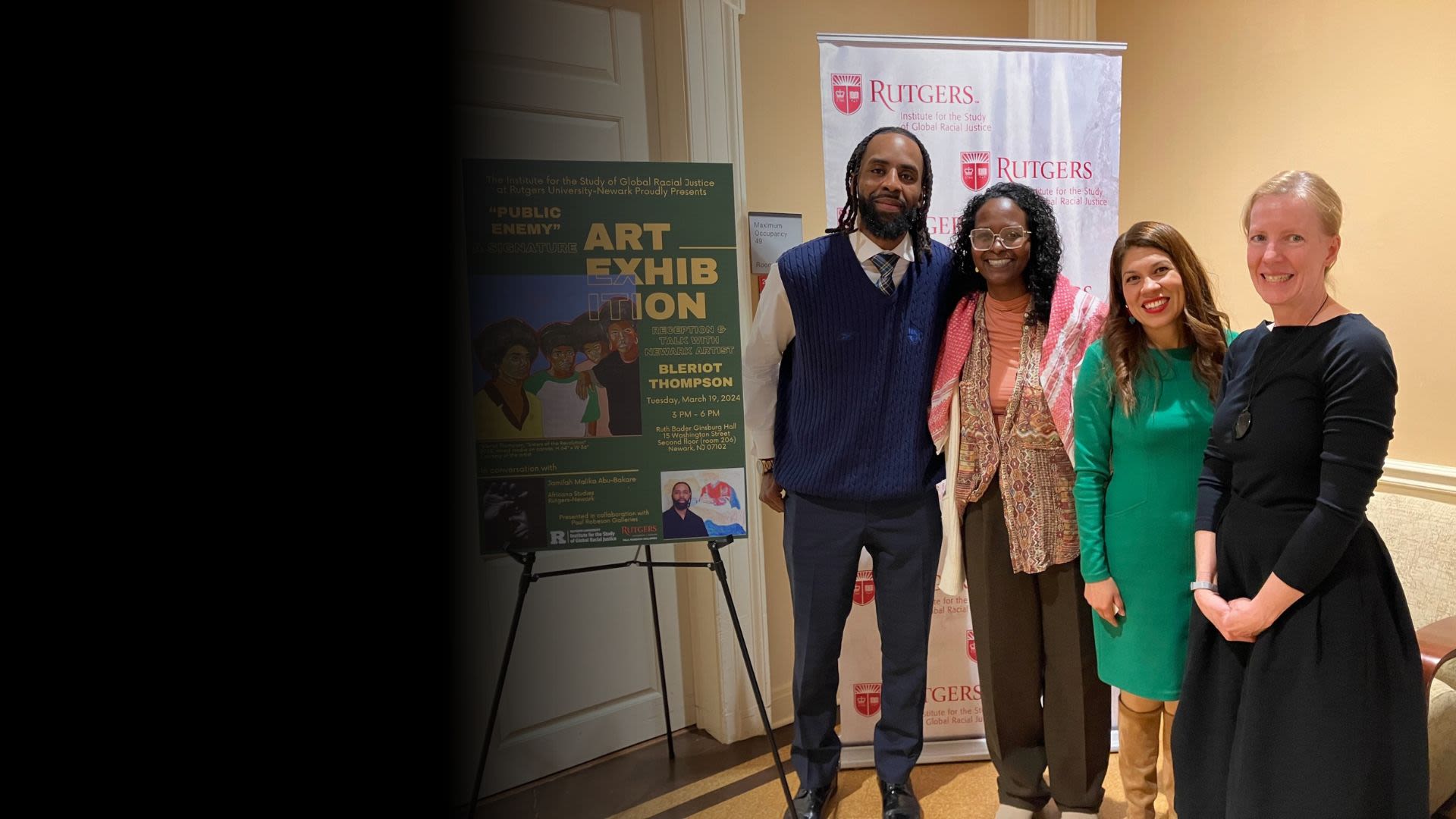
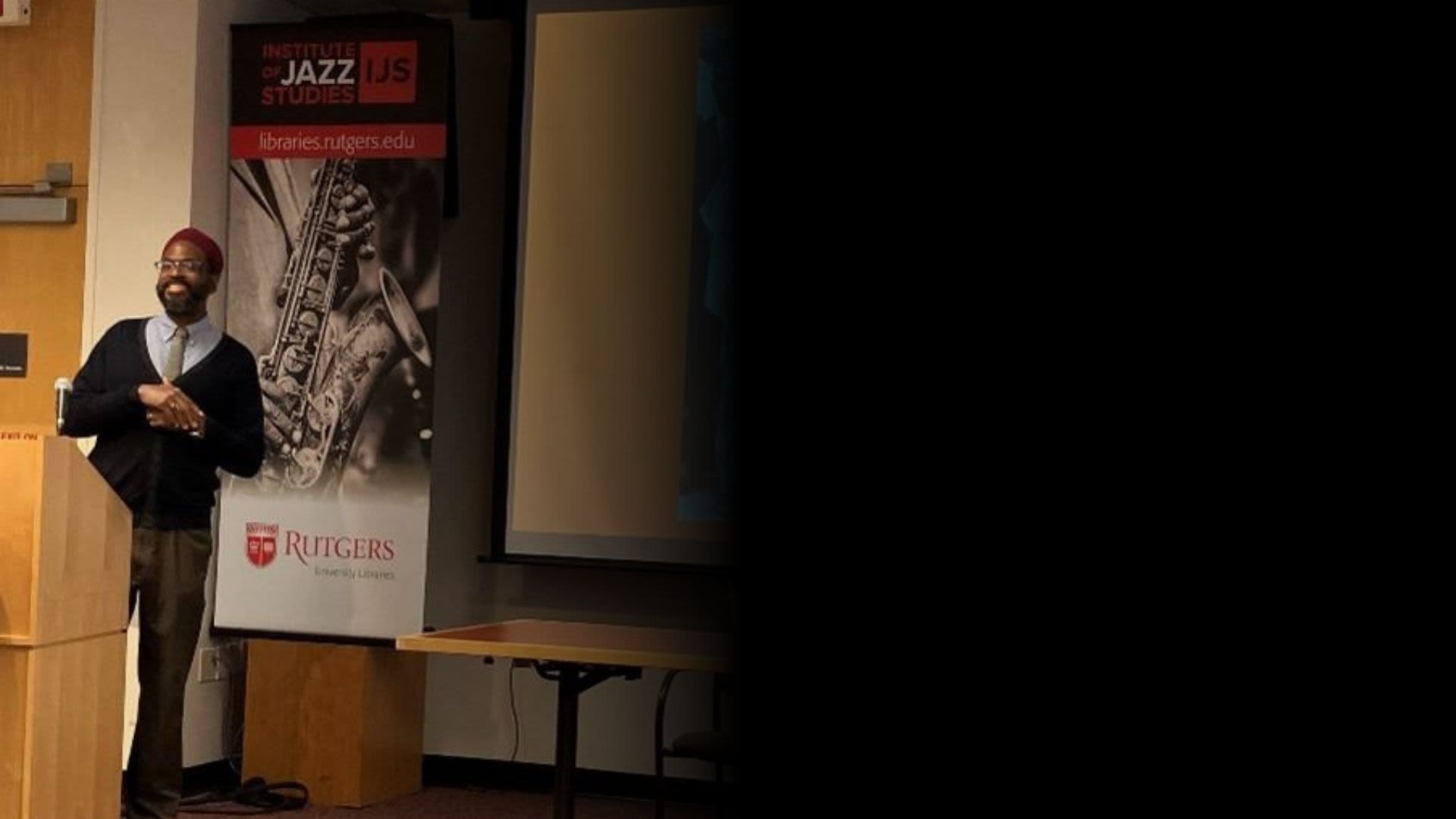
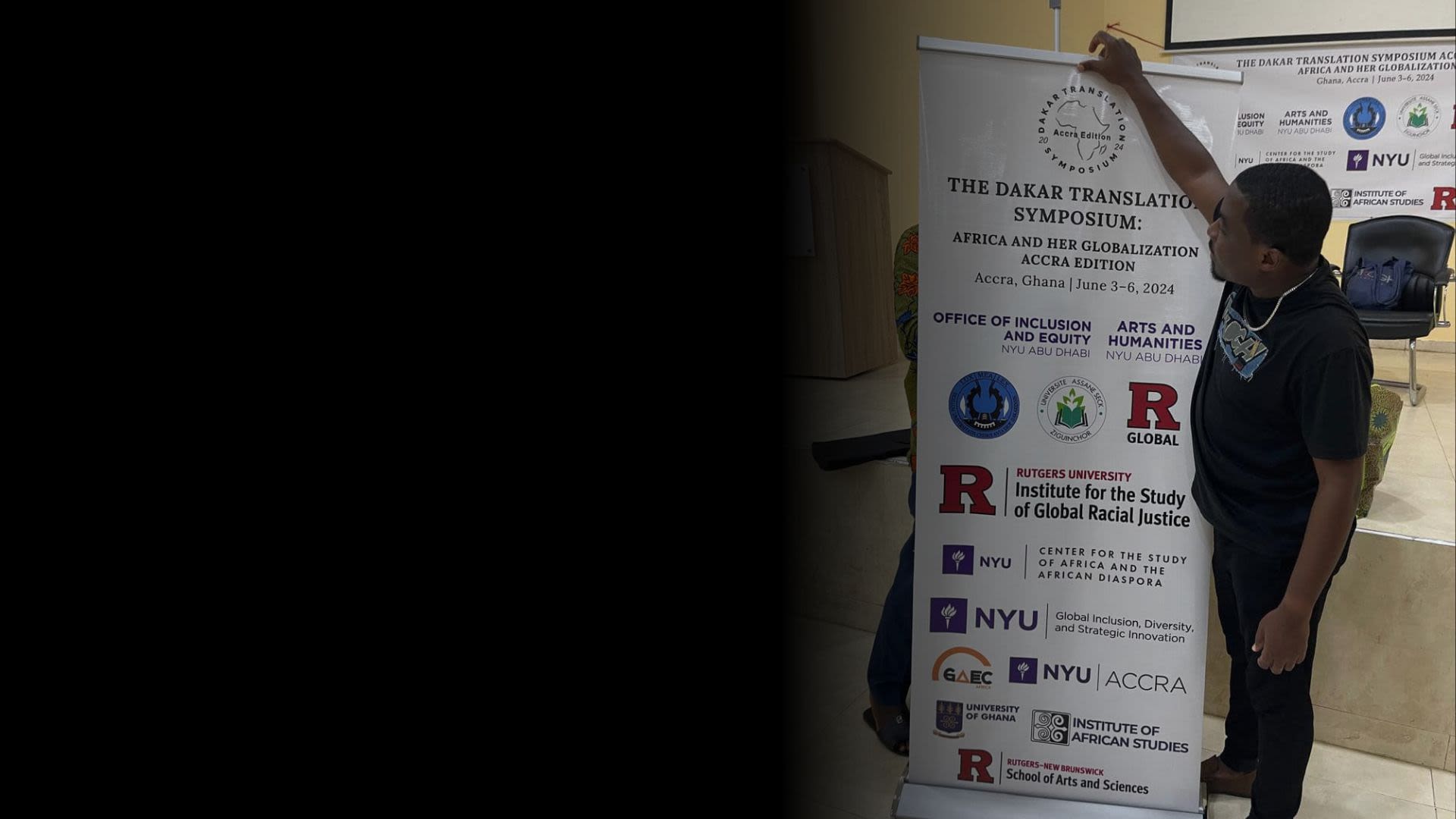
Vulnerable Beauty: A Signature On the Soundstage Event featuring Ocean Vuong
This February, we had the honor of hosting New York Times bestselling author and acclaimed poet and essayist Ocean Vuong for our signature on the soundstage Institute event at Alexander Library on the Rutgers—New Brunswick campus.
Ocean Vuong, photo by Tom Hines
Ocean Vuong, photo by Tom Hines
It was an incredibly captivating and powerful conversation between Ocean Vuong and our co-moderators Carlos Decena, Acting Institute Director, and Cross-Campus Director of Undergraduate Intellectual Life at the ISGRJ, and Professor of Latino and Caribbean Studies and Women’s, Gender, and Sexuality Studies at Rutgers University–New Brunswick, and Dr. Allan Punzalan Isaac, Professor of American Studies and English and Associate Humanities Dean at Rutgers University-New Brunswick.
Vuong read from his latest New York Times bestselling poetry collection, Time is a Mother (Penguin Press 2022), nominated for Best Poetry in 2022 by Publishers Weekly and a finalist for the Griffin prize, and shared his extraordinary background. Born in Saigon, Vietnam and raised in Hartford, Connecticut in a working class family of nail salon and factory laborers, he was educated at nearby Manchester Community College before transferring to Pace University to study International Marketing. Without completing his first term, he dropped out of Business school and enrolled at Brooklyn College, where he graduated with a BA in Nineteenth Century American Literature. He subsequently received his MFA in Poetry from NYU, and went on to become a recipient of a 2019 MacArthur "Genius" Grant.
Vulnerable Beauty: A Signature On-The-Soundstage Event Featuring Ocean Vuong on February 29, 2024 at Rutgers New-Brunswick
Vulnerable Beauty: A Signature On-The-Soundstage Event Featuring Ocean Vuong on February 29, 2024 at Rutgers New-Brunswick
The Black Women Speakers of Prominence Series: An Evening of Music and Social Justice Honoring Ruby Sales and Musings of Race in America by Lucy Anne Hurston
At the beginning of March, we honored and celebrated legendary civil rights activist Ruby Sales at Rutgers—Newark. Ruby is one of 50 civil rights leaders showcased by the Smithsonian National Museum of African American History and Culture in Washington. At the age of 17, she marched in the Selma to Montgomery marches of 1965. She has worked as a human rights advocate in Washington, D.C., and across the south.
Civil rights activist Ruby Sales delivers remarks during the "Evening of Music and Social Justice" special event honoring her on March 5, 2024
Civil rights activist Ruby Sales delivers remarks during the "Evening of Music and Social Justice" special event honoring her on March 5, 2024
Ruby was greeted by a standing ovation and received special tributes from Newark Mayor Ras Baraka and Senator Cory Booker.
Rutgers Newark Mayor provides opening remarks for the "Evening of Music and Social Justice Honoring Ruby Sales" on March 5, 2024
Rutgers Newark Mayor provides opening remarks for the "Evening of Music and Social Justice Honoring Ruby Sales" on March 5, 2024
The event was hosted by Dr. Melanie R. Hill, Assistant Professor of English Literature, Music, Theology and American Studies at Rutgers University—Newark and featured music performances by American actor and singer-songwriter Chaz Lamar Shepherd and his band, and a spoken word performance by acclaimed poet, activist and artist Ursula Rucker.
American actor and singer-songwriter Chaz Lamar Shepherd and his band perform during the "Evening of Music and Social Justice Honoring Ruby Sales" event on March 5, 2024
American actor and singer-songwriter Chaz Lamar Shepherd and his band perform during the "Evening of Music and Social Justice Honoring Ruby Sales" event on March 5, 2024
Later that month, Named Term Chair Melanie Hill also hosted a special lecture by the niece of legendary author and anthropologist Zora Neale Hurston at Rutgers—Newark.
Professor Lucy Anne Hurston is a social scientist committed to the parallel discipline, "Sociology: the Study of Social Behavior Within and Between Groups." Lucy’s research is deeply connected to questions her aunt raised decades ago focused on race, ethnicity, and culture. Bringing these issues to the forefront in numerous arenas, Lucy explores the social world around her, centering, identifying, describing, and eventually solving social problems in her orbit.
As owner of Hurston Research LLC for over 23 years, Lucy has played a critical role in exploring and disseminating Zora's knowledge through her research. She also continues to advocate for social change and equity in her volunteer work which centers on survival support systems of food and housing.
ISGRJ-Newark Director Mayte Green-Mercado, with Professor Melanie Hill and Lucy Anne Hurston
ISGRJ-Newark Director Mayte Green-Mercado, with Professor Melanie Hill and Lucy Anne Hurston
Professor Lucy Anne Hurston delivers remarks during the "What Would Zora Do? Musings of Race in America" event on March 28, 2024
Professor Lucy Anne Hurston delivers remarks during the "What Would Zora Do? Musings of Race in America" event on March 28, 2024
"Public Enemy:" An Exhibition and Reception featuring Newark Artist Bleriot Thompson
In March, we also hosted the opening reception for our inaugural signature exhibition celebrating the work of Newark-based artist Bleriot Thompson and his series “Public Enemy,” on March 19 at Rutgers-Newark in collaboration with Paul Robeson Galleries, and its Director and Chief Curator Anonda Bell, who helped oversee the art installation and exhibition at the ISGRJ offices at Rutgers-Newark.
Newark Artist Bleriot Thompson. Photo courtesy of the artist
Newark Artist Bleriot Thompson. Photo courtesy of the artist
The opening reception featured Bleriot Thompson in a moving and powerful conversation about the inspiration behind his work and his hopes for its impact with Jamilah Malika Abu-Bakare, Instructor of Professional Practice in the Department of Africana Studies at Rutgers-Newark.
ISGRJ-Newark Campus Director Mayte Green-Mercado delivers opening remarks during the "Public Enemy:" Exhibition and Reception featuring Newark Artist Bleriot Thompson event on March 19, 2024
ISGRJ-Newark Campus Director Mayte Green-Mercado delivers opening remarks during the "Public Enemy:" Exhibition and Reception featuring Newark Artist Bleriot Thompson event on March 19, 2024
Newark Artist Bleriot Thompson in conversation with Jamilah Malika Abu-Bakare during the "Public Enemy:" Exhibition and Reception on March 19, 2024
Newark Artist Bleriot Thompson in conversation with Jamilah Malika Abu-Bakare during the "Public Enemy:" Exhibition and Reception on March 19, 2024
The artwork from Thompson’s “Public Enemy” series will be on display until December 13, 2024, at our Institute Newark office, located on the 2nd floor of Ruth Bader Ginsberg Hall at 15 Washington Street, Newark, NJ 07102 and is free and open to the public. Each piece has a QR code below it which viewers can scan to hear insight from the artist talking about about how he was inspired to create it, what it represents and what he hopes viewers will take away from it.
Watch the full conversation between Bleriot Thompson and Jamilah Malika Abu-Bakare here:
The Race and Religion Lecture Series
The Race and Religion Series continued under ISGRJ-Newark Campus Director Mayte Mercado-Green this year. The series seeks to center conversations about the intersections of race and religion, and the racialization of religion, from historical and contemporary perspectives, in the U.S. and globally.
The spring 2024 series focused on Islam in Africa. One of the consequences of the Trans-Atlantic slave trade was that West African Muslims preceded much of the rest of the Muslim world in their confrontation with imperial power, market economies, and the moral questions they engendered. Later European colonization and the subsequent process of decolonization, and the tensions between discriminating hierarchies of race and the moral commitments of religion, conditioned conflicting ways of imagining community and group membership.
The following lectures and speakers were featured:
- From Newark to Cairo and Black Again: Black Muslims and the Afro-Arab Imaginary with Dr. Rasul Miller. Click below to watch the full lecture by Dr. Miller:
- Global Circuits of Difference with Dr. Mbaye Lo
ISGRJ-Newark Director Mayte Green-Mercado, Dr. Mbaye Lo, and Wendell Marsh, Assistant Professor of Africana Studies at Rutgers University-Newark and ISGRJ Early Career Faculty Fellow
ISGRJ-Newark Director Mayte Green-Mercado, Dr. Mbaye Lo, and Wendell Marsh, Assistant Professor of Africana Studies at Rutgers University-Newark and ISGRJ Early Career Faculty Fellow
- And Global Circuits of Difference with Dr. Madina Thiam. Click below to watch the full lecture by Dr. Thiam:
The 2024 Dakar Translation Symposium: Africa and Her Globalization — Accra Edition
The second edition of the Dakar Translation Symposium: Africa and Her Globalization (DTS) - Accra Edition was held from June 3-6, 2024 at the University of Ghana, Accra. The symposium brought together people invested in Africa and her Diasporas to engage questions of language, history, archive, translation, culture, and diaspora that shape the discourses surrounding Africa and Her Globalization across intellectual fields and disciplines.
This second edition explored some of the most urgent issues in the fields of social sciences and humanities including literature, history, sociology, gender, anthropology, economy, and law, among others. The working languages for DTS 2024 were: Arabic, English, French, Portuguese, Twi, and Wolof.
Partner institutions co-sponsoring the symposium included the Office of Inclusion and Equity at NYU Abu Dhabi, the Arts and Humanities Division at NYU Abu Dhabi, Cheikh Anta Diop University of Dakar, the Institute for the Study of Global Racial Justice at Rutgers University, Rutgers Global, the Department of French at Rutgers University-New Brunswick, the Center for the Study of Africa and the African Diaspora at NYU Washington Square, the Office of Global Inclusion, Diversity, and Strategic Innovation at NYU, NYU Accra, Assane Seck University in Ziguinchor, Senegal, the J. H. Kwabena Nketia Archives of the Institute of African Studies, and the University of Ghana.
New and Upcoming Signature Programs
ISGRJ-NB
At ISGRJ-New Brunswick, Acting Institute Director Carlos Decena hosted a two-day symposium in October titled "Black Feminist Futures," highlighting the work of three important Black Caribbean feminist thinkers, activists, and artists.
On October 17, ISGRJ-NB hosted a special event featuring Puerto Rican writer Mayra Santos-Febres as part of the “On the Sound Stage” Signature Series.
Santos-Febres was joined in conversation by two exciting interlocutors--Professor Omaris Zamora (LCS/Africana Studies) and Professor Carlos Vazquez-Cruz (Kalamazoo College)—in a dialogue about her trajectory as a novelist, essayist, and activist.
Mayra Santos-Febres in conversation with Carlos Vazquez-Cruz and ISGRJ-NB Director Carlos Decena during the "Black Feminist Futures" signature event on October 17 at Rutgers-New Brunswick
Mayra Santos-Febres in conversation with Carlos Vazquez-Cruz and ISGRJ-NB Director Carlos Decena during the "Black Feminist Futures" signature event on October 17 at Rutgers-New Brunswick
Carlos Vazquez-Cruz with Mayra Santos-Febres and ISGRJ-NB Director Carlos Decena during the "Black Feminist Futures" signature event on October 17 at Rutgers-New Brunswick
Carlos Vazquez-Cruz with Mayra Santos-Febres and ISGRJ-NB Director Carlos Decena during the "Black Feminist Futures" signature event on October 17 at Rutgers-New Brunswick
Then, on October 18th, Professor Santos-Febres joined Professor Yuderkys Espinosa Miñoso (Dominican Republic) and Professor Ochy Curiel (Dominican Republic) for a special panel on Black Caribbean Transnational Feminisms.
A group reading and meet-and-greet lunch preceded the panel, during which graduate students and faculty members across all campuses were invited to meet with the panelists and participate.
ISGRJ-Newark
This fall, ISGRK-NWK Director Mayte Green-Mercado, is excited to launch Genealogies of Race, a new interdisciplinary Humanities podcast series that seeks to center and amplify the work of pioneering scholars who engage in the study of race and processes of race-making in the premodern period broadly conceived, from antiquity to the eighteenth century.
The Genealogies of Race podcast starts from the premise that race is not a discrete modern phenomenon, and that privileging modernity obscures deeper histories and a multiplicity of perspectives. This long historical perspective sheds light not only on the vocabularies that articulated difference and prejudice, but also on the multiple ways in which racial difference was constructed and supported in the past.
The podcast invites the listeners to think through connections between pre-modern racial formations and our contemporary historical moment, to communicate the relevance of premodern studies to our debates about race and racism in the world today.
The first season will be dedicated to Race and Religion, and the pilot episode will be recorded this fall and will feature Prof. Samantha Kelly, who will be speaking about her recent book Translating Faith. Ethiopian Pilgrims in Renaissance Rome (Havard University Press, 2024).
Samantha Kelly, Professor of History; and Associate Department Chair, Rutgers New-Brunswick
Samantha Kelly, Professor of History; and Associate Department Chair, Rutgers New-Brunswick
Genealogies of Race Season One Preview: Race and Religion in the Pre-Modern World
Genealogies of Race Season One Preview: Race and Religion in the Pre-Modern World
Genealogies of Race Team: ISGRJ-NWK Director Mayte Geen-Mercado and Professor Susan Mokhberi
Genealogies of Race Team: ISGRJ-NWK Director Mayte Geen-Mercado and Professor Susan Mokhberi
ISGRJ-Camden
ISGRJ-Camden Director Pat Rosal is cosponsoring two In Conversation Series speaker events in collaboration with the Rutgers-Camden Writers House this fall.
The first welcomed writer Dilruba Ahmed for a reading and Q&A on September 23. Dilruba (Ruba) Ahmed is the author of Bring Now the Angels (Pitt Poetry Series), with poems featured in New York Times Magazine, The Slowdown, and Poetry Unbound with Pádraig Ó Tuama. Her debut book of poetry, Dhaka Dust (Graywolf Press), won the Bakeless Prize
Writer and Poet Dilruba Ahmed
Writer and Poet Dilruba Ahmed
The next event in the series will be held on October 28 and will feature Malik Abduh, a poet, essayist, and short story writer with an MFA in Creative Writing from Rutgers University-Camden.
His work has been featured in various journals & publications, including Southern Indiana Review, Four Way Review, Exit 7, Platform Review, Some Call it Ballin’ Magazine, & Aquarius Press. His debut collection, All the Stars Aflame, was published by Get Fresh Books (2022). He is an assistant professor of English at Rowan College at Burlington County.
Additionally, in October and November, Pat Rosal and Quilting Water Associate Artist Cherita Harrell are proud to partner with community leaders Ayinde Merrill and Ty Ellis for the Quilting Water: Black/Lenape Story Exchange Project, a powerful and transformative story exchange bringing members of the local African American community and the Lenape of South Jersey. together to narrate and deeply listen to personal stories, fostering empathy and bridging cultural and personal divides.
Community Leaders Ayinde Merrill and Ty “Dancing Wolf” Ellis
Community Leaders Ayinde Merrill and Ty “Dancing Wolf” Ellis
The Sawyer Seminar: Potentialities of Justice: Toward Collective Reparative Futures
This seminar, led by ISGRJ-Newark Campus Director Mayte Green-Mercado and co-organized by Lauren Shallish (Urban Education), sponsored by the Mellon Foundation and hosted at Rutgers-Newark this fall and in the spring of 2025, will explore themes of social justice centering on four critical areas of inquiry: systemic racism, environmental crisis and climate change, disability, human displacement and post-conflict resolution, to illuminate common histories and methodological frameworks that can inform generative responses to past and present social harms. Each area of focus reflects not only the scholarly interests of our faculty, but also the institutional commitments of Rutgers University- Newark as an anchor institution devoting its resources to serve our community.
Seminar 1: Liberating Disability: The Stories of Our Past, Present, and Future (October 23-24, 2024)
Seminar 2: Aftermaths of War: Narrating the Past and Repairing the Future (November 12-13, 2024)
Seminar 3: (Re) Considering Reparations (February 5-6, 2025)
Seminar 4: Reparative and Restorative Paradigms in Environmental Justice: Politics for the Future in the Anthropocene (April 22-23, 2025)
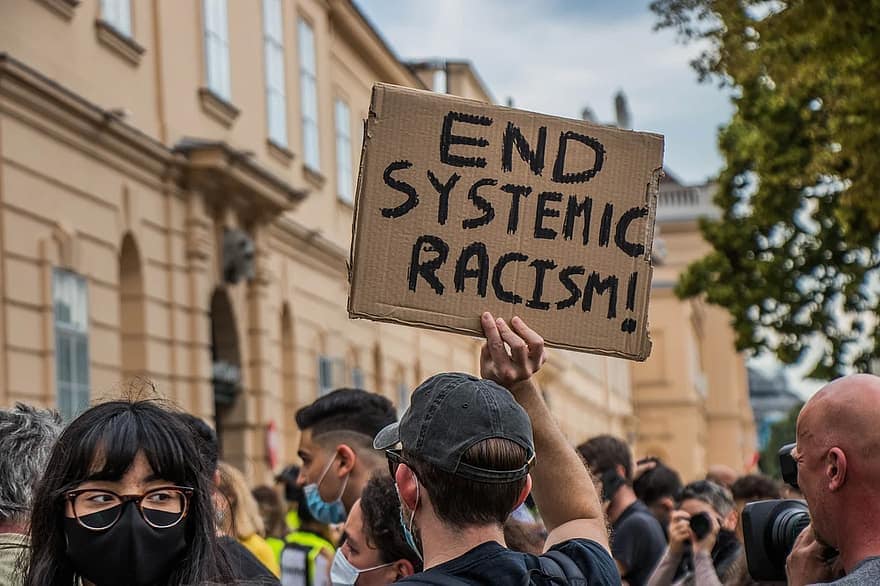
Championing Health Equity and Communicating Rutgers’ Research on Race: Two Proud Moments
I was humbled to be honored by the Rutgers Global Health Institute and its Director, Richard Marlink, who selected me as one of the recipients of their Champion in Global Health Award for 2024.
The Champion in Global Health is awarded to faculty, staff, and/or volunteers who have made a significant difference in addressing health inequity here in New Jersey and around the world. I have to thank all of the faculty researchers, steering committee members and ISGRJ team members who helped to make the Black Bodies, Black Health interdisciplinary research project a success. This award is possible because of their brilliant work, and the leadership of my co-PI and partner, Senior Vice President for Equity, Anna (Enobong) Branch.
I thank RGHI and congratulate the other awardees, John Damonti (President of the Bristol Myers Squibb Foundation) and Brent Ruben (Founder and Senior University Fellow of the Center for Organizational Leadership).
It may seem obvious how an institute that focuses on health and an institute that focuses on race from a humanistic perspective would have aligned missions. But, when you try to put them together, it is challenging and not as easy as it sounds to think about how we might collaborate.
Being invited to be a part of the RGHI community so early on was really instrumental in helping to make visible the different kinds of conversations that are possible between our communities of researchers, many of whom overlap. I could not have thought about that partnership without the guidance of Ric Marlink, and I'm proud to say that with the help of the Rutgers Global Health Institute, we have created some of those networks over the course of the last few years.
The challenge of creating a multi-campus university-wide entity that is a gathering space for different kinds of scholars became possible through the mentorship and inspiring leadership of Ric's model at RGHI. My personal thanks to Ric for his guidance in helping bolster my own efforts to create something similar within the Institute for the Study of Global Racal Justice. I am truly honored to accept this award.
Watch the video of the Champion in Global Health Award presentation during the RGHI virtual membership meeting on October 10, 2024.
Watch the video of the Champion in Global Health Award presentation during the RGHI virtual membership meeting on October 10, 2024.
Our commitment to communicating the scholarship of Rutgers researchers on race to communities and audiences both within and beyond the academy was rewarded this past summer of 2024 when we received the news that our publication, Black Bodies, Black Health, won an Award of Distinction at the 30th Annual Communicator Awards. A visual archive chronicling our 18-month research project supported by the Robert Wood Johnson Foundation, the volume received an Award of Distinction in the Educational Institution Print Content category, an award presented to projects that exceed industry standards in quality and achievement, and recognize excellence, effectiveness, and innovation across all areas of communication.
The book was also selected as a winner in the Health Awareness Book, Story, or Feature category in this year's Anthem Awards, the largest and most comprehensive social impact award presented by the Webby Awards.
The 2024 Communicator Award of Distinction in the Educational Institution Print Content Category, presented to Black Bodies, Black Health
The 2024 Communicator Award of Distinction in the Educational Institution Print Content Category, presented to Black Bodies, Black Health
My thanks to all of the members of the Black Bodies, Black Health research team, and our Director of Marketing and Communications, Tania Bentley, for her inspired work on this project, for which she also received an award.
Tania Bentley
Tania Bentley
Thank you, once again, to ALL the Rutgers faculty and scholars who have joined us these past years in taking advantage of this unique opportunity to showcase the brilliant work being performed throughout the Rutgers academic community in advancing research toward global racial justice.
ISGRJ strives to exemplify the university’s commitment to creating platforms and spaces for collaboration across the siloes that inevitably develop within our disciplines, departments, schools, research fields and chancellor-led units. As always, my full appreciation to the ISGRJ team of faculty and staff who continue to give their all in maintaining the large ambitions and high caliber of this project.
ISGRJ Staffing Team (Top L to R): Senior Director of Finance and Administration Jennifer Leon, Assistant Director of Administration Dolores Turchi (Bottom L to R): Director of the Office of Sponsored Research Robin Yarborough, and Director of Marketing and Communication Tania Bentley
ISGRJ Staffing Team (Top L to R): Senior Director of Finance and Administration Jennifer Leon, Assistant Director of Administration Dolores Turchi (Bottom L to R): Director of the Office of Sponsored Research Robin Yarborough, and Director of Marketing and Communication Tania Bentley
As we say farewell to some members of our original team -- Erica Armstrong Dunbar, Gregory Pardlo, Desiree Manning, Mahirym Arroyo, Terri Kupersmit, and Sabiha Ansari, we thank them for their hard work and commitment.
Pictured (Top L to R): Inaugural ISGRJ-NB Campus Director Erica Armstrong Dunbar, Inaugural ISGRJ-Camden Co-Director Gregory Pardlo (Bottom L to R): Program Coordinator Desiree Manning, Senior Administrative Assistant for ISGRJ-Camden Mahirym Arroyo, Senior Administrative Assistant for ISGRJ-Newark Terri Kupersmit and OUIL Program Administrator Sabiha Ansari
Pictured (Top L to R): Inaugural ISGRJ-NB Campus Director Erica Armstrong Dunbar, Inaugural ISGRJ-Camden Co-Director Gregory Pardlo (Bottom L to R): Program Coordinator Desiree Manning, Senior Administrative Assistant for ISGRJ-Camden Mahirym Arroyo, Senior Administrative Assistant for ISGRJ-Newark Terri Kupersmit and OUIL Program Administrator Sabiha Ansari
On behalf of ISGRJ’s current Board of Directors and our staffing team, we look forward to these next two years of continued exciting ISGRJ activity.
Founding and Executive Director, Institute for the Study of Global Racial Justice
